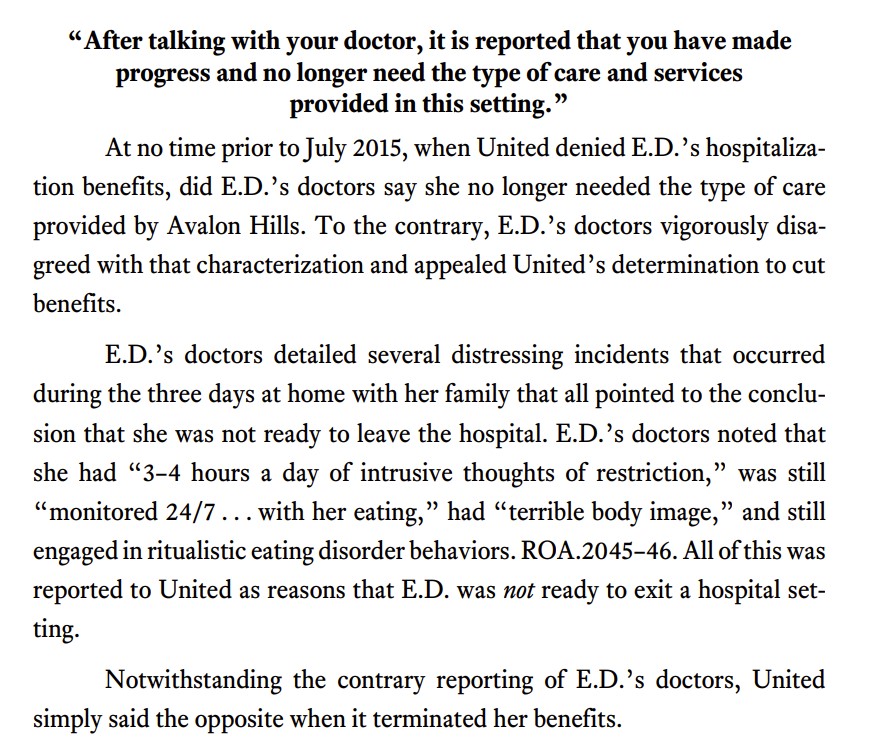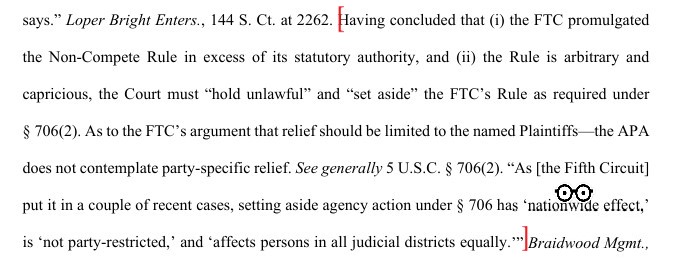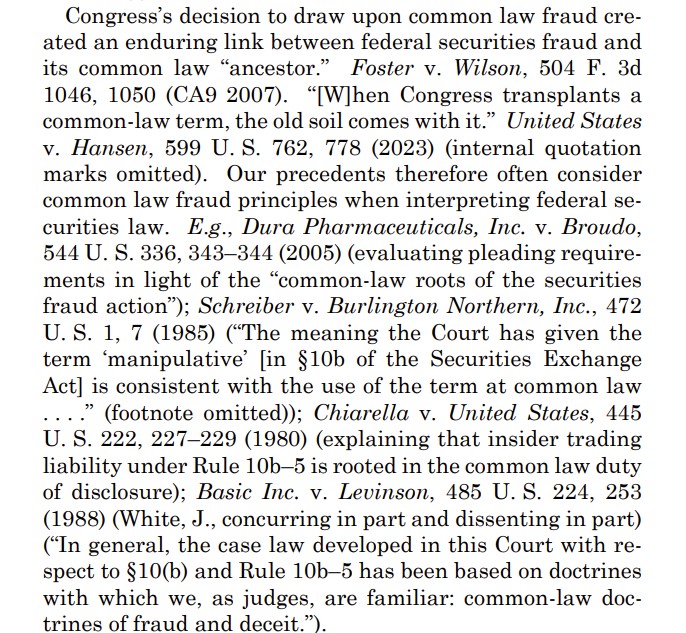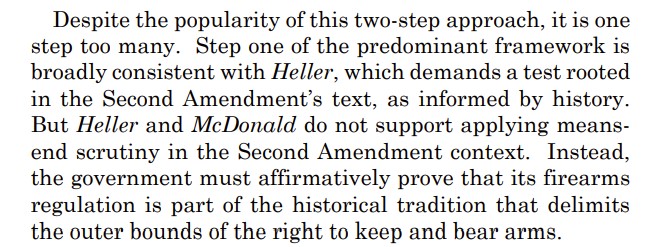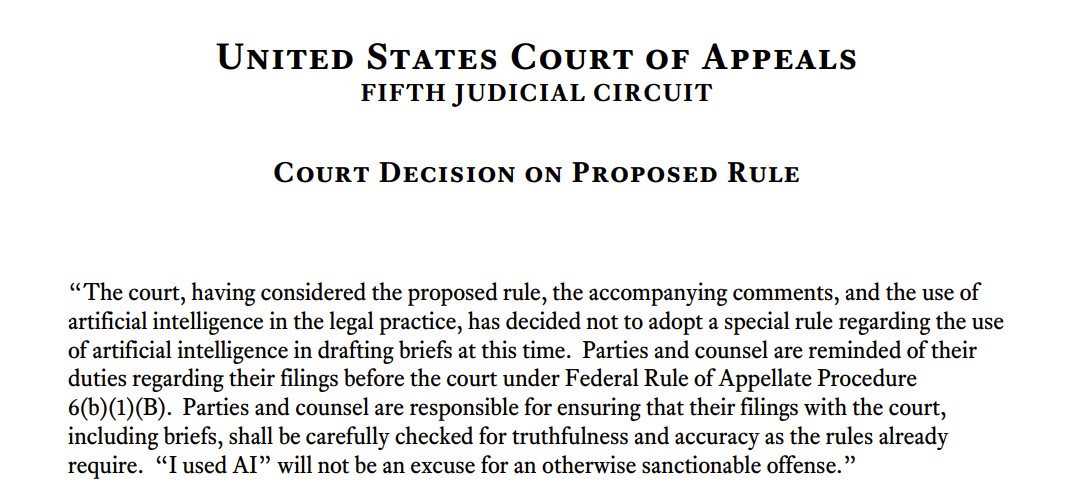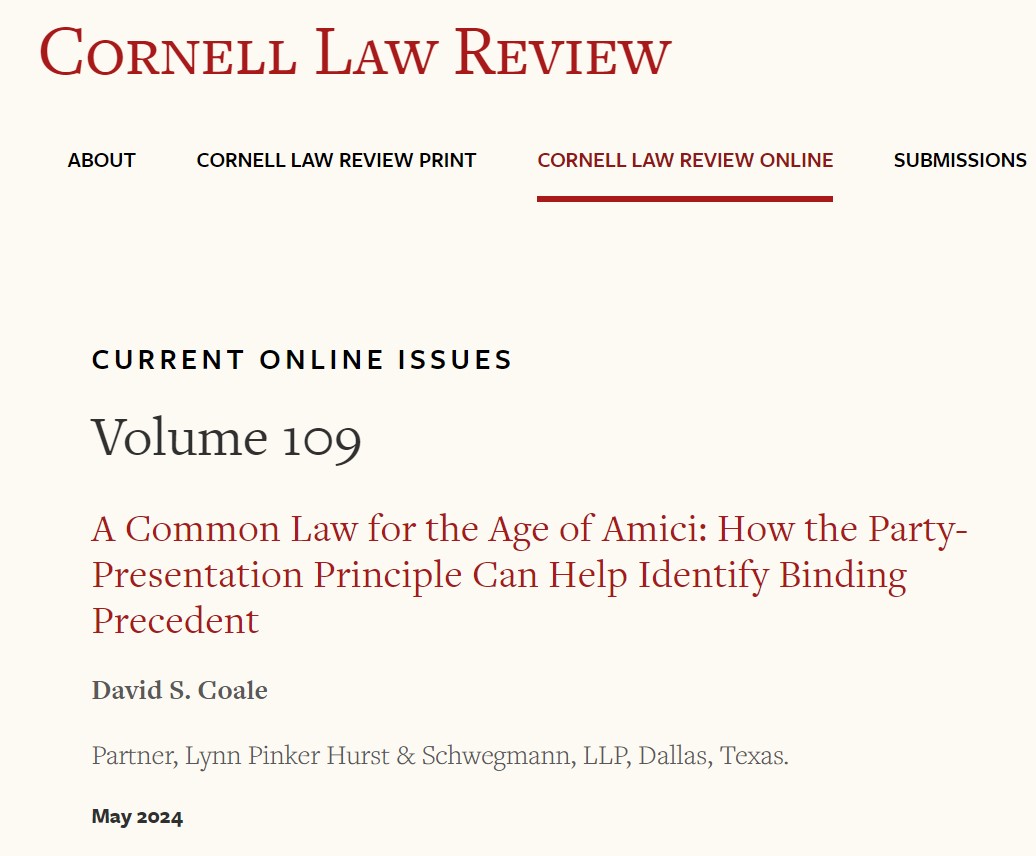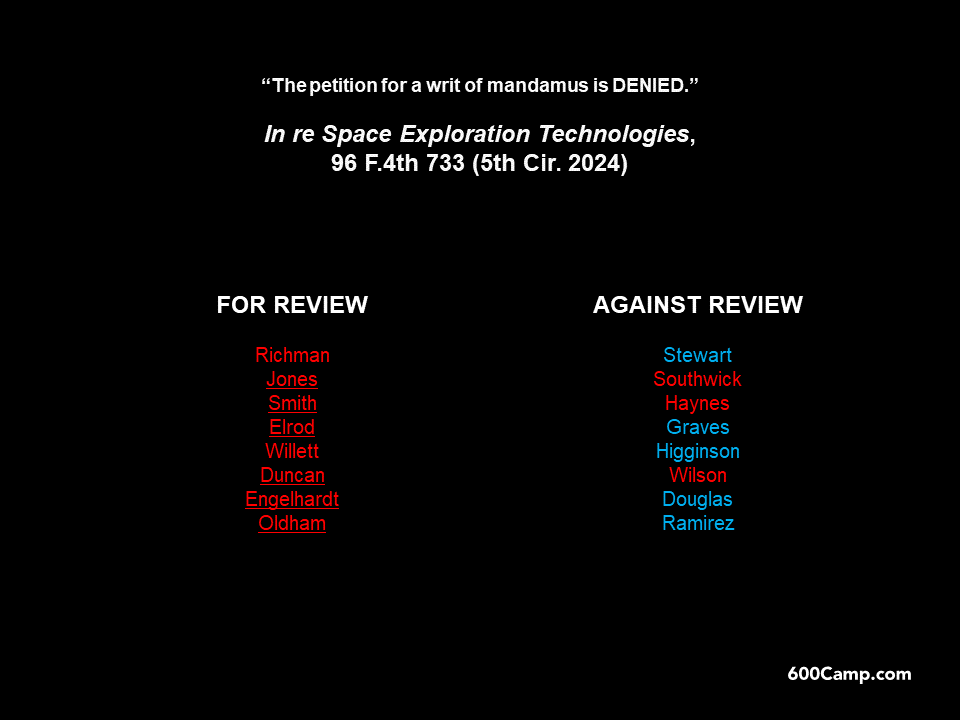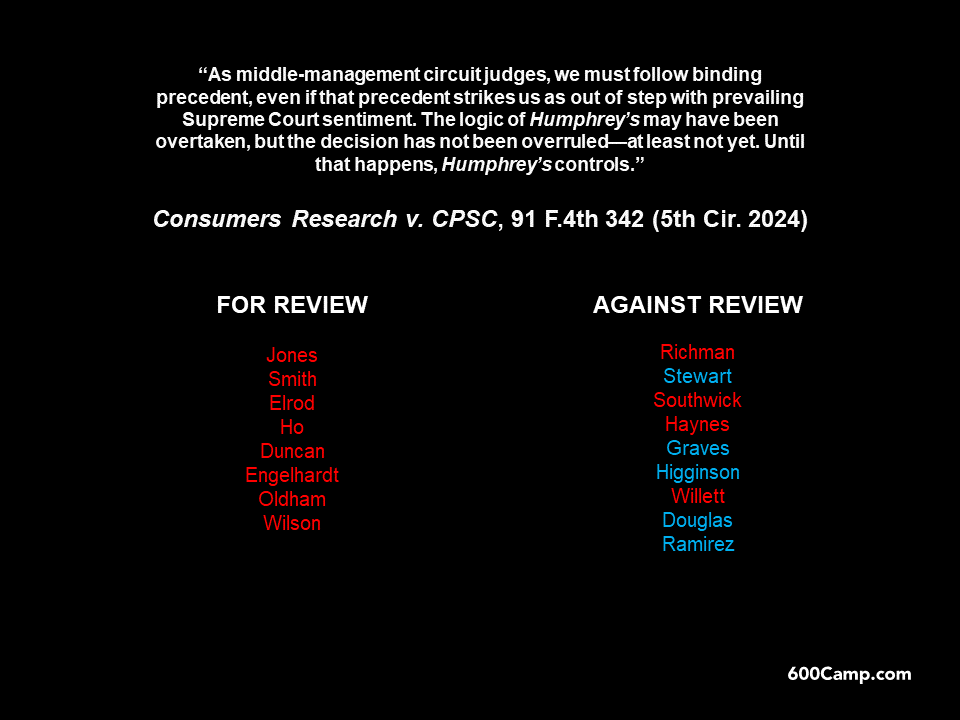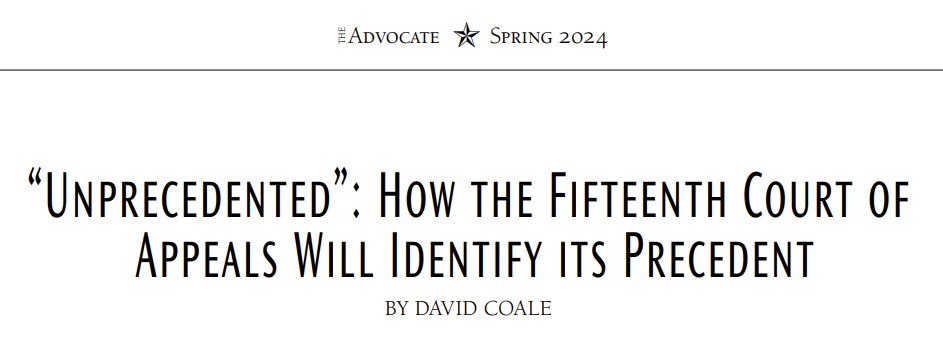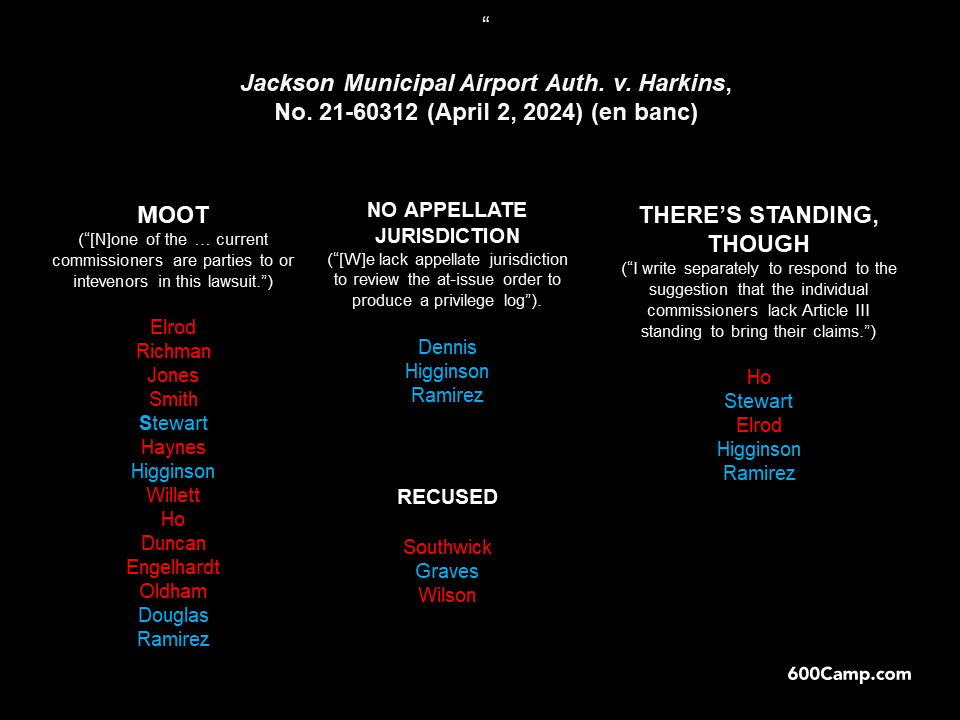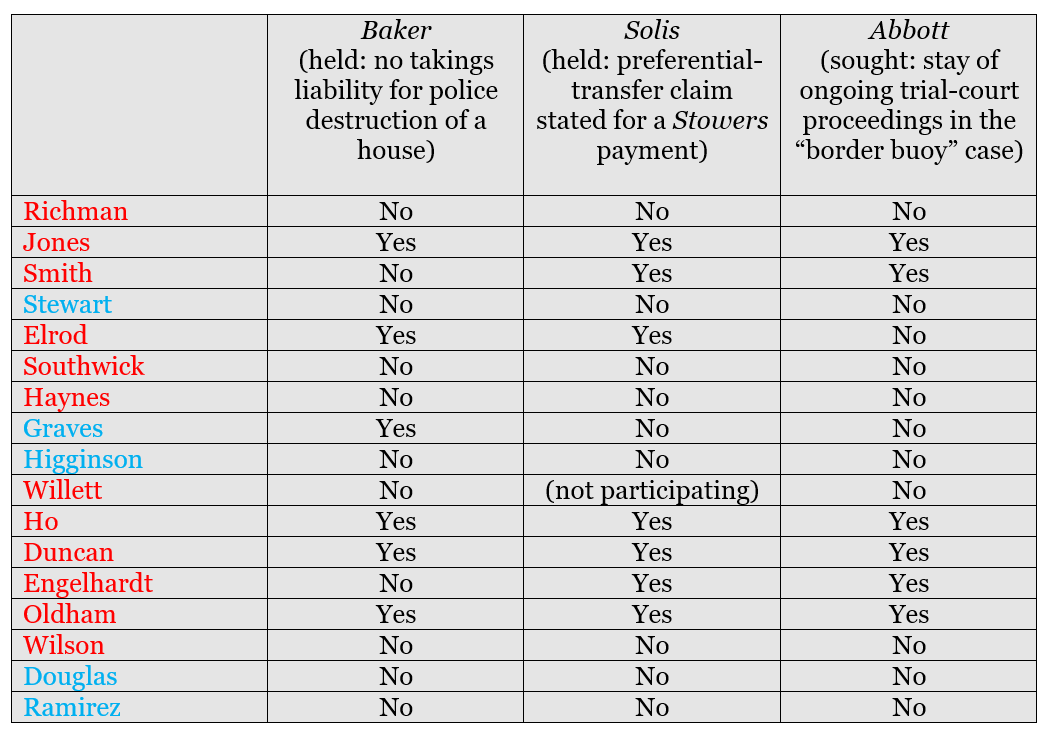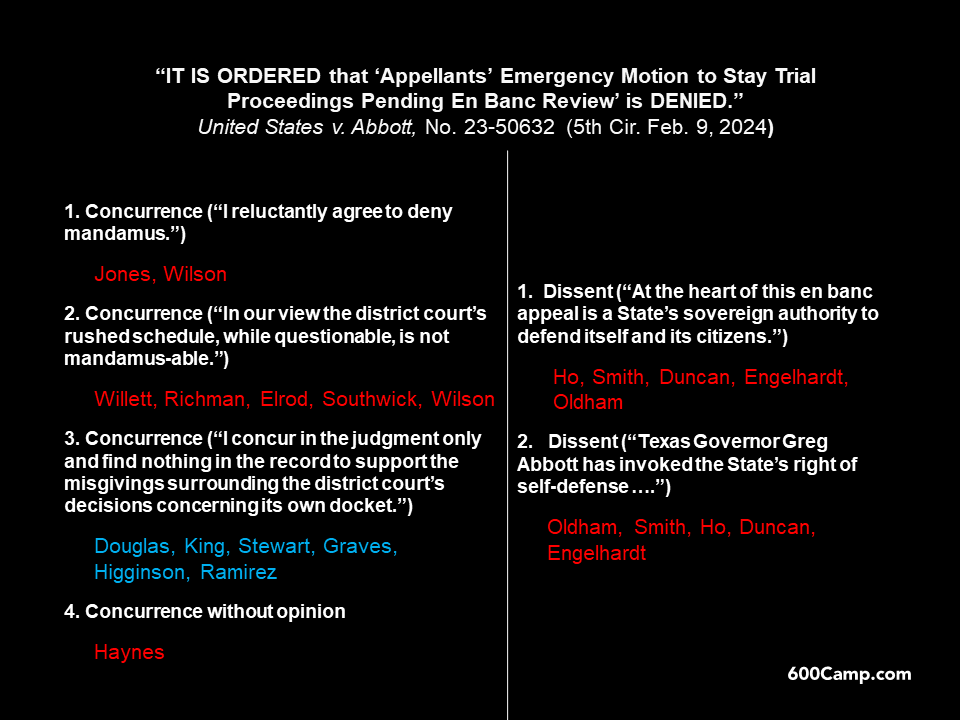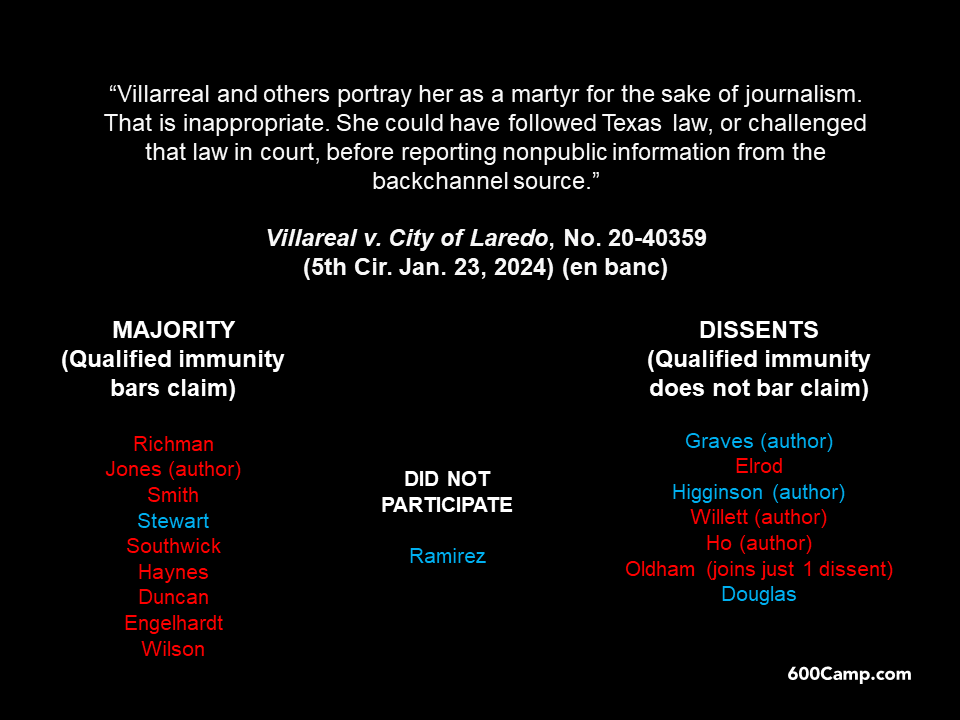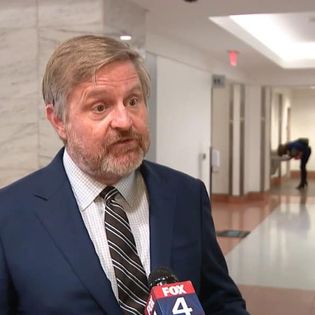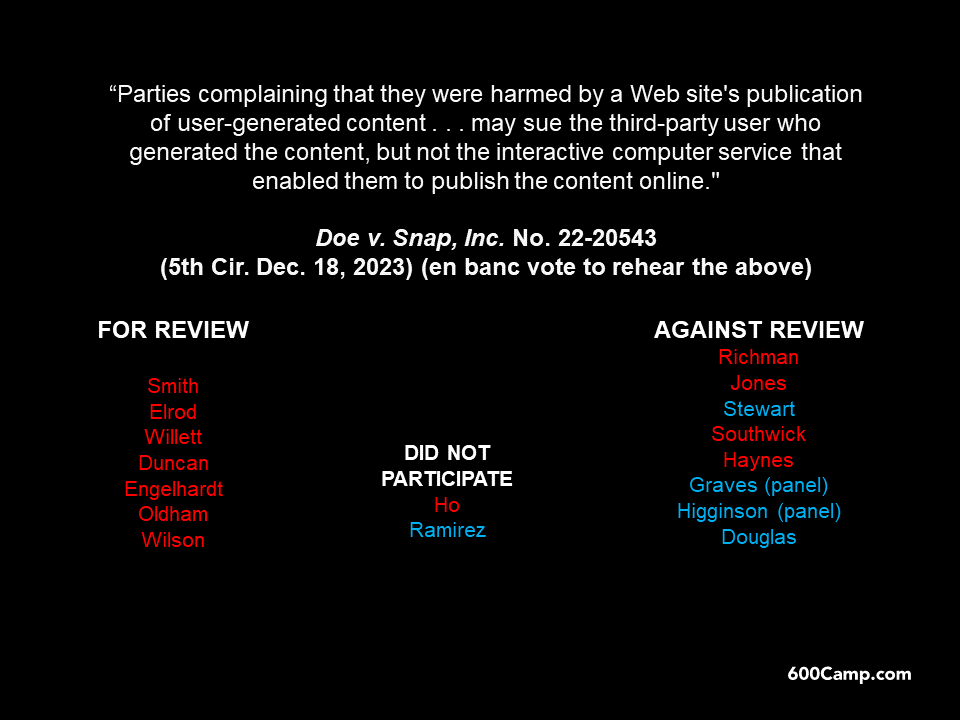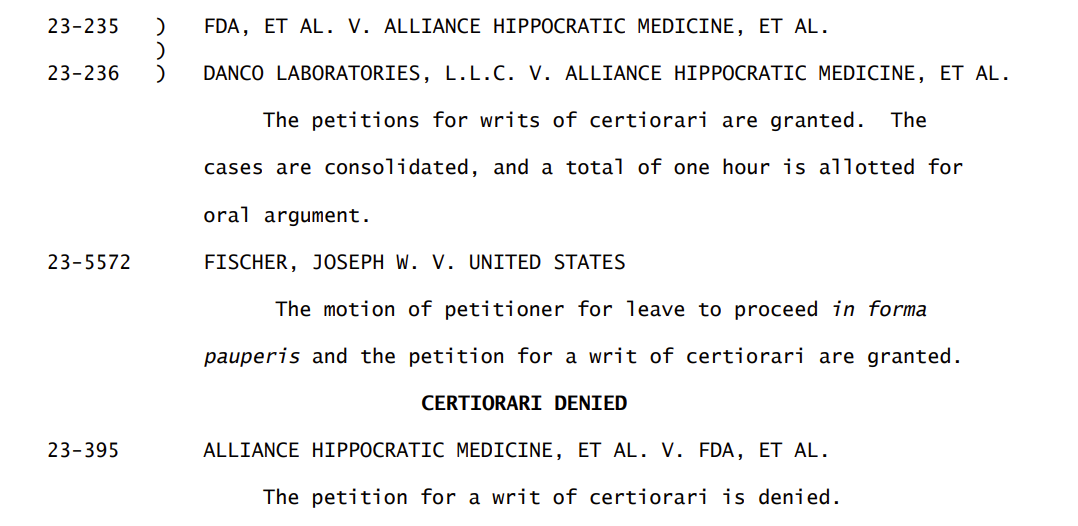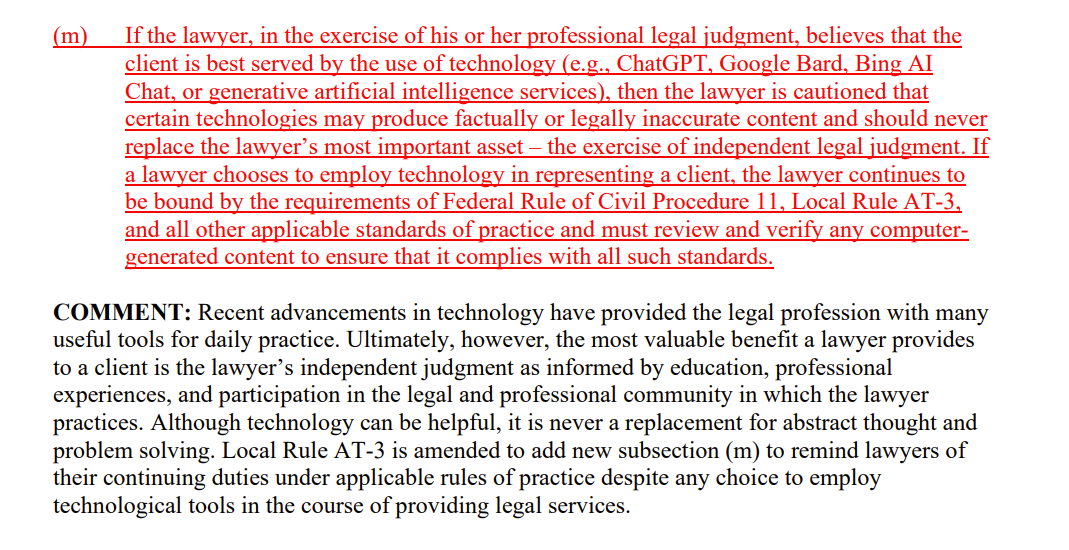Dwyer v. United Healthcare Ins. Co., No. 23-50439 (Sept. 19, 2024), vitalizes the technical and often defense-favoring framework of ERISA benefits litigation, challenging virtually all material points–factual and legal–put forward by a plan adminstrator in its handling of claims relating to a serious anorexia case. On the facts, the opinion proceeded as follows, pointing out numerous inconsistencies between what the administrator contended and what the record, in fact, showed:
Unsurprisingly, given all three judges’ discomfort with the Fifth Circuit precedent that dictated the panel holding in Abraham Watkins v. Festeryga, that case will be considered by the en banc court. The issue, as summarized by the panel majority, is this:
Edward Festeryga, an attorney embroiled in a dispute with his former law firm, wants this case heard in federal court and contends we have appellate jurisdiction over the district court’s remand order because waiver is neither an issue of subject-matter jurisdiction nor a defect in removal procedure under 28 U.S.C. § 1447(c). We agree, but our 40-plus-year-old precedent provides otherwise, holding that a waiver-based remand order is jurisdictional under § 1447(c) and thus unappealable under § 1447(d).
While no longer in the academy, the capable Rory Ryan offered this insightful analysis of this case on X.
 In TIG Ins. Co. v. Woodsboro Farmers Coop., the Fifth Circuit identified fact issues that precluded summary judgment in an insurance-coverage case.
In TIG Ins. Co. v. Woodsboro Farmers Coop., the Fifth Circuit identified fact issues that precluded summary judgment in an insurance-coverage case.
A key is whether damage to certain grain silos was “property damage” under a CGL policy. The diistrict court concluded that damage was due to defective construction. The Fifth Circuit credited the insured’s evidence that wind and weather caused the silos’ metal parts to degrade, bend, and fatigue. This evidence, including testimony from an inspector who saw the damage, supported the insured’s argument that the damage was not merely cosmetic but a “harmful change in appearance, shape, composition, or some other physical dimension to the claimants’ property.”
The Court also noted a fact issue about whether the damage occurred during the policy period, emphasizing that under Texas law, “occurred means when damage occurred, not when discovery occurred,” making it irrelevant that the damage was first observed after the policy period expired. No. 23-40435, Sept. 20, 2024.
In Favre v. Sharpe, a Hall of Fame NFL player contended that another Hall of Fame player defamed him during a TV broadcast. The Fifth Circuit affirmed the dismissal of the defamation claim, reasoning:
Sharpe’s statements–in response to facts widely reported in Mississippi news and specifically in the just-released Mississippi Today article–could not have been reasonably understood as declaring or implying a provable assertion of facts. His statements are better viewed as strongly stated opinions about the widely reported welfare scandal.
No. 23-6010 (Sept. 16, 2024).
 An old adage cautions that “house guests, like fish, begin to smell after too long.” So too with exotic arugments about jury-trial rights, fueled by the Supreme Court’s vindication of such rights in an SEC enforcement action in SEC v. Jarkesy.
An old adage cautions that “house guests, like fish, begin to smell after too long.” So too with exotic arugments about jury-trial rights, fueled by the Supreme Court’s vindication of such rights in an SEC enforcement action in SEC v. Jarkesy.
Specifically, in In re Abbott, Texas sought mandamus relief to compel a jury trial in its dispute with the United States about floating obstacles in the Rio Grande, arguing that the U.S.’s claim was analogous to a common-law claim for ejectment. The Fifth Circuit rejected that argument … because it isn’t:
Even if we did agree that this suit concerns competing claims over the rights to “possess” and “exclude” from the Rio Grande, it is no mere garden-variety dispute about “sticks in the bundle of rights that are commonly characterized as property.” … The only appropriate analogy for a [Rivers and Harbors Act] claim that has been presented by the parties is abatement of a public nuisance or purpesture. As the United States points out, there is a long tradition of equitable suits to clear obstructions upon public highways.
No. 24-50620 (Sept. 20, 2024).
In Keck v. Mix Creative Learning Center, LLC, the Fifth Circuit affirmed summary judgment for art studio that used the plaintiff’s copyrighted artworks (image of dogs) in online art kits for children. The Fifth Circuit found fair use, because the studio’s use of the artwork was transformative and did not harm the market for the plaintiff’s works; as the district court had observed, the studio “drew on Plaintiff’s art not for its inherent expressive value but for what it, accompanied by materials and instruction in art theory and history, could teach students.” No. 23-20188 (Sept. 18, 2024).
 Nat’l Infusion Center Ass’n v. Becerra returns to the issue of standing in administrative law cases–a topic where the Fifth Circuit has had an unfortunate track record before the Supreme Court. The majority holds that the that the National Infusion Center Association has standing to challenge the “Drug Price Negotiation Program” established by the Inflation Reduction Act, noting procedural and economic injury.
Nat’l Infusion Center Ass’n v. Becerra returns to the issue of standing in administrative law cases–a topic where the Fifth Circuit has had an unfortunate track record before the Supreme Court. The majority holds that the that the National Infusion Center Association has standing to challenge the “Drug Price Negotiation Program” established by the Inflation Reduction Act, noting procedural and economic injury.
As to economic injury, the Court held: “NICA has shown that at least one of its members’ drugs will be subject to the Program, that the Program will lower the price for that drug, and that the lower price will lead to lower revenue for the member that administers the drug.” Critical to this holding–and the distinction of recent precedent about probabilistic future injury–was the majority’s conclusion that:
“predicting a profit seeking business’s response to changing economic incentives simply requires determining the direction in which the incentives are changing. Because the third-party decisions in NICA’s theory are guided by basic economic rationality, NICA has ‘thread[ed] the causation needle’ …”
(emphasis added). A dissent emphasized that NICA’s members do not have a concrete interest in profiting from Medicare reimbursements, as the statute does not entitle them to a profit, and that the complaint was filed before HHS announced the drugs selected for negotiation–creating tension iwth the rule that standing must exist at the time suit is filed. No. 24-50180 (Sept. 20, 2024).
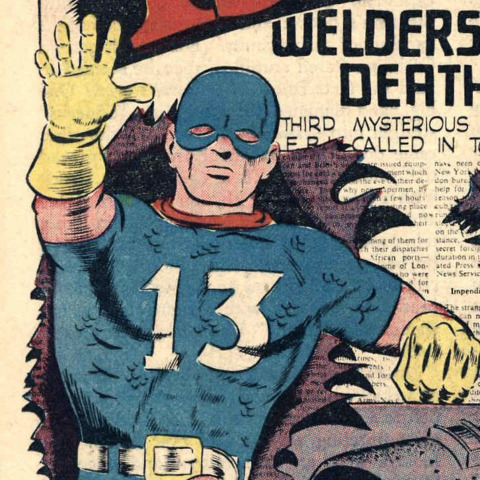 Fittingly for a Friday, 600Camp celebrates its thirteenth anniversary of reasonably faithful reporting, comment, analysis, and meme-making about business-related cases in the U.S. Court of Appeals for the Fifth Circuit. You can celebrate by making some bread pudding with this classic recipe from Galatoiires, the grande dame of New Orleans Creole restaurants.
Fittingly for a Friday, 600Camp celebrates its thirteenth anniversary of reasonably faithful reporting, comment, analysis, and meme-making about business-related cases in the U.S. Court of Appeals for the Fifth Circuit. You can celebrate by making some bread pudding with this classic recipe from Galatoiires, the grande dame of New Orleans Creole restaurants.
 Occidental Petroleum Corp. v. Wells Fargo Bank, N.A. presents an Erie case, governed by Texas substantive law, as to whether the parties formed a contract. No. 23-20318 (Sept. 18, 2024).
Occidental Petroleum Corp. v. Wells Fargo Bank, N.A. presents an Erie case, governed by Texas substantive law, as to whether the parties formed a contract. No. 23-20318 (Sept. 18, 2024).
The Fifth Circuit held that Wells Fargo was judicially estopped from arguing that a contract was not formed. Under its precedent: “Judicial estoppel ‘prevents a party from asserting a position in a legal proceeding that is contrary to a position previously taken in the same or some earlier proceeding.’” (emphasis added).
But as a matter of Texas substantive law: “[J]udicial estoppel applies only if the successful representation arose in a different case or, at most, ‘in another phase’ of the same case. … By contrast, “[c]ontradictory positions taken in the same proceeding may raise issues of judicial admission but do not invoke the doctrine of judicial estoppel.” Fleming v. Wilson, No. 22-0166 (Tex. May 17, 2024). (emphasis added).
The question whether judicial estoppel is substantive or procedural, and thus whether Erie applies to a federal court’s choice of law about that matter, is not addressed.
 In Century Surety Co. v. Colgate Operating, LLC:
In Century Surety Co. v. Colgate Operating, LLC:
- The parties’ contract required Colgate (an oil well operator) and Triangle (a consultant) “to purchase indemnity insurance with limits the lesser of (1) ‘not less than $5 million’, or (2) ‘the maximum amount which may be required by law, if any, without rendering this mutual indemnification obligation void, unenforceable or otherwise inoperative.'”
- Clause 2 referred to a potential legislative restriction on indemnity agreement that didn’t come to pass.
- The district court say Clause 1 as setting a ceiling but not a floor on the indemnity obligation, but the Fifth Circuit saw the clause as setting both: “At heart, Century’s position assumes that Colgate set out a $76 million dollar indemnity obligation without clearly saying so in the contract by virtue of policies that Colgate acquired years after it had entered into the [contract].”
No. 23-50530 (Sept. 10, 2024).
28 U.S.C. § 1782 allows foreign parties to petition U.S. federal courts for assistance with discovery. When a district court rules on such an application, the Fifth Circuit expects an explanatoin:
… the district court’s order denying Paramo’s motion to quash is plainly deficient because it does not meaningfully engage with any of part of the § 1782 inquiry. Indeed, it does not engage at all beyond a barebones reference to “the Motion, the Response, the record and the applicable law.” And the Banorte Parties’ contention that the ruling is salvageable because “the district court referenced and analyzed the relevant factors” in its initial order granting § 1782 assistance is unavailing because, even there, the court did no more than recite the applicable factors. Had the court analyzed the factors, even summarily, either in the instant order denying Paramo’s motion or by reaffirming substantive analysis articulated in granting the initial § 1782 petition, this would be a different case.
Banco Mercantil de Norte, S.A. v. Paramo, No. 24-20007 (Aug. 28, 2024).
 In Tesla, Inc. v. Louisiana Automobile Dealers Assoc., the Fifth Circuit addressed Tesla’s challenges to Louisiana’s automobile dealership regulations, which prohibit manufacturers from selling directly to consumers and performing warranty services for cars they do not own.
In Tesla, Inc. v. Louisiana Automobile Dealers Assoc., the Fifth Circuit addressed Tesla’s challenges to Louisiana’s automobile dealership regulations, which prohibit manufacturers from selling directly to consumers and performing warranty services for cars they do not own.
- Due Process. The Court found that Tesla had plausibly alleged a due process violation. The Commission’s composition, with members who are direct competitors of Tesla, created a “possible personal interest” that could bias their decisions, which was sufficient for the Rule 12 stage.
- Antitrust. From there, the Court vacated and remanded the dismissal of Tesla’s antitrust claim, noting that the due process ruling fundamentally altered the grounds on which Tesla’s alleged antitrust injury was based. Tesla’s allegations of exclusion from the market due to the Commission’s actions could constitute a plausible antitrust injury.
- Equal Protection. The Court affirmed dismissal of Tesla’s equal protection claim, concluding that preventing vertical integration and potential abuses of market power were legitimate state interests justifying the regulations.
A dissent saw matters differently, focusing primarily on the due-process claim and its reliance on board structure. No. 23-30480, August 26, 2024.
 In Reule v. Jackson, the Fifth Circuit affirmed that a plaintiff lacks standing to challenge procedural rules, when those rules apply to meaningless substantive activity. A group of plaintiffs, declared as “vexatious litigants” under Texas law claimed that the procedural requirements thus placed on them by Chapter 11 of the Texas Civil Practice & Remedies Code were unconstitutional. The Court held that they lacked standing because their real grievance was with the original court orders declaring them vexatious, not with the officials who enforced those orders. Even if the procedural requirements were lifted, the plaintiffs would still face dismissal as a substantive matter. No. 23-40478, August 19, 2024
In Reule v. Jackson, the Fifth Circuit affirmed that a plaintiff lacks standing to challenge procedural rules, when those rules apply to meaningless substantive activity. A group of plaintiffs, declared as “vexatious litigants” under Texas law claimed that the procedural requirements thus placed on them by Chapter 11 of the Texas Civil Practice & Remedies Code were unconstitutional. The Court held that they lacked standing because their real grievance was with the original court orders declaring them vexatious, not with the officials who enforced those orders. Even if the procedural requirements were lifted, the plaintiffs would still face dismissal as a substantive matter. No. 23-40478, August 19, 2024
 Shinsho Am. Corp. v. TransPecos Banks, SSB concluded that TransPecos Banks authorized HyQuality to sell its inventory, including the steel at issue, free of TransPecos’s security interest as allowed by section 9.315 of the UCC. This decision was based on the understanding between TransPecos and HyQuality that selling inventory was essential for HyQuality’s business operations, and that the proceeds from these sales would not be used to repay TransPecos’s loans directly. The proceeds were intended to be reinvested into the business, a practice TransPecos encouraged to avoid violating SBA rules and to support HyQuality’s ongoing operations. No. 23-20520 (Aug. 19, 2024).
Shinsho Am. Corp. v. TransPecos Banks, SSB concluded that TransPecos Banks authorized HyQuality to sell its inventory, including the steel at issue, free of TransPecos’s security interest as allowed by section 9.315 of the UCC. This decision was based on the understanding between TransPecos and HyQuality that selling inventory was essential for HyQuality’s business operations, and that the proceeds from these sales would not be used to repay TransPecos’s loans directly. The proceeds were intended to be reinvested into the business, a practice TransPecos encouraged to avoid violating SBA rules and to support HyQuality’s ongoing operations. No. 23-20520 (Aug. 19, 2024).
In Arms of Hope v. City of Mansfield, the Fifth Circuit examined when a case becomes moot during an interlocutory appeal. The Court distinguished between the mootness of the entire case, on the one hand, and the mootness of the specific issues presented in an interlocutory appeal, on the other.
Here, because the City of Mansfield amended its ordinances about “Unattended Donation Boxes,” the issues on interlocutory appeal from a preliminary injunction no longer had practical significance.
Citing U.S. Navy SEALs 1-26 v. Biden, the Court explained that when an interlocutory appeal becomes moot, it doesn’t stop the lower court from dealing with the remaining issues. Although the new ordinances didn’t completely address all concerns, the Court determined that these issues should be resolved by the district court rather than through a moot appeal. No. 23-10656, August 21, 2024.
 In Kansas City So. Rwy. Co. v. Sasol Chemicals (USA), LLC, the Fifth Circuit addressed whether “track” in a lease agreement included the track that forms part of the switches.
In Kansas City So. Rwy. Co. v. Sasol Chemicals (USA), LLC, the Fifth Circuit addressed whether “track” in a lease agreement included the track that forms part of the switches.
The district court found the contract ambiguous because “track” was not explicitly defined to include or exclude switches.
The Fifth Circuit disagreed, noting that dictionaries define “track” as the continuous line of rails on which railway vehicles travel. “Switches,” as movable rails, are part of the track infrastructure. From there, the Court noted that throughout the lease, treating “track” and “switches” as mutually exclusive would lead to absurd results, such as gaps in maintenance obligations, liability allocations, and safety requirements.
The Court acknowledged the parts of the lease relied upon by the district court, which referred to “track infrastructure, switches, and tracks,” but reasoned that while these terms are sometimes listed separately, that doesn’t mean they were mutually exclusive. The separate references likely reflected the need to address different components of the railyard in detail. No. 23-10048, August 20, 2024.
The great Sherlock Holmes story The Hound of the Baskerviles took place on the English moor. The Fifth Circuit case of Diamond Services Corp. v. RLB Contracting, Inc., No. 23-40137 (Aug. 16, 2024), also involved a promlem of mooring:
 Restaurant Law Center v. U.S. Dep’t of Labor presents a case study in review of an agency regulation after Loper-Bright:
Restaurant Law Center v. U.S. Dep’t of Labor presents a case study in review of an agency regulation after Loper-Bright:
- 29 U.S.C. § 203(t) says, in relevant part, that a “tipped employee” means “any employee engaged in an occupation in which he customarily and regularly receives more than $30 a month in tips.” (emphasis added).
- The Labor Department regulation implementing that statute focused on the amount of time, during the work period, that the employee engaged in tip-eligible activity; in summary: “An employer may take the tip credit for tip-producing work. But if more than 20 percent of an employee’s workweek is spent on directly supporting work, the employer cannot claim the tip credit for that excess. Nor can directly supporting work be performed for more than 30 minutes at any given time. An employer may not take the tip credit for any time spent on work not part of the tipped occupation.” (footnote omitted).
- Without the Chevron backstop, that regulation was invalid because it didn’t fit the statute’s unambiguous terms: “'[E]ngaged in an occupation in which [the employee] customarily and regularly receives more than $30 a month in tips’ cannot be twisted to mean being ‘engaged in duties that directly produce tips, or in duties that directly support such tip-producing duties (but only if those supporting duties have not already made up 20 percent of the work week and have not been occurring for 30 consecutive minutes) and not engaged in duties that do not produce tips.'”
“In short, as to supporting work, the Final Rule replaces the Congressionally chosen touchstone of the tip-credit analysis—the occupation—with one of DOL’s making—the timesheet.” No. 23-505762 (Aug. 23, 2024).
 In Mission Pharmacal Co. v. Molecular Biologicals, Inc., the Fifth Circuit reversed the district court’s conclusion that a contract was “unambiguously silent” about certain reimbursements.
In Mission Pharmacal Co. v. Molecular Biologicals, Inc., the Fifth Circuit reversed the district court’s conclusion that a contract was “unambiguously silent” about certain reimbursements.
The case turned on the term “chargeback management.” The Court emphasized that the contract contemplated credits being issued to wholesalers, which undermined Molecular’s argument that Mission unilaterally assumed that obligation without contractual support:
“[F]aced with the question of whether the meaning of chargeback services includes reimbursement from Molecular, the fact that one answer leads to a harmonious contract, while the other leads to a dissonant one, is informative in determining the meaning of the term.”
No. 23-50321 (consolidated with No. 23-50446), August 16, 2024.
Mieco LLC v. Pioneer Natural Resources USA, Inc. involved a dispute over a natural gas supply contract affected by Winter Storm Uri.
Pioneer Natural Resources invoked the contract’s force majeure clause to excuse its failure to deliver gas during the storm. The clause defined force majeure as an “event or circumstance which prevents one party from performing its obligations,” and specified that the event must be beyond the party’s reasonable control and not due to its negligence. The clause further required the party to be “unable to overcome or avoid” the event “by the exercise of due diligence.”
The Fifth Circuit upheld the district court’s conclusion that “prevent” does not mean performance must be impossible, but can also include a significant hindrance or impediment. That said, the Court reversed summary judgment on whether Pioneer exercised the necessary “due diligence” to mitigate the storm’s effects. The clause required Pioneer to make reasonable efforts, and the Court identified factual disputes about whether Pioneer could have purchased spot market gas to fulfill its obligations, leading to a remand for further proceedings. No. 23-10575 (July 16, 2024).
In the high-profile Dallas case challenging the FTC’s new rule about noncompete enforcement, Judge Ada Brown ruled for the plaintiffs in all respects. Ryan LLC v. FTC (N.D. Tex. Aug. 20, 2024). The opinion sidesteps nagging questions about the propriety of a nationwide injunction by focusing on the plain terms of the Administrative Procedure Act:
 In Canadian Standards Assoc. v. P.S. Knight Co. the Fifth Circuit resolved a copyright case about the reproduction and sale of Canadian model codes involving the Candaian electrical, propane, and oil-pipeline industries. Each of the relevant codes was fully incorporated into Canadian law in those areas.
In Canadian Standards Assoc. v. P.S. Knight Co. the Fifth Circuit resolved a copyright case about the reproduction and sale of Canadian model codes involving the Candaian electrical, propane, and oil-pipeline industries. Each of the relevant codes was fully incorporated into Canadian law in those areas.
The Court held that once these model codes were enacted into law, they lost their copyright protection under U.S. law, referencing its earlier decision in Veeck v. Southern Bldg. Code Congress, Int’l. The Court also rejected CSA’s efforts to distinguish Veeck, noting that the legal principle–incorporation into law means a loss of copyright protection–applied equally to the Canadian context. 23-50081; Aug. 15, 2024.
 The Fifth Circuit addressed a range of trademark-related claims about a group of restaurants in Molzan v. Bellagreen Holdings, LLC, and reversed the grant of a Rule 12(b)(6) motion to dismiss about them.
The Fifth Circuit addressed a range of trademark-related claims about a group of restaurants in Molzan v. Bellagreen Holdings, LLC, and reversed the grant of a Rule 12(b)(6) motion to dismiss about them.
- Trademark infringement. The plaintiff adequately alleged that the defendants kept using his “Ruggles” trademarks after the termination of their license, creating a likelihood of confusion. Specifically, the Court noted that the use of the “Ruggles Green” trademark in subdomains and redirections to the Bellagreen website. These actions made it “facially plausible that the Bellagreen Defendants were using the Ruggles and Ruggles Green trademarks and that use was creating confusion on the internet.”
- False advertising. Statements on the Bellagreen website, suggesting that Bellagreen was formerly Ruggles Green, and that the quality of food had not changed since 2008, could mislead consumers into believing that Bellagreen was still affiliated with the original Ruggles Green restaurants. The plaintiff’s allegations about these matters thus stated plausible claims.
- Trademark dilution. The Court affirmed the dismissal of the federal dilution claim but reversed the dismissal of the state-law claim. The Court recognized that while the “Ruggles” mark may not be famous nationwide, the plaintiff sufficiently alleged that the mark was famous within the Houston area.
No. 23-20492. Aug. 12, 2024
 In Schmidt v. Rechnitz, the Fifth Circuit affirmed the bankruptcy court’s decision allowing a trustee to recover $10.3 million transferred to Shlomo and Tamar Rechnitz as part of a fraudulent scheme orchestrated by Mark Nordlicht, who had defrauded Black Elk Energy’s creditors.
In Schmidt v. Rechnitz, the Fifth Circuit affirmed the bankruptcy court’s decision allowing a trustee to recover $10.3 million transferred to Shlomo and Tamar Rechnitz as part of a fraudulent scheme orchestrated by Mark Nordlicht, who had defrauded Black Elk Energy’s creditors. Dickson v. Janvey clarifies the limits of a district court’s power to issue a global bar order. The Fifth Circuit held that the district court overstepped by attempting to enjoin foreign liquidators—who were not subject to its personal jurisdiction—from pursuing claims related to the Stanford Ponzi scheme in Switzerland. As the Court noted, “no in personam jurisdiction, no injunction,” rejecting the idea that a court’s in rem jurisdiction over a receivership estate could justify expansive orders against parties beyond its reach. No. 23-10726 (Aug. 15, 2024).
Dickson v. Janvey clarifies the limits of a district court’s power to issue a global bar order. The Fifth Circuit held that the district court overstepped by attempting to enjoin foreign liquidators—who were not subject to its personal jurisdiction—from pursuing claims related to the Stanford Ponzi scheme in Switzerland. As the Court noted, “no in personam jurisdiction, no injunction,” rejecting the idea that a court’s in rem jurisdiction over a receivership estate could justify expansive orders against parties beyond its reach. No. 23-10726 (Aug. 15, 2024).
 The Kobayashi Maru was an impossible test used by Star Trek’s Starfleet Academy to challenge cadets. The plaintiff in Zaragoza v. Union Pacific R.R. Co. faced a similarly difficult challenge with the Ishihara test for color-blindness, leading to a dispute whether he should have been allowed to continue working as a train conductor. The Fifth Circuit held that limitations on his claim had been tolled:
The Kobayashi Maru was an impossible test used by Star Trek’s Starfleet Academy to challenge cadets. The plaintiff in Zaragoza v. Union Pacific R.R. Co. faced a similarly difficult challenge with the Ishihara test for color-blindness, leading to a dispute whether he should have been allowed to continue working as a train conductor. The Fifth Circuit held that limitations on his claim had been tolled:
“Zaragoza was included in the Harris class, as pled in February 2016 and as initially certified in February 2019. Therefore, his disability discrimination claims were tolled from the time they accrued until he asserted them, as an individual claimant, with the EEOC in March 2020.”
No. 23-50194 (Aug. 12, 2024).
 Dickson v. Janvey, a dispute about the scope of an anti-litigation injunction, offers two basic reminders about the process of separating holding from dicta:
Dickson v. Janvey, a dispute about the scope of an anti-litigation injunction, offers two basic reminders about the process of separating holding from dicta:
- Not discussed, likely not holding. “[W]e have previously held that a district court’s power over a receivership enables it to enjoin third parties or non-parties from pursuing certain claims involving the res of the receivership estate. But our statements in those cases implicated the equitable remedies available to the district court and not its jurisdiction. No one objected to personal jurisdiction in those cases, likely because any such objection would have been frivolous. But even if there were a latent in personam defect in those cases, our silence could never be construed as an implicit holding.” (citations and footnotes omitted).
- Not necessary, likely not holding. “Hall suggested in dicta that federal courts may enter in rem injunctions in aid of a previous in rem judgment. It is unclear to us what the Hall court meant by this dicta. But … the Hall court’s reference to an ‘inrem injunction’ was unnecessary to its decision. Federal jurisdiction in that
case was not in rem. So the court’s in rem discussion was nonbinding dicta.” (citations omitted).
No. 23-10726 (Aug. 9, 2024) (Enthusiasts of dicta-holding distinctions will recall that courts have discretion whether to give effect to obiter dicta–an unnecessary but thoughtful statement–under the circumstances of a particular case.)
 Gibson, Inc. v. Armadillo Distribution Enterprises, Inc. presented a trademark dispute about the iconic “Flyng V” electric guitar; the appellate issue was the admissibility of evidence about third-party use before 1992–five years before the relevant party acquired the rights to the relevant marks. The Fifth Circuit held that the district court’s time limit wasn’t justified by Fed. R. Evid. 403 or the applicable trademark law, concluding that it was potentially probative as to whether the mark was “generic” and thus deserving of any protection under trademark law. No. 22-40587 (revised August 8, 2024) (applying Converse v. Int’l Trade Comm’n, 909 F.3d 1110 (Fed Cir. 2018)).
Gibson, Inc. v. Armadillo Distribution Enterprises, Inc. presented a trademark dispute about the iconic “Flyng V” electric guitar; the appellate issue was the admissibility of evidence about third-party use before 1992–five years before the relevant party acquired the rights to the relevant marks. The Fifth Circuit held that the district court’s time limit wasn’t justified by Fed. R. Evid. 403 or the applicable trademark law, concluding that it was potentially probative as to whether the mark was “generic” and thus deserving of any protection under trademark law. No. 22-40587 (revised August 8, 2024) (applying Converse v. Int’l Trade Comm’n, 909 F.3d 1110 (Fed Cir. 2018)).
 The issue in Gibson, Inc. v. Armadillo Distribution Enterprises, Inc. was the admissibilty of evidence about third-party use of an alleged trademark. After concluding that the trial court erred in excluding that evidence, the Fifth Circuit considered whether the error was harmful. To illustrate that concept, the Court discussed a helpful general case on that issue, Bocanegra v. Vicmar Services, 320 F.3d 581 (5th Cir. 2003), which it summarized as follows (citations omitted):
The issue in Gibson, Inc. v. Armadillo Distribution Enterprises, Inc. was the admissibilty of evidence about third-party use of an alleged trademark. After concluding that the trial court erred in excluding that evidence, the Fifth Circuit considered whether the error was harmful. To illustrate that concept, the Court discussed a helpful general case on that issue, Bocanegra v. Vicmar Services, 320 F.3d 581 (5th Cir. 2003), which it summarized as follows (citations omitted):
In Bocanegra v. Vicmar Services, Inc., a pedestrian was fatally injured when he was struck by a streetsweeper on the median of a highway. On the eve of trial, the pedestrian’s estate sought to introduce evidence demonstrating that the driver of the streetsweeper was impaired by the use of marijuana a few hours prior to the fatal collision. Citing Rule 403 and the Daubert standard, the district court granted the driver’s motion in limine and excluded the driver’s expert testimony and an admission from the driver that he had smoked marijuana a few hours before the incident. … On appeal, this court determined that the district court’s “reliance on Rule 403 as another basis to exclude [the relevant expert] testimony concerning cognitive impairment resulting from [the driver’s] ingestion of marijuana” constituted an abuse of discretion. This court further held that the error affected the pedestrian’s substantial rights because “the jury was not presented with a complete picture of what happened on the night in question.” This court concluded that the pedestrian’s estate was left with no means of countering the driver’s argument that he “reacted reasonably and did the best he could under the circumstances.”
No. 22-40587 (Aug. 8, 2024). From there, the Court concluded that the exclusion of the third-party use evidence in the case at hand prevented the jury from getting a complete picture of the alleged trademark’s use. PREVIEW: I have an article coming out in the Texas Law Review Online this fall that uses the metaphor of a “complete picture” to analyze the past SCOTUS term’s cases about the use of history.
I take the reins in this Bloomberg article today about the U.S. Chamber of Commerce choosing to file lawsuits about administrative-agency rules in Texas / the Fifth Circuit.
A summary-judgment affidavit can clarify, but not contradict, prior testimony. In Keiland Construction LLC v. Weeks Marine Inc., the Fifth Circuit described an example of permissible clarification;
For instance, Weeks stated in its certified discovery responses that it found Keiland’s rates for its project manager and superintendent to be “excessive.” Moreover, Hafner testified that “the project manager, superintendent, and estimator are overhead people and shouldn’t be included in the [actual] cost at all.” And Hafner—at trial and in his affidavit—testified that he could not calculate the costs because of “discrepancies” in the claimed costs. So he simply hypothesized an “hourly rate . . . that [he] believed could be justified.”
Keiland fails to show how, in any of these particulars, Hafner’s affidavit “impeaches,” rather than “supplements” or “explains,” the previous testimony.
No. 23-30357 (July 25, 2024) (footnotes omitted).
 Escobedo v. Ace Gathering, Inc. invovlved “Crude Haulers,” who are “drivers of large, 18-wheeled tanker trucks who drive to producers’ oil fields, load crude oil onto their trucks, and then transport that oil on public roads and highways to an ‘injection point’ on a pipeline.”
Escobedo v. Ace Gathering, Inc. invovlved “Crude Haulers,” who are “drivers of large, 18-wheeled tanker trucks who drive to producers’ oil fields, load crude oil onto their trucks, and then transport that oil on public roads and highways to an ‘injection point’ on a pipeline.”
While that activity is conducted within Texas, the pipelines carry most of the oil to customers and markets in other states. The question was whether the drivers were engaged in “interstate commerce” within the meaning of the Motor Carrier Act of 1980.
While the pathway to the present legal standard was not free from detours, the standard itself is clear–“purely intrastate transportation rises to the level of interstate commerce when the product is ultimately bound for out-of-state destinations, just as the crude oil was here,” and no evidence suggested that the oil “came to rest” at a storage facility to potentially end its interstate journey. No. 23-20494 (July 31, 2024).
Examples of contract ambiguity don’t come along every day, so they deserve careful study when they do. Keiland Construction v. Weeks Marine found ambiguity because of tension in a contract between Section 5, titled “COMPENSATION”:
 This language was followed by a schedule of lump-sum prices for various services. The other clause was Section 9, titled “TERMINATION FOR CONVENIENCE, which said in relevant part:
This language was followed by a schedule of lump-sum prices for various services. The other clause was Section 9, titled “TERMINATION FOR CONVENIENCE, which said in relevant part: The Fifth Circuit agreed with the district court that the combination of these two provisions produced ambiguity: “Keiland’s reading, that the sections required compensation for pre-termination work on a lump-sum basis and post-termination work on a cost-plus basis, is plausible. But so is Weeks’s, namely that Section 9 operated to convert all compensation due Keiland to cost-plus upon termination—particularly given that Section 9 specifies payment for 21% of costs “for overhead and profit associated with Work through the date of termination.” No. 23-30357 (July 25, 2024).
The Fifth Circuit agreed with the district court that the combination of these two provisions produced ambiguity: “Keiland’s reading, that the sections required compensation for pre-termination work on a lump-sum basis and post-termination work on a cost-plus basis, is plausible. But so is Weeks’s, namely that Section 9 operated to convert all compensation due Keiland to cost-plus upon termination—particularly given that Section 9 specifies payment for 21% of costs “for overhead and profit associated with Work through the date of termination.” No. 23-30357 (July 25, 2024).
 American Warrior v. Foundation Energy Fund provides a useful reminder that “finality” can mean different things in different settings:
American Warrior v. Foundation Energy Fund provides a useful reminder that “finality” can mean different things in different settings:
AWI’s position elides the distinction between “finality” for the purposes of appealability and “finality” for the purposes of res judicata. These are related, but separate concepts. Thus, “finality for purposes of appeal is not the same as finality for purposes of preclusion.”
… Just as new facts or circumstances may warrant the modification of an injunction on behalf of a party that previously failed to obtain relief or modification, new facts or circumstances may also warrant an order modifying or lifting a bankruptcy automatic stay for a party previously denied relief. Res judicata does not tie a bankruptcy court’s hands to prevent the protection, disposition, or sale of estate property by lifting or modifying the automatic stay as changed conditions warrant.
… [P]arties may appeal the denial of a lift-stay motion, their failure to do so immediately does not prejudice their ability to obtain stay relief later, when the legal and factual landscape of the bankruptcy case changes.
No. 23-30529 (Aug. 1, 2024) (emphais removed).
The party-presentation principle made an appearance yesterday in the “buoy case,” United States v. Abbott.
The specific issue is unique to this case, but the level of generality at which the Court identified the problem is of broader interest. Cf. United Natural Foods, Inc. v. NLRB, 66 F.4th 536, 556 (5th Cir. 2023) (Oldham, J., dissenting) (“Does anyone think that, when a party presents legal question X for decision in federal court, a federal judge is somehow disabled from reading any case, statute, regulation, or other authority not cited in the party’s brief? Of course not. We are duty-bound to understand the legal questions presented to us—even when a party presents a question less than perfectly.”).
(To learn more about this elusive but important principle, you can read my recent article in the Cornell Law Review Online).
The en banc court has ruled for Texas in the ongoing “border buoy” dispute, with a breakdown of votes as follows:
Airlines for Am. v. Dep’t of Transp. illustrates how the issue of interim appellate relief stays (rimshot) in flux. The panel majority said:
Several airlines and airline associations seek a stay pending review of a recent Department of Transportation (“DOT”) Rule that regulates how airlines disclose fees to consumers during the booking process. Finding the Rule likely exceeds DOT’s authority and will irreparably harm airlines, we GRANT the requested stay and EXPEDITE the petition for review.
A third judge would have taken a more staid approach:
 In 2022, the Fifth Circuit held that the CFPB’s funding was “double insulated” from Congressional review, and thus violated the Appropriations Clause of the Constitution.
In 2022, the Fifth Circuit held that the CFPB’s funding was “double insulated” from Congressional review, and thus violated the Appropriations Clause of the Constitution.
In a recent 7-1 opinion by Justice Thomas, the Supreme Court reversed and held otherwise. Notably, “double” or “doubly” appears nowhere in the Supreme Court’s majority or concurring opinions. The Court held that “an identified source and purpose are all that is required for a valid appropriation.”
Now, Consumers’ Research v. FCC, a 9-7 en banc opinion from the Fifth Circuit, doubles down on this line of argument, holding that the method used to calculate a “universal service fee” for the communication industry is unconstitutional as a “double-layered delegation” of power. The dissent observes that “Congress has provided the FCC with an intelligible principle that sufficiently delimits the FCC’s discretion based on the established universal service principles.” No. 22-60008 (July 24, 2024) (en banc).
 28 U.S.C. § 1447(d) says: “An order remanding a case to the State court from which it was removed is not reviewable on appeal or otherwise.”
28 U.S.C. § 1447(d) says: “An order remanding a case to the State court from which it was removed is not reviewable on appeal or otherwise.”
But under the Supreme Court’s Thermtron precedent, that statute is read in concert with § 1447(c), such that § 1447(d) “’only prohibits appellate review of … remand orders … specified in neighboring subsection 1447(c).’ Thus, to the extent a district court remands a case for lack of subject-matter jurisdiction (e.g., non-diverse parties) or a defect in removal procedure (e.g., missing the 30-day removal deadline), we cannot review that order on appeal.” (citation omitted).
In Abraham Watkins v. Festeryga, the district judge remanded a case after finding that the removing party waived the right to remove by active participation in stae-court proceedings. Thus, the question for the Fifth Circuit was: “whether the district court’s remand order in this case … is a specified ground within § 1447(c) and thus barred from our review under § 1447(d) or a discretionary ground outside § 1447(c) and thus an appealable collateral order ….”
The panel held that it was bound by Circuit precedent from 1980, which held–albeit obliquely and vaguely–that state-activity waiver was a 1447(c) ground about jurisdiction and thus unreviewable. A concurrence recommends en banc review of that precedent.
The plaintiffs in a challenge to the FAA’s “watch list” were unable to bring claims about the effect of that list outside of the airport-security context. The Fifth Circuit reasoned that they lacked standing for such claims:
Although it is possible the Plaintiffs could be injured if their alleged placement on the Watchlist adversely affects them during a traffic stop, firearm purchase, or license application, they have not demonstrated that such injuries have occurred or are “certainly impending.”
(citation omitted). The court rejected Plaintiffs’ capacious argument that “once an agency’s power is called into question by a plaintiff who has suffered [an] Article III injury, courts consider the full range of the agency’s asserted power, even if the plaintiff has not been harmed by every aspect of the agency’s congressionally unauthorized actions.” Kovac v. Wray, No. 23-10284 (July 22, 2024).
 Matthews v. Tidewater, Inc. rejects a challenge to a forum-selection provision that required dismissal of a Louisiana toxic-tort case in favor of England. The plaintiff, a Jones Act seaman, argued that the dismissal contravened the public policy enunciated in a Louisiana statute about litigation fora, but the Fifth Circuit disagreed.
Matthews v. Tidewater, Inc. rejects a challenge to a forum-selection provision that required dismissal of a Louisiana toxic-tort case in favor of England. The plaintiff, a Jones Act seaman, argued that the dismissal contravened the public policy enunciated in a Louisiana statute about litigation fora, but the Fifth Circuit disagreed.
The present case, as did [a prior case], involves a plaintiff who is not a Louisiana resident and an international employment contract requiring litigation in a foreign forum. We also stress Matthews’s lack of connections to Louisiana. Matthews worked for Tidewater, Inc., a Delaware corporation, and Tidewater Crewing, Ltd., a Cayman Islands corporation. He filed suit for injuries sustained outside the United States while servicing Egyptian oil wells in the Red Sea. Further, just as the [earlier] court observed Section 23:921A(2) protects Louisiana citizens from being forced to litigate their case in a foreign forum. Matthews is not a Louisiana citizen and has scant, if any, connections to Louisiana. He, therefore, is not the object of the statute.
No. 23-30305 (July 17, 2024) (citation omitted).
 Applying City of Austin v. Reagan Nat’l Advertising, 596 U.S. 61 (2022), the Fifth Circuit held in National Federation of the Blind of Texas v. City of Arlington that Arlington’s regulation of donation-collecting “drop boxes” was not contend-based (example, right, from Arlington’s web page about the rule). From there, the panel majority found that the regulation satisfied intermediate scrutiny; a dissent took issue with one aspect of that holding. No. 23-10034 (July 17, 2024).
Applying City of Austin v. Reagan Nat’l Advertising, 596 U.S. 61 (2022), the Fifth Circuit held in National Federation of the Blind of Texas v. City of Arlington that Arlington’s regulation of donation-collecting “drop boxes” was not contend-based (example, right, from Arlington’s web page about the rule). From there, the panel majority found that the regulation satisfied intermediate scrutiny; a dissent took issue with one aspect of that holding. No. 23-10034 (July 17, 2024).
 A high-ranking sergeant in the Armed Forces has a lot of chevrons (right). So too, today’s federal courts, after the overruling of Chevron. In Utah v. Su, the Fifth Circuit remanded a pending case that presented a post-Chevron issue of regulatory authority, reasoning:
A high-ranking sergeant in the Armed Forces has a lot of chevrons (right). So too, today’s federal courts, after the overruling of Chevron. In Utah v. Su, the Fifth Circuit remanded a pending case that presented a post-Chevron issue of regulatory authority, reasoning:
Whatever efficiency or economy is gained by taking up the parties’ invitation to decide their dispute in light of the intervening changes, both we and the circuit at large would be better served by the slight delay occasioned by remanding to the district court for its reasoned judgment.
No. 23-11097 (July 18, 2024).
“Great cases like hard cases make bad law. For great cases are called great, not by reason of their importance … but because of some accident of immediate overwhelming interest which appeals to the feelings and distorts the judgment.” Northern Securities Co. v. United States, 193 U.S. 197 (1904) (Holmes, J., dissenting).
Thus, United States v. Jean, in which a Fifth Circuit panel split 2-1 about an issue as to which other circuits have split 4-5, with only the Second appearing to have avoided the question. The issue is “whether district courts could consider non-retroactive changes in the law as a factor when deciding whether extraordinary and compelling reasons existed for compassionate release.” The resolution of the issue involves the cryptic phrase “extraordinary and compelling” in the relevant statute, and in the Fifth Circuit, also presents an “orderliness” question about prior Circuit precedent.
En banc review of this fiercely-disputed case seems likely. The bigger question, though, is why this case is in court. The district court found: “The term ‘rare’ does not give Mr. Jean’s rehabilitation and renewed outlook on life justice–it is wholly extraordinary.” As the panel majority observes about this and comparable cases:
The DOJ is apparently fearful that there are so many people incarcerated based on now unconstitutional or otherwise illegal laws; who have been incarcerated for ten years or more; whose sentence would be drastically different today; and whose individualized circumstances support compassionate release, that [the compassionate-release statute] will become a quasi-parole system. That is either a convenient exaggeration or a disturbing reality.
No. 23-40463 (July 15, 2024).
 First v. Rolling Plains Implement Co., a fraud claim about the sale of a combine, found insufficient evidence to support the verdict about the date of claim accrual (“April 13, 2017”), noting the following:
First v. Rolling Plains Implement Co., a fraud claim about the sale of a combine, found insufficient evidence to support the verdict about the date of claim accrual (“April 13, 2017”), noting the following:
- Evidence about time, but not dates. “[T]here is a disconnect between the trial evidence and the jury charge. Statutes of limitation are necessarily date-specific, but the trial evidence spoke in general terms. Witnesses referred to holiday weekends, seasons, and months when describing the malfunctions, but the jury was tasked with identifying a specific date that began the limitations period. The jury was asked to select a specific date without the evidentiary basis to do so.”
- Only date, no evidence. The jury chose the only date presented as a day, month, and year: the Protection Plan’s expiration date. But the Protection Plan’s expiration date cannot support the verdict because it is temporally unrelated to any pertinent fact that would cause First to suspect fraud. … Trial witnesses testified that the main issue [around Memorial Day 2016]—computer problems that caused the engine to idle—was part-and-parcel of setting up the Combine.”
- Only date, no evidence, another reason. “[T]he jury’s selected date—April 13, 2017—occurred almost one year after the Memorial Day 2016 malfunctions. Rolling Plains did not identify additional events during this year that would cause First to suspect fraud.”
No. 23-10635 (July 11, 2024).
 To the right is an alpaca. It should not be confused with PACA, a federal law against unfair dealings in the delivery of perishable produce on its way from field to the consumer. In A&A Concepts LLC v. Fernandez, the Fifth Circuit concluded that liabliity under PACA could run to individuals who are not managing members of an LLC in the produce-related chain of commerce, but then held that the defendant in that case could not be liable because he was not in a position to control “PACA trust assets.” No. 23-50757 (July 11, 2024)
To the right is an alpaca. It should not be confused with PACA, a federal law against unfair dealings in the delivery of perishable produce on its way from field to the consumer. In A&A Concepts LLC v. Fernandez, the Fifth Circuit concluded that liabliity under PACA could run to individuals who are not managing members of an LLC in the produce-related chain of commerce, but then held that the defendant in that case could not be liable because he was not in a position to control “PACA trust assets.” No. 23-50757 (July 11, 2024)
A recent need for maintenance on my F-150 pickup caused me to read through the manual, which led me to appreciate how well-organized and readable it was. So I wrote “Why You Should Write Briefs Like Car Manuals” for the Bar Association of the Fifth Federal Circuit (available along with many other practical short articles in the “for members” section of its website). I hope you enjoy it and find the article of some use in your practice!
 The Horseracing Integrity and Safety Act of 2020, and its novel use of a private entity (the “Horseracing Integrity and Safety Authority”) to make and enforce rules for horse racing, did not fare well on a previous visit to the Fifth Circuit. A return trip received a more favorable reception:
The Horseracing Integrity and Safety Act of 2020, and its novel use of a private entity (the “Horseracing Integrity and Safety Authority”) to make and enforce rules for horse racing, did not fare well on a previous visit to the Fifth Circuit. A return trip received a more favorable reception:
In sum, we affirm the district court’s judgment that (1) Congress’s recent amendment to HISA cured the private nondelegation flaw in the Authority’s rulemaking power; (2) HISA does not violate due process; (3) the Authority’s directors are not subject to the Appointments Clause under Lebron; and (4) Gulf Coast lacks standing to challenge HISA on anticommandeering grounds. We reverse the district court’s judgment in one respect. Insofar as HISA is enforced by private entities that are not subordinate to the FTC, we DECLARE that HISA violates the private nondelegation doctrine.
National Horsemen’s Benevolent & Protective Association v. Black, No. 22-10387 (July 5, 2024). The private-nondelegation holding creates a split with the Sixth Circuit.
After another Supreme Court term featuring reversals of the Fifth Circuit on standing grounds in high-profile cases, I wrote this op-ed in today’s Dallas Morning News about that recurring issue.
Late last week, Judge Ada Brown from the Northern District of Texas held that the FTC exceeded its authority by its new rule about noncompetition agreements, granted a preliminary injunction, and set the matter for trial in late August. Notably, as of now, the relief granted does not include a nationwide injunction about the rule.
 Maurice Sendak’s In the Night Kitchen, a Caldecott Honor book in 1971, is available from Amazon, the website of HarperCollins Publishers, and Barnes & Noble. The question whether it should also be available in the Llano County Library–recently answered “yes” by a Fifth Circuit panel–will now be examined by the en banc court.
Maurice Sendak’s In the Night Kitchen, a Caldecott Honor book in 1971, is available from Amazon, the website of HarperCollins Publishers, and Barnes & Noble. The question whether it should also be available in the Llano County Library–recently answered “yes” by a Fifth Circuit panel–will now be examined by the en banc court.
A recent mandamus opinion, In re Sealed Petitioner, made this provocative statement about the potential role of a mandamus writ:
 But of course, “the federal courts established pursuant to Article III of the Constitution do not render advisory opinions ….” E.g., Pub. Workers v. Mitchell, 330 U.S. 75, 89 (1947). Fortunately, review of the cited case shows that it just states principles about mandamus review that are generally accepted as part of today’s standard practice (citations omitted):
But of course, “the federal courts established pursuant to Article III of the Constitution do not render advisory opinions ….” E.g., Pub. Workers v. Mitchell, 330 U.S. 75, 89 (1947). Fortunately, review of the cited case shows that it just states principles about mandamus review that are generally accepted as part of today’s standard practice (citations omitted):
Although the Company correctly observes that mandamus has historically been a drastic remedy generally reserved for really “extraordinary” cases, the federal courts of appeals (as well as the Supreme Court) have shown an increasing willingness in recent years to use the writ as a one-time-only device to “settle new and important problems” that might have otherwise evaded expeditious review. As the District of Columbia Circuit explained … “Schlagenhauf authorizes departure from the final judgment rule when the appellate court is convinced that resolution of an important, undecided issue will forestall future error in trial courts, eliminate uncertainty and add importantly to the efficient administration of justice.”
Much ink will be spilled over the Supreme Court’s use of history in resolving cases this term about the Appropriations Clause, possession of firearms by dangerous people, and the SEC’s internal courts. One key point in Jarkesy is the extent to which a word, used in the 1790s, has the same general meaning today. As the below quote illustrates, “fraud is fraud” oversimplifies the Supreme Court’s holding – but not by much. “Fraud” in today’s commercial law means pretty much what it did in the 1790s. Other words, such as “economy,” are not so easily transported through time, and that reality calls for caution in seeing Jarkesy as providing broad support for some other “originalist” ideas.
Fifth Circuit affirmed in SEC v. Jarkesy:
A defendant facing a fraud suit has the right to be tried by a jury of his peers before a neutral adjudicator. Rather than recognize that right, the dissent would permit Congress to concentrate the roles of prosecutor, judge, and jury in the hands of the Executive Branch. That is the very opposite of the separation of powers that the Constitution demands. Jarkesy and Patriot28 are entitled to a jury trial in an Article III court.
No. 22-859 (U.S. June 27, 2024).
The Supreme Court reversed the Fifth Circuit’s judgment in Murthy v. Missouri, a case about interaction between the federal government and social-media platforms during the COVID-19 pandemic. Again, the ground of reversal with standing, with the Supreme Court finding that the plaintiff’s claim of future injury was too attenuated, and that a “right-to-listen” theory of standing was not viable. No. 23-411 (U.S. June 26, 2024).
In  Paxton v. Dettelbach, individual plainitffs challenged a law about firearm silencers, making these statements about their standing:
Paxton v. Dettelbach, individual plainitffs challenged a law about firearm silencers, making these statements about their standing:
I intend to personally manufacture a firearm suppressor for my own non-commercial, personal use. The firearm suppressor will be manufactured in my home from basic materials without the inclusion of any part imported from another state other than a generic and insignificant part, such as a spring, screw, nut, or pin.
The Fifth Circuit found those statements inadequate for two reasons:
- “[T]he declarations do not state any intention to engage in conduct
proscribed by law,” because the federal law at issue was not a blanket prohibition (emphasis added). - “[T]he declarations lack the necessary detail to establish that the Individual Plaintiffs’ professed intent to make a silencer is sufficiently ‘serious’ to render their feared injury ‘imminent’ rather than merely speculative or hypothetical. As the Supreme Court explained in Lujan, at the summary-judgment stage, declarants’ profession of “‘some day’ intentions [to engage in certain conduct]—without any description of concrete plans, or indeed even any specification of when the some day will be—do not support a finding of the ‘actual or imminent’ injury” required for standing.”
And the Court rejected Texas’s claim to standing based on its “quasi-sovereign interests in its citizens’ health and well-being” and “its sovereign interest in the power to create and enforce a legal code.” No. 23-10802 (June 21, 2024).
In Lewis v. Crochet, the Fifth Circuit found that a ruling about the attorney-client privilege was properly appealed under the “collateral order” doctrine, applying Mohawk Indus. v. Carpenter, 558 U.S. 100, 103 (2009).
 Judge James Ho’s dissent from the denial of en banc review in Gonzalez v. Trevino persuaded the ultimate audience yesterday, when the Supreme Court reversed the Fifth Circuit, and allowed the wrongful-arrest claim of Sylvia Gonzalez – an unfortunate victim of small-town politics – to proceed past the pleadings stage. No. 22-1025 (U.S. June 21, 2024). His opinion built on Judge Andrew Oldham’s dissent at the panel stage.
Judge James Ho’s dissent from the denial of en banc review in Gonzalez v. Trevino persuaded the ultimate audience yesterday, when the Supreme Court reversed the Fifth Circuit, and allowed the wrongful-arrest claim of Sylvia Gonzalez – an unfortunate victim of small-town politics – to proceed past the pleadings stage. No. 22-1025 (U.S. June 21, 2024). His opinion built on Judge Andrew Oldham’s dissent at the panel stage.
Palmquist v. Hain Celestial Group, Inc. provides helpful summaries of two important standards for evaluating motions to remand:
- Repleading. “[A] plaintiff should not be penalized for adhering to the pleading standards of the jurisdiction in which the case was originally brought. Otherwise, where there are potentially diverse parties, plaintiffs would essentially have to plead the federal pleading standard in state court for fear of having their claims against non-diverse parties thrown out upon reaching federal courts for failing to comply with the demands of Rule 12(b)(6).”
- New Matters in Repleading. “[A]dding new causes of actions and clarifying already alleged causes of actions are not mutually exclusive. We have already determined that the Palmquists may not expand the substance of their pleadings, for jurisdictional purposes, with the negligent-undertaking allegations. We, too, follow circuit precedent by permitting them to ‘clarify’ their already averred jurisdictional allegations after removal for purposes of an improper joinder analysis.”
No. 23-40197 (May 28, 2024).
In 2022’s Bruen opinion, the Supreme Court disapproved of “means-ends” analysis in Second Amendment cases:
In today’s Rahimi opinion, the Supreme Court walked that disapproval back, while nominally following the same history-based test:
The result was an 8-1 reversal of the Fifth Circuit opinion holding that the subject of a domestic protective order had a Second Amendment right to carry a firearm. (I argued that the Fifth Circuit’s opinion took “history” too far in this Dallas Morning News editorial last year.)
On remand from the Supreme Court after that court’s rejection of a challenge to the CFPB’s funding based on the Appropriations Clause, the Fifth Circuit issued a short judgment reflecting that ruling. Interestingly, the judgment expressly identifies the rehearing deadline while striking an earlier 28j filing by the plaintiff:
 That filing is no longer available online, but the CFPB’s response suggests that the parties dispute the scope and effect of the Supreme Court’s mandate–and what that may mean for the other challenges to the CFPB presented in this case.
That filing is no longer available online, but the CFPB’s response suggests that the parties dispute the scope and effect of the Supreme Court’s mandate–and what that may mean for the other challenges to the CFPB presented in this case.
 In Chamber of Commerce v. Consumer Financial Protection Bureau, the district court (for the second time) transferred a challenge to a new CFPB rule to the District of the District of Columbia. The district court reasoned, inter alia:
In Chamber of Commerce v. Consumer Financial Protection Bureau, the district court (for the second time) transferred a challenge to a new CFPB rule to the District of the District of Columbia. The district court reasoned, inter alia:
“Under Plaintiffs’ theory, there isn’t a city in the country where venue would not lie, as every city has customers who may potentially be impacted by the Rule. Plaintiffs could find any Chamber of Commerce in any city of America and add them to this lawsuit in order to establish venue where they desire. It appears that this is exactly what Plaintiffs attempted to do by recommending transfer to the Eastern District of Texas, Tyler Division. Here, once again, the only tie to the Eastern District of Texas, Tyler Division, was that one of the Plaintiffs happens to be there. None of the events occurred there and there is only a possibility that tangential harm could be felt by the Rule.”
(citation omitted, emphasis added). The Fifth Circuit found an abuse of discretion in that conclusion, granting mandamus relief (for a second time) to prevent the transfer. It reasoned, inter alia, that the request for a nationwide injunction materially affected the analysis:
“Final Rules are not meant to be ‘localized’—they are usually designed to affect the entire nation. That’s why plaintiffs seek nationwide injunctions when a final rule is poised to go into effect—they seek to block the effect across the nation. Therefore, this case is not one where Fort Worth citizens have a lesser stake in the litigation than D.C. citizens.”
In re Chamber of Commerce, No. 24-10463-CV (June 18, 2024). While that reasoning seems destined to drive administrative-law challenges to the MDL process rather than the district courts of the Fifth Circuit, it reflects the present state of the law on this issue.
In RSBCO v. United States, the Fifth Circuit confronted a charge issue, called “a Casteel problem” in Texas state practice. The question was whether RSBCO established an excuse for late-filed tax returns, and the jury questions were as follows:
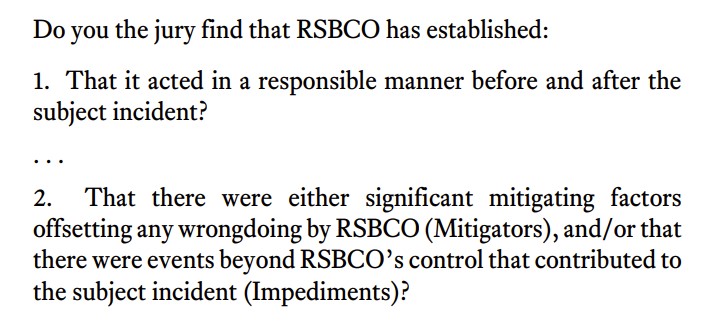 The jury answered “yes” to both questions. The problem emerged because the “mitigators” instruction for the second question was correct, but the “impediments” instrution was not. Therefore:
The jury answered “yes” to both questions. The problem emerged because the “mitigators” instruction for the second question was correct, but the “impediments” instrution was not. Therefore:
“Given the form’s single yes-or-no question as to mitigators ‘and/or’ impediments, there is no way logically to reconcile the verdict form to contain the improper instruction. Thus, the ‘challenged instruction could [well] have affected the outcome of the case,’ so we must vacate the verdict and remand for a new trial.”
No. 23-30062 (June 13, 2024) (citation omitted).
I didn’t really understand the issues in the bump-stock case until I saw the below graphic in Judge Elrod’s majority opinion for the en banc Fifth Circuit. Once I saw that, I realized why ATF had gone out over its skiis, and why the Supreme Court affirmed today.
As I argued a year ago, more than once, the Supreme Court holds 9-0 this morning that the mifepristone plaintiffs lacked standing:
 In 1949, a pipeline company received a grant from the Board of Mississipi Levee Commissioners to build and operate two crude oil pipelines in Issaquena County, Mississippi (the least populated county in the U.S. located to the east of the Mississippi River). A dispute arose over permitting fees, and the pipeline company sued the Levee Board for, inter alia, violating the Contract Clause of the U.S. Constitution.
In 1949, a pipeline company received a grant from the Board of Mississipi Levee Commissioners to build and operate two crude oil pipelines in Issaquena County, Mississippi (the least populated county in the U.S. located to the east of the Mississippi River). A dispute arose over permitting fees, and the pipeline company sued the Levee Board for, inter alia, violating the Contract Clause of the U.S. Constitution.
The Fifth Circuit affirmed dismissal: “Despite its significant investment in its pipelines, including their 2007 relocation, Mid Valley does not identify any affirmative or mutual obligations the Levee Board owed stemming from the 1949 Permit—because none are apparent in its express terms.” Accordingly, the Court distinguished this situation, where the permit clearly left complete discretion with the Board, from other permitting cases that did create some consideration / mutuality of obligation. Mid Valley Pipeline Co., LLC v. Rodgers, No. 23-60536 (June 5, 2024).
Governor Abbott has appointed the three inaugural members of the new Fifteenth Court of Appeals: Hon. Scott Brister, presently of Hunton Andrews Kurth, well-known statewide from his service on the Texas Supreme Court, and the author of City of Keller v. Wilson, 168 S.W.3d 802 (Tex. 2005); Hon. April Farris, of the First Court of Appeals; and Hon. Scott Field, of the 480th District Court in Williamson County, and formerly of the Third Court of Appeals.
 Little v Llano County addressed the removal of books from a public library, producing three opinions and a judgment affirming a preliminary injunction against the removal. The two judges voting to affirm focused on Circuit precedent, Campbell v. St. Tammany Parish School Board, 64 F.3d 184 (5th Cir. 1995), and its statement:
Little v Llano County addressed the removal of books from a public library, producing three opinions and a judgment affirming a preliminary injunction against the removal. The two judges voting to affirm focused on Circuit precedent, Campbell v. St. Tammany Parish School Board, 64 F.3d 184 (5th Cir. 1995), and its statement:
“that officials may not ‘remove books from school library shelves “simply because they dislike the ideas contained in those books and seek by their removal to `prescribe what shall be orthodox in politics, nationalism, religion, or other matters of opinion.'”
(cleaned up). The case also appears to present the first use of the phrase “butt and fart” (a shorthand for one set of the books at issue) in a three-opinion panel case. No. 23-50224 (June 6, 2024).
 SKAV, LLC, the operator of a Best Western hotel in Abbeville, Louisiana, sued a surplus-lines insurer about a hurricane-damage claim. The insurer sought to compel arbitration, based on a Louisiana statute that says:
SKAV, LLC, the operator of a Best Western hotel in Abbeville, Louisiana, sued a surplus-lines insurer about a hurricane-damage claim. The insurer sought to compel arbitration, based on a Louisiana statute that says:
A. No insurance contract delivered or issued for delivery in this state and covering subjects located, resident, or to be performed in this state, or any group health and accident policy insuring a resident of this state regardless of where made or delivered, shall contain any condition, stipulation, or agreement ..
(2) Depriving the courts of this state of the jurisdiction or venue of action against the insurer. …
D. The provisions of Subsection A of this Section shallnot prohibit a forum or venue selection clause in a policy form that is not subject to approval by the Department of Insurance.
Acknowledging differing approaches by district courts to examine this issue, the Fifth Circuit held in SKAV, LLC v. Indep. Specialty Ins. Co. that section (a)(2) of this statute applied to arbitration, and was not affected by section (D), which was fairly read as limited to forum and venue-selection clauses. No. 23-30293 (June 5, 2024).
Judge Easterbrook’s recent opinion about good fonts for legal writing emphasized the importance of “x-height,” which is the relative size of a small “x” to a capital letter in a particular font. It’s important to note, though, that x-height is only one of the relevant size measures, and an excessively high x-height can cause problems with “descending” letters such as “p” and “y.” This excellent article, from which the below illustration is taken, further explains this point while defining the other relevant measurements.
Legendary Seventh Circuit judge Frank Easterbrook has written authoritatively on many topics. Thanks to AsymaDesign, LLC v. CBL & Assocs. Mgmnt, Inc., the choice of a good font is now among them.
Judge Easterbrook noted that he was writing in Palatino Linotype, the standard font of the Seventh Circuit (and one of two that I regularly use, alternating with Book Antigua). He explained that it’s a desirable font for legal writing because it has a large “x-height” (the height of a lowercase “x” compared to a capital letter), along with similar fonts designed for book publication:
 The Appellant made the unfortunate choice of Bernhard Modern, a “display face suited to movie posters and used in the title sequence of the Twilight Zone TV show.” Because of that font’s low x-height, it’s hard to read in book-like writing:
The Appellant made the unfortunate choice of Bernhard Modern, a “display face suited to movie posters and used in the title sequence of the Twilight Zone TV show.” Because of that font’s low x-height, it’s hard to read in book-like writing:
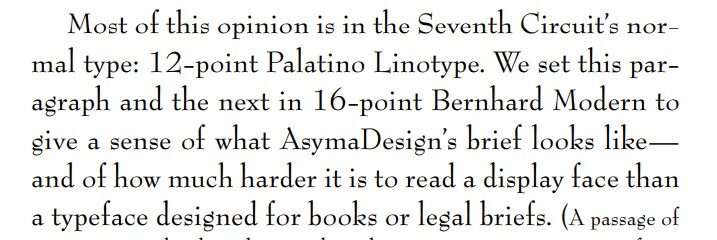 He concluded: “We hope that Bernhard Modern has made its last appearance in an appellate brief. “
He concluded: “We hope that Bernhard Modern has made its last appearance in an appellate brief. “
AAPS v. ABIM, No. 23-40423 (June 3, 2024), presented a question about pleading amendment, in which the Fifth Circuit said that the Galveston Division’s local rule about amendments was inconsistent with Fed. R. Civ. P.’s “liberal amendment scheme”:
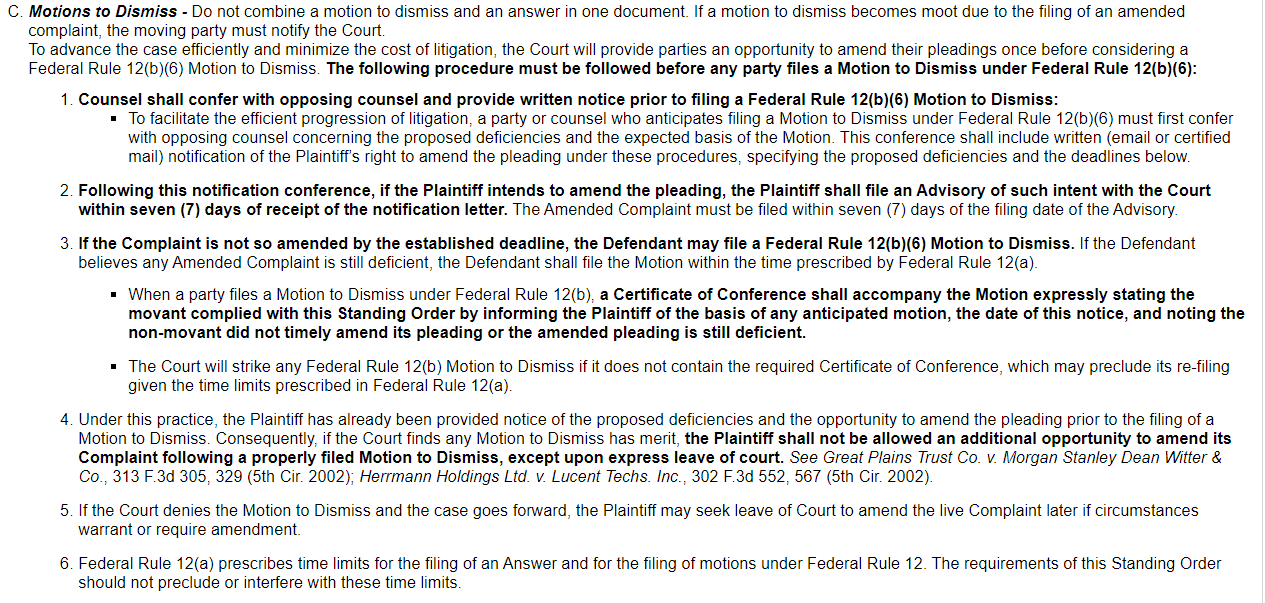 Other local rules on this, and other, common features of ciivl litigation may draw challanges as a result of this opinion.
Other local rules on this, and other, common features of ciivl litigation may draw challanges as a result of this opinion.
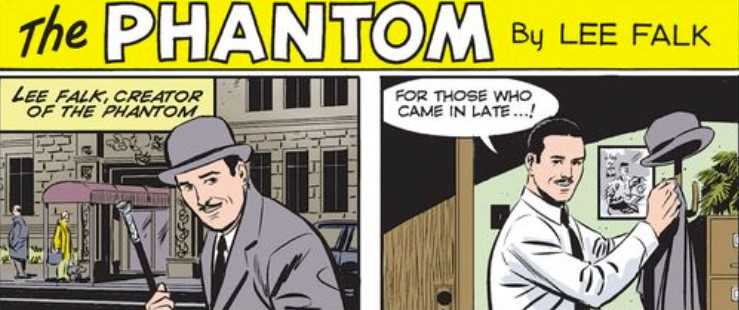 Longtime fans of the Phantom comic strip know that, when the plot becomes particularly complex, the strip’s author will make a cameo and give an update, announced by the phrase “For Those Who Came in Late!” In that spirit, 600Camp provides an update about the ongoing litigation about a CFPB rule involving credit-card late fees:
Longtime fans of the Phantom comic strip know that, when the plot becomes particularly complex, the strip’s author will make a cameo and give an update, announced by the phrase “For Those Who Came in Late!” In that spirit, 600Camp provides an update about the ongoing litigation about a CFPB rule involving credit-card late fees:
- On May 7, President Biden touted the rule in his State of the Union address.
- May 10, Judge Pittman enjoined the rule, based on a Fifth Circuit case about the CFPB’s funding that the Supreme Court overruled a few days later;
- On May 28, Judge Pittman granted the CFPB’s renewed motion to transfer the case to the District of Columbia (after an earlier transfer order was reversed by the Fifth Circuit, based on the procedural interplay between the injunction application and transfer motion);
- A new mandamus petition followed, leading to an administrative stay of the transfer order until mid-June along with a request for a reponse to the petition.
 The chaos caused by the Third Reich’s systematic theft of valuable art continues to the present day, as shown by Emden v. Museum of Fine Arts–a dispute about ownership of a painting called “The Marketplace of Pirna” (right). The claim of the heirs to the one-time owner failed because of the “act of state” doctrine, as the Fifth Circuit explained:
The chaos caused by the Third Reich’s systematic theft of valuable art continues to the present day, as shown by Emden v. Museum of Fine Arts–a dispute about ownership of a painting called “The Marketplace of Pirna” (right). The claim of the heirs to the one-time owner failed because of the “act of state” doctrine, as the Fifth Circuit explained:
The most straightforward and charitable reading of the Emdens’ complaint inevitably requires a ruling by a U.S. court that the Dutch government invalidly sent Moser the By Bellotto Pirna. The Emdens may be right: The Monuments Men may have improperly sent the By Bellotto Pirna to the [Dutch Art Property Foundation (“SNK”)]; the SNK may have unjustifiably sent Moser the By Bellotto Pirna even though he had a claim to only the After Bellotto Pirna; and the Museum may be violating the Washington Principles by refusing to return the painting to the Emdens.
But, per the act of state doctrine, it is not our job to call into question the decisions of foreign nations. As pleaded, the SNK’s shipping Moser the By Bellotto Pirna is an official act of the Dutch government. The validity and legal effect of that act is one that we may not dispute.
No. 23-20224 (May 29, 2024).
After much Sturm und Drang, the District of the District of Columbia returned Clarke v. CFTC to the Texas district court where that case started, reasoning:
[T]he Court will follow the weight of authority and transfer this case back to the requesting jurisdiction because the record establishes that it was transferred prematurely. The Court makes no decision on the Parties’ respective arguments on whether transfer would otherwise be appropriate. It certainly would be easy for the Court to keep this case—the Court currently has a case involving the same challenge against Defendant that is fully briefed and scheduled for argument soon. Nor does the Court quite understand how the District Court in Texas abused its discretion in making its determination. But the weight of authority instructs the Court on how such requests are routinely addressed, and the Court will follow that course of action here.
Clarke v. CFTC (citation omitted) (D.D.C. May 22, 2024).
Thryv, Inc. v. NLRB, a review of the NLRB’s handling of an unfair labor practices case, presents deft usage of a typographical device called the “dinkus”:
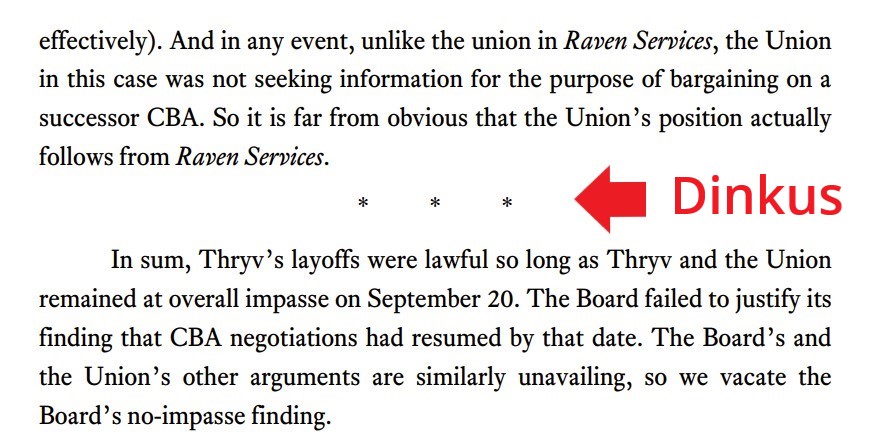
Thanks to the observant Cedric Bond for pointing this out!
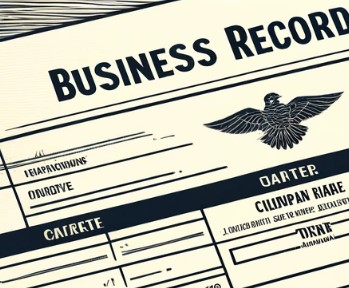 Hager v. Brinker Texas, Inc. reminds that the business-records exception to the hearsay rule has significant limitations. The Fifth Circuit summarized an earlier case, in a similar dispute about the admissibility of the employer’s records, as holding:
Hager v. Brinker Texas, Inc. reminds that the business-records exception to the hearsay rule has significant limitations. The Fifth Circuit summarized an earlier case, in a similar dispute about the admissibility of the employer’s records, as holding:
“[A]n employer’s human resource managers’ reports and letters tracing steps in investigating complaints of sexual harassment against an employee leading to discharge were admissible business records; but it also recognized that such reports would be ‘inadmissible where their “primary utility is for litigation.”‘”
Based on that rule, the Court held:
[T]he Venable declaration and Exhibit B were prepared immediately after the threat of Sharnez’s litigation loomed as Brinker knew that Sharnez complained of racial discrimination and mentioned contacting her lawyer. Venable’s conclusory assertion that the declaration and Exhibit B were made in the regular course of Brinker’s business, with no further explanation about whether it was company procedure to make similar records, does not frustrate this conclusion. Quite the opposite, Venable admitted that he had never before conducted an investigation into a guest complaint of racial discrimination, further undercutting any claim that the declaration was made in the “regular course” of business.
No. 21-20235 (May 22, 2024).
Lest one think the law of adminstrative stays had become more settled with time, MCR Oil Tools, LLC v. U.S. Dep’t of Transp. reminds otherwise. The manufacturer of a torch used in oil drilling challenged a new safety regulation on its product. The three judges on the panel reacted in different ways:
- The majority opinion defers the motion for stay to the next available argument panel;
- A dissent emphasized the need for immediate action, given the regulation’s effect on significant outstanding orders;
- A concurrence analogized the case to a recent challenge to the Texas ban on drag shows.
No. 24-60230 (May 23, 2024).
 “Double, double, toil and trouble,” chanted the three witches of Macbeth. “Double insulated,” said the Fifth Circuit in CFSA v. CFPB, holding that the Consumer Financial Protection Bureau’s funding mechanism was so far removed from Congress’s ordinary appropriations process that it violated the Appropriation Clause of the Constitution. Parting company with the above, the Supreme Court didn’t use the word “double” in reversing the Fifth Circuit, and holding that the CFPB is appropriately funded, considering history and practicality. CFPB v. CFSA, No. 22-448 (U.S. March 16, 2024).
“Double, double, toil and trouble,” chanted the three witches of Macbeth. “Double insulated,” said the Fifth Circuit in CFSA v. CFPB, holding that the Consumer Financial Protection Bureau’s funding mechanism was so far removed from Congress’s ordinary appropriations process that it violated the Appropriation Clause of the Constitution. Parting company with the above, the Supreme Court didn’t use the word “double” in reversing the Fifth Circuit, and holding that the CFPB is appropriately funded, considering history and practicality. CFPB v. CFSA, No. 22-448 (U.S. March 16, 2024).
Martin v. LCMC Health Holdings, Inc. presents a creative use of the “federal officer” removal statute. A hospital argued that because its patient-portal systems were part of a federal information program created by Congress, it “acts under the direction of a federal officer when embedding tracking pixels onto its website where patients may access their medical records.” While creative, the argument didn’t work: “LCMC’s relationship with the federal government is too attenuated to show any delegation of legal authority, and consequently, LCMC cannot show that it acted pursuant to a federal officer’s directions for purposes of federal officer removal. ” No. 23-30522 (May 13, 2024).
In a counterpoint to some treatments of standing in the mifepristone litigation, the Fifth Circuit rejected Texas’s standing to challenge an SEC disclosure requirement, reasoning:
As the States conceded during oral argument, there is no guarantee that regulated parties will always pass costs on to their consumers. Some costs may be too small to warrant a cost pass-through. So any cost pass-through must be established through evidence. We look to the evidence in the record to determine whether the facts of a specific case support “likely . . . pecuniary harm” to a suing party. Evidence couched in hypothetical language cannot support such an injury. Here, the record provides only speculation about the possibility of increased costs to investors as a result of new regulatory burdens on the funds.
State of Texas v. SEC, No. 23-60079 (May 10, 2024) (citations omitted, paragraph breaks removed, emphasis added).
The civil-criminal distinction was outcome determinative of the issue presented in Charitable DAF Fund, L.P. v. Highland Capital Management, L.P.:
“Highland incurred virtually all its contempt-related expenses because the bankruptcy court permitted extensive discovery and conducted a marathon evidentiary hearing to unearth Dondero’s role in filing the Motion [for Leave]. But Dondero’s intentions were relevant only to criminal contempt—a sanction the bankruptcy court was powerless to impose. Dondero’s intentions—and virtually all of the discovery and the bankruptcy court’s mini-trial—were irrelevant to civil contempt. The only question in civil contempt is whether and to what extent Highland was damaged by DAF’s choice to file the Motion in the wrong forum. Neither Highland nor the bankruptcy court was permitted to seize on DAF’s error and leverage it into a punitive proceeding.”
No. 22-11036 (April 4, 2024) (citations omitted).
 In a dispute about insurance coverage for a freak accident at a drag-racing event, the Fifth Circuit rejected the argument that the policy was ambiguous, reasoning:
In a dispute about insurance coverage for a freak accident at a drag-racing event, the Fifth Circuit rejected the argument that the policy was ambiguous, reasoning:
“[W]e must construe every part of the CGL Policy—the CGL Declaration, the CGL Form, and the CGL Endorsements simultaneously. So construed, the CGL Policy is not ambiguous.
Begin by considering the relationship between the CGL Form and the CGL Endorsements. Generalia specialibus non derogant. Given that the CGL Form provides general statements regarding coverage, a CGL Endorsement’s more specific statement regarding the same will control where the two conflict. …
As the CDE Endorsement and MV Endorsement illustrate, the CGL Endorsements modify express subsets of provisions in the CGL Form. They do not, however, expressly purport to modify the CGL Declaration, other provisions in the CGL Form, or other CGL Endorsements. So, relative to the CGL Form, each of the CGL Endorsements addresses a narrower set of provisions in greater detail.
Kinsale Ins. Co. v. Flyin Diesel Performance & Offroad, LLC, No. 23-50336 (April 26, 2024).
 In a return to the Fifth Circuit after an earlier panel opinion affirmed an antisuit injunction, the Court applied the Lauritzen-Rhoditis factors to conclude that Liberian law, rather than American, governed a boat crewmember’s claim about catching malaria aboard the ship:
In a return to the Fifth Circuit after an earlier panel opinion affirmed an antisuit injunction, the Court applied the Lauritzen-Rhoditis factors to conclude that Liberian law, rather than American, governed a boat crewmember’s claim about catching malaria aboard the ship:
Considered in the context of this case, involving traditional maritime shipping activities and assertions of wrongdoing yielding a seaman’s “shipboard injury,” none of the Lauritzen-Rhoditis factors that the Supreme Court has deemed significant to the choice of-law determination in traditional maritime shipping cases involve the United States. Specifically, the law of the flag factor, which generally is “of cardinal importance” in the traditional maritime shipping context, points to Liberia.
Ganpat v. Eastern Pacific Shipping PTE, No. 22-30758 (May 1, 2024).
 In Sanders v. The Boeing Co., No. 22-20317 (May 2, 2024), the Fifth Circuit summarized the two key holdings that resulted from certification of a question about the Texas limitations-savings statute (reproduced in full below):
In Sanders v. The Boeing Co., No. 22-20317 (May 2, 2024), the Fifth Circuit summarized the two key holdings that resulted from certification of a question about the Texas limitations-savings statute (reproduced in full below):
- “[Tex. Civ. Prac. & Rem. Code] Section 16.064(a)(1) applies whenever the previous court dismissed an action for lack of jurisdiction. Thus is so even when the court ‘erred and actually had jurisdiction or could have had jurisdiction had the claims been pleaded differently.'” (citation omitted)
- “[A] dismissal or other disposition does not ‘become final’ for purposes of Section 16.064(a)(2) until the parties have exhausted their appellate remedies and the court’s power to alter the dismissal has ended.'” (citation omitted, cleaned up).
If you have ever wondered “can the party-presentation principle help distinguish holding from dicta?’ then you will enjoy my new article in the Cornell Law Review Online, which hopefully offers some new perspective on some longstanding concepts.
 Phillips v. ERCOT addresses a dispute between ERCOT and the liquidating trust of Entrust Energy, a supplier of electriciity to end users, who went into bankruptcy after receiving a large bill in the wake of Winter Storm Uri. In resolving this dispute, the Fifth Circuit held:
Phillips v. ERCOT addresses a dispute between ERCOT and the liquidating trust of Entrust Energy, a supplier of electriciity to end users, who went into bankruptcy after receiving a large bill in the wake of Winter Storm Uri. In resolving this dispute, the Fifth Circuit held:
- No immunity for ERCOT. The six relevant factors were “an even split,” but because ‘our court has indicated repeatedly that factor 2 [the source of the entity’s funding] is the most important, ERCOT is not an arm of Texas and not entitled to immunity in federal court.”
- Abstention. Burford abstention was required because, inter alia: “federal adjudication of the [programs at issue] risks dramatic intrusion into Texas’s specialized system of electric utility regulation and would disrupt Texas’s efforts to establish a coherent and uniform policy for electric utilities. Under the specific circumstances of this case, the fact that the takings claim arises under federal law and that Texas does not provide any sort of specialized system for review does not support hearing the claim.” (footnote omittted).
No. 22-20603 (April 29, 2024).
![]() To the right is a painting of Julius Caesar crossing the Rubicon. A river-crossing issue also arose in Good River Farms, L.P. v. TXI Operations, L.P. A severe flood on the Colorado River breached a water reservoir on a commercial property, which in turn led to the flooding of a neighboring farm.
To the right is a painting of Julius Caesar crossing the Rubicon. A river-crossing issue also arose in Good River Farms, L.P. v. TXI Operations, L.P. A severe flood on the Colorado River breached a water reservoir on a commercial property, which in turn led to the flooding of a neighboring farm.
Liability under the Texas Water Code turned on whether “surface waters” (the water in the reservoir) caused the problem at the farm, or whether it was water from the Colorado River (not considered “surface water” under the Code, because the river is a “bed or channel in which water is accustomed to flow”).
The Fifth Circuit found sufficient evidence to support a judgment for the farm, reasoning that “[t]he jury apparently concluded that the water was not overflow fromthe river, but surface water accumulated in such quantity that it ran contrary to the riverine flow.” No. 23-50330 (April 25, 2024).
The Fifth Circuit reversed because of a new trial-court reply-brief argument in Georgia Firefighters’ Pension Fund v. Anadarko Petroleum Corp., reasoning:
A class of stock purchasers allege that Anadarko Petroleum Corporation fraudulently misrepresented the potential value of its Shenandoah oil field project in the Gulf of Mexico, in violation of federal securities law. During the class certification proceedings below, Plaintiffs presented new evidence for the first time in a reply brief. As a result, Anadarko did not have fair opportunity to address that new evidence at an earlier stage in the briefing. So the district court should have permitted Anadarko to file a sur-reply responding to that new evidence contained in Plaintiffs’ reply.
No. 23-20424 (April 24, 2024).
As noted previously, the Fifth Circuit denied en banc review by an 8-8 vote in a contentious forum dispute. The breakdown of the votes is follows (the entire panel majority opinion appears in the chart, and the panel dissent is reproduced as an exhibit to the dissent from the denial of en banc review):
The Fifth Circuit’s recent en banc vote in Consumers’ Research v. CPSC, an unsuccessful constitutional structure to the Consumer Product Safety Commission in light of recent Supreme Court precedent, is summarized in the below chart. The vote was accompanied by a concurrence and two dissenting opinions.
The Fifth Circuit’s recent en banc vote in Book People, Inc. v. Wong, a successful constitutional challenge to a prior-restraintish law involving the content of books in school libraries, is summarized in the below chart:
 The Fifth Circuit reversed the dismissal of securities-fraud claims in Oklahoma Firefighters Pension & Retirement System v. Six Flags Entertainment Corp., holding that the district court had misread a prior appellate opinion. The Court stated, inter alia:
The Fifth Circuit reversed the dismissal of securities-fraud claims in Oklahoma Firefighters Pension & Retirement System v. Six Flags Entertainment Corp., holding that the district court had misread a prior appellate opinion. The Court stated, inter alia:
Any fair reading shows why our prior opinion very clearly did not hold the alleged fraud was fully disclosed by October 2019. The most obvious sign is the absence of any statement expressly concluding that all purported fraud was fully disclosed by October 2019 and that therefore, the class period was truncated. Given that such a conclusion would all but end the case as to Oklahoma Firefighters, it stands to reason that if that was actually our decision, we would have said so explicitly. To borrow a familiar phrase from statutory interpretation principles, we do not “hide elephants in mouseholes.”
No. 23-10696 (April 18, 2024) (citation omitted).
 Recent dialogue about the benefits and drawbacks of single-judge judicial district has led to further public remarks, which have in turn drawn interesting rebuttal from commentators in Above the Law and Balls and Strikes.
Recent dialogue about the benefits and drawbacks of single-judge judicial district has led to further public remarks, which have in turn drawn interesting rebuttal from commentators in Above the Law and Balls and Strikes.
(It bears mention in this discussion that the Alliance for Hippocratic Medicine – the lead plaintiff in the mifepristone litigation that touched off the present debate – was created three months before that litigation by several out-of-state anti-abortion groups, as explained in an informative Intercept article that discusses the broader history of such groups.)
Resolving another of the simmering venue disputes that have drawn considerable attention in recent weeks, the full Fifth Circuit denied en banc review (an 8-8 tie vote) of the denial of mandamus relief in In re SpaceX – a challenge to the district court’s order that transferred a dispute between SpaceX and the NLRB to the Central District of California.
 The surprisingly slippery question whether Texas law allows a takings claim to proceed against the state came to an anticlimactic end with the Supreme Court’s opinion in DeVillier v. Texas:
The surprisingly slippery question whether Texas law allows a takings claim to proceed against the state came to an anticlimactic end with the Supreme Court’s opinion in DeVillier v. Texas:
As Texas explained at oral argument, its state-law inverse-condemnation cause of action provides a vehicle for takings claims based on both the Texas Constitution and the Takings Clause. … And, although Texas asserted that proceeding under the state-law cause of action would require an amendment to the complaint, it also assured the Court that it would not oppose any attempt by DeVillier and the other petitioners to seek one.
No. 22-913 (U.S. April 16, 2024).
 Members of the Lipan-Apache Native American Church sued the City of San Antonio about its plans for a large city park that contains an area of particular religious significance to this church. One aspect of the case involved physical access to that area. After the City complied with the trial-court’s order on that issue, the Fifth Circuit held that part of the case was moot, and did not apply the “voluntary cessation” (i.e., “a defendant could … pick up where he left off”) exception to mootness:
Members of the Lipan-Apache Native American Church sued the City of San Antonio about its plans for a large city park that contains an area of particular religious significance to this church. One aspect of the case involved physical access to that area. After the City complied with the trial-court’s order on that issue, the Fifth Circuit held that part of the case was moot, and did not apply the “voluntary cessation” (i.e., “a defendant could … pick up where he left off”) exception to mootness:
[T]he City affirmed that it undertook several additional efforts “going beyond what the district court ordered.” The City conceded that removing the limb allowed it to reconfigure the construction fencing and it subsequently granted public access to the entire area. Likewise, the City granted Appellants access to conduct a religious ceremony at the Sacred Area from midnight to 4 a.m. on November 18, 2023, during hours when the Park is normally closed. Furthermore, on November 21, 2023, the City moved to dismiss its crossappeal in this action, deciding to no longer pursue the issue of access to the Sacred Area. Based on these subsequent developments, “[i]t is therefore clear that [the City officials] harbor no animosity toward [Appellants].” Appellants now have “no reasonable expectation that the wrong challenged by [them] would be repeated.” Thus, the voluntary cessation exception does not apply.
Perez v. City of San Antonio, No. 23-50746 (April 11, 2024) (citations omitted).
 After a Fifth Circuit panel granted mandamus relief about a transfer of a case involving the CFPB to the District of Columbia, the district court there entered this Minute Order on April 10:
After a Fifth Circuit panel granted mandamus relief about a transfer of a case involving the CFPB to the District of Columbia, the district court there entered this Minute Order on April 10:
This case was received from the U.S. District Court in the Northern District of Texas on March 29, 2024. On April 8, 2024, the Court received a copy of the Order Reopening Case and Providing Notice to the United States District Court of the District of Columbia … issued by the Texas district court in accordance with In re Fort Worth Chamber of Commerce, No. 24-10266 (5th Cir. Apr. 5, 2024) (attached to Notice and Order). The Fifth Circuit found that the district court lacked jurisdiction to transfer the case while an appeal was pending before the Court of Appeals, and it ordered the district court to “reopen the case and to give notice to D.D.C. that its transfer was without jurisdiction and should be disregarded.” While the Court is not inclined to “disregard” a case on its docket, and it has considerable discretion to supervise its own cases, a review of the Notice and Order, as well as the docket in the Northern District of Texas, reflects that the case is now proceeding there under the supervision of another district court. Therefore, the case will be terminated on this court’s docket at this time without prejudice. This order should not be read to express any view on the transfer question, which has not been presented to this Court to decide. The Clerk of Court is directed to terminate this case on the docket of the District Court for the District of Columbia.
Meanwhile, back in New Orleans, the Fifth Circuit has asked for supplemental briefing about “whether or not an ownership interest in a nonparty large credit card issuer would be substantially affected by the outcome of this litigation,” for purposes of evaluation potential judicial recusal. On May 3, the panel released a revised opinion.
I hope you find this cross-post from 600 Commerce to be informative!
The most recent Advocate (the quarterly publication of the State Bar of Texas Litigation Section) has several articles about how the new Fifteenth Court of Appeals will get off the ground. I have a short piece on where the new court is likely to look for precedent, since it will have none of its own to start. I hope you find it useful in thinking about this important new appellate forum.
 In D&T Partners LLC v. Baymark Partners Mgmnt., LLC, “[a] group of individuals allegedly sought to steal the assets and trade secrets of an e-commerce company,” and “did so with shell entities, corrupt lending practices, and a fraudulent bankruptcy.” The plainitffs’ complaint did not state a RICO claim, however:
In D&T Partners LLC v. Baymark Partners Mgmnt., LLC, “[a] group of individuals allegedly sought to steal the assets and trade secrets of an e-commerce company,” and “did so with shell entities, corrupt lending practices, and a fraudulent bankruptcy.” The plainitffs’ complaint did not state a RICO claim, however:
“While the complaint alleges coordinated theft, the alleged victims are limited in number, and the scope and nature of the scheme was finite and focused on a singular objective. … [T]his does not constitute a “pattern” of racketeering conduct sufficient to state a RICO claim ….”
No. 22-11148 (Apr. 4, 2024).
In a muscular display of appellate review, in Career Colleges & Schools of Texas v. U.S. Dep’t of Educ., the Fifth Circuit:
- Disagreed with the district court’s conclusion that an association of career schools lacked standing due to a lack of immediate irreparable injury, identifying three types of injury suffered as a result of new DOE regulations about certain defenses to student-loan repayment;
- Concluded that, as a matter of law, the association had satisfied the requirements for a preliminary injunction;
- Gave the resulting injunction nationwide effect; and
- Ordered: “The stay pending appeal remains in effect until the district court enters the preliminary injunction.”
No. 23-50491 (April 4, 2024).
Long-running litigation about control of the Jackson airport led to the en banc court holding on April 2 that the appeal was moot. A breakdown of the viewpoints appears below:
 Several disputes about inter-circuit venue transfers are ongoing (I was recently interviewed by Bloomberg about this phenomenon):
Several disputes about inter-circuit venue transfers are ongoing (I was recently interviewed by Bloomberg about this phenomenon):
- SpaceX. In a dispute between SpaceX and the NLRB, the Fifth Circuit is considering whether to review a transfer order en banc. The NLRB recently filed its response to an unusual order from the panel asking the NLRB to explain several actions taken earlier in the proceedings. The gist of the NLRB’s response was:
Only one court may have jurisdiction at a time. The transferee court was notobliged to follow the February 26 order, and zealous advocacy required the NLRB to present its legal arguments as to why it should not be followed to the Central District of California. Thus, the NLRB urged that court, not to ignore this Court’sorder, but to acknowledge it and respectfully decline retransfer.
- CFTC. In a dispute involving the Commodities Futures Trading Commission, the District of the District of Columbia has received the district court’s request to return the case, along with briefing and argument from the parties about the appropriate next step, and as of April 6 continued to have that request under consideration.
- CFPB. In a dispute involving the CFPB and a new rule about credit-card late fees, a 2-1 panel decision granted mandamus relief on April 5–after a case had been transferred to the District of the District of Columbia, concluding:
Because the Chamber had a short window of time to either (1) comply with the Final Rule, or (2) seek a preliminary injunction, the district court’s inaction amounted to an effective denial of the Chamber’s motion for a preliminary injunction. That effective denial is properly before us on appeal. The district court lacked jurisdiction to transfer the case after this appeal was docketed because doing so would alter its status. … The district court is ORDERED to reopen the case and to give notice to D.D.C. that its transfer was without jurisdiction and should be disregarded.
- CFPB dissent. The dissent in the CFPB case concluded: “For the foregoing reasons, I believe that the new proposition of law created by the majority is incompatible with district court discretion over docket management and prudent policing of forum shopping. Finally, I am confident the District Court for the District of Columbia will give the suggestion that it should disregard a case docketed by it its closest attention.”
- HHS. The Court has expedited argument (to May 1) of National Infusion Center v. Becerra , a challenge to the dismissal of a case about 2022 drug-reimbursement regulations on venue grounds (after the dismissal of a party for jurisdictional reasons).
Several matters involving inter-circuit venue transfers are ongoing:
- In a dispute between SpaceX and the NLRB, the Fifth Circuit is considering whether to review a transfer order en banc. The panel recently issued this unusual order asking the NLRB’s counsel to explain several actions taken earlier in the proceedings.
- In a dispute involving the CFTC, the District of the District of Columbia has received the district court’s request to return the case, and is receiving briefing and argument from the parties about the appropriate next step.
- In another dispute involving the CFPB, the Fifth Circuit has administratively stayed a transfer order and referred the matter to the next available argument panel.
 A recent policy statement from the Judicial Conference of the United States recommended changes to judge-assignment practices in district courts. The statement has drawn considerable attention both pro and con; this Volokh Conspiracy post is a good summary of the “con” side. A recent letter from the Chief Judge of the Northern District of Texas says that its judges have declined to materially change that district’s judge-assignment policies.
A recent policy statement from the Judicial Conference of the United States recommended changes to judge-assignment practices in district courts. The statement has drawn considerable attention both pro and con; this Volokh Conspiracy post is a good summary of the “con” side. A recent letter from the Chief Judge of the Northern District of Texas says that its judges have declined to materially change that district’s judge-assignment policies.
Applying the international convention about arbitration, the Fifth Circuit found an abuse of discretion in not compelling arbitration because of equitable estoppel, reasoning:
While Bufkin was certainly free to name and then dismiss the foreign insurers, the district court was not free to disregard them in considering the domestic insurers’ motion to compel arbitration. Yet in focusing on Bufkin’s dismissal of the foreign insurers, the district court neglected to consider the foreign insurers’ part in the seamless coverage agreement struck by the parties, and Bufkin’s interactions with the insurers. Honing in, that coverage arrangement included the arbitration clause that afforded the insurers–foreign and domestic—“predictability in resolving disputes dealing with the substantial risks presented by a surplus lines insurance policy.” … The upshot is that indulging Bufkin’s pleading-and-then-dismissing gamesmanship by denying arbitration turns on its head the axiom that “[t]he linchpin for equitable estoppel is equity—fairness.”
Bufkin Enterprises, LLC v. Indian Harbor Ins. Co., No. 23-30171 (March 4, 2024) (emphasis added).
After an earler (unexplained) grant of an administrative stay touched off weeks of fast-paced appellate litigation about Texas’s “SB4” immigration law, a majority of the Fifth Circuit’s merits panel denied any further stay of the trial court’s injunction against enforcement of that law. USA v. Texas, No. 24-50149 (March 26, 2024). Argument is scheduled next week; barring Supreme Court intervention, merits opinions similar to these are likely.
 The Fifth Circuit made/ an interesting observation about the comparative weight of Erie precedent in SXSW LLC v. Fed. Ins. Co.:
The Fifth Circuit made/ an interesting observation about the comparative weight of Erie precedent in SXSW LLC v. Fed. Ins. Co.:
Federal cites two federal district courts to support its broader interpretation. … But these authorities are worth relatively little in this case. Our focus is on Texas law as interpreted by the Texas state courts.
No. 22-50933 (March 21, 2024) (unpublished).
This morning’s Supreme Court arguments in the mifepristone cases (which will be available here when ready) lead to a couple of observations about legal issues of the day:
- Standing. As the Washington Post effectively summarized: “A majority of justices from across the ideological spectrum expressed skepticism that the antiabortion doctors challenging the government’s loosening of regulations have sufficient legal grounds — or standing — to bring the lawsuit.” (Last year, I wrote about the “conservative” approach to standing in high-profile constitutional cases in a Slate article, and the application of basic standing principles in the mifepristone cases in this Dallas Morning News editorial.)
- Comstock. Justice Holmes famously observed: “The common law is not a brooding omnipresence in the sky.” But the Comstock Act is, and Congress should do something about the law before its 1870s-era moralism is inflicted on modern society. Mark Stern’s X feed on the mifepristone arguments summarizes some of the present state of play.
A propane grill exploded; the injured plaintiff won a judgment against the supplier of the propane tank, and the Fifth Circuit reversed in Johnston v. Ferrellgas, Inc.:
[T]he circumstantial evidence on which the Johnstons rely does not cure the want of proof that the tank was defective when it left Ferrellgas’s possession. This is not a res ipsa case. Indeed, the Johnstons did not advance that theory of liability before the district court or before us. In sum, the Plaintiff’s expert admitted that he could not say the tank was defective at the time it left Ferrellgas, making his prior comments about the tank’s condition at that time pure speculation; the tank functioned properly before Johnston used it; the tank and seal are not sealed containers; and both parties agree Ferrellgas successfully refilled the tank with gas under highpressure months before the accident. There is no reasonable basis on which the jury could find the Johnstons met their burden.
No. 23-10019 (March 21, 2024). A dissent saw matters differently.
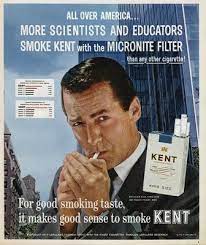 In the 1950s, Big Tobacco advertised the safety of “Kent with the Micronite Filter,” which was unfortunately made with an exceptionally dangerous form of asbestos. After decades of advertising bans and mandatory disclosures, the battle over cigarette ads continues, leading most recently to R.J. Reynolds Tobacco Co. v. FDA – a First Amendment challenge to new, more graphic disclosures about the potential harms of smoking.
In the 1950s, Big Tobacco advertised the safety of “Kent with the Micronite Filter,” which was unfortunately made with an exceptionally dangerous form of asbestos. After decades of advertising bans and mandatory disclosures, the battle over cigarette ads continues, leading most recently to R.J. Reynolds Tobacco Co. v. FDA – a First Amendment challenge to new, more graphic disclosures about the potential harms of smoking.
The Fifth Circuit rejected the challenge (reversing a contrary district-court opinion) and remanded for consideration of claims involving the Administrative Procedure Act. As to the First Amendment issues, the Court summarized:
When determining whether Zauderer applies, (1) images can be factual; (2) ideological or emotion-inducing statements are not per se controversial or non-factual; (3) “uncontroversial” means not subject to good-faith dispute about the accuracy of the factual statement; and (4) legitimate state interests other than the prevention of consumer deception are cognizable under Zauderer. For the reasons detailed above, the district court erred by finding Zauderer inapplicable to the FDA’s newest Warnings. Applying Zauderer, the Warnings survive constitutional muster against the First Amendment challenge.
No. 23-40076 (March 21, 2024).
 In Wilmington Savings Fund Society, FSB v. Myers, the appellant argued that its notice of appeal was timely, when filed within 30 days of a second judgment, and when the first judgment “was mislabeled because even though it purported to dispose of all claims and parties in the case, the title of the order did not signal that it was a final judgment.”
In Wilmington Savings Fund Society, FSB v. Myers, the appellant argued that its notice of appeal was timely, when filed within 30 days of a second judgment, and when the first judgment “was mislabeled because even though it purported to dispose of all claims and parties in the case, the title of the order did not signal that it was a final judgment.”
The Fifth Circuit agreed. Noting that “[o]rdinarily, such minor changes to an order do not ‘disturb or revise legal rights and obligations’ of the parties” (cleaned up), it concluded that “there was in this case a clear discrepancy between the label and the body of the district court’s order” that was sufficient to treat it as a substantive revision for purposes of calculating the appeal deadline. No. 24-20018 (March 18, 2024) (applying FTC v. Minneapolis-Honeywell Regulator Co., 344 U.S. 206, 211 (1952)).
(The graphic was provided by DALL-E, and explained by it as follows: “The images above illustrate the concept of a substantive change versus a change solely of form, through the comparison of a caterpillar’s transformation into a butterfly (substantive change) and a chameleon’s color change (change of form).”
All eyes will be on New Orleans this morning, for the (videoconferenced) arguments in United States v. Texas, where last night’s order suggests a 2-1 decision will be forthcoming that continues to bar enforcement of Texas’s SB4 during the pendency of its appeal. The Supreme Court will likely be asked about the resulting order, whatever it may be.
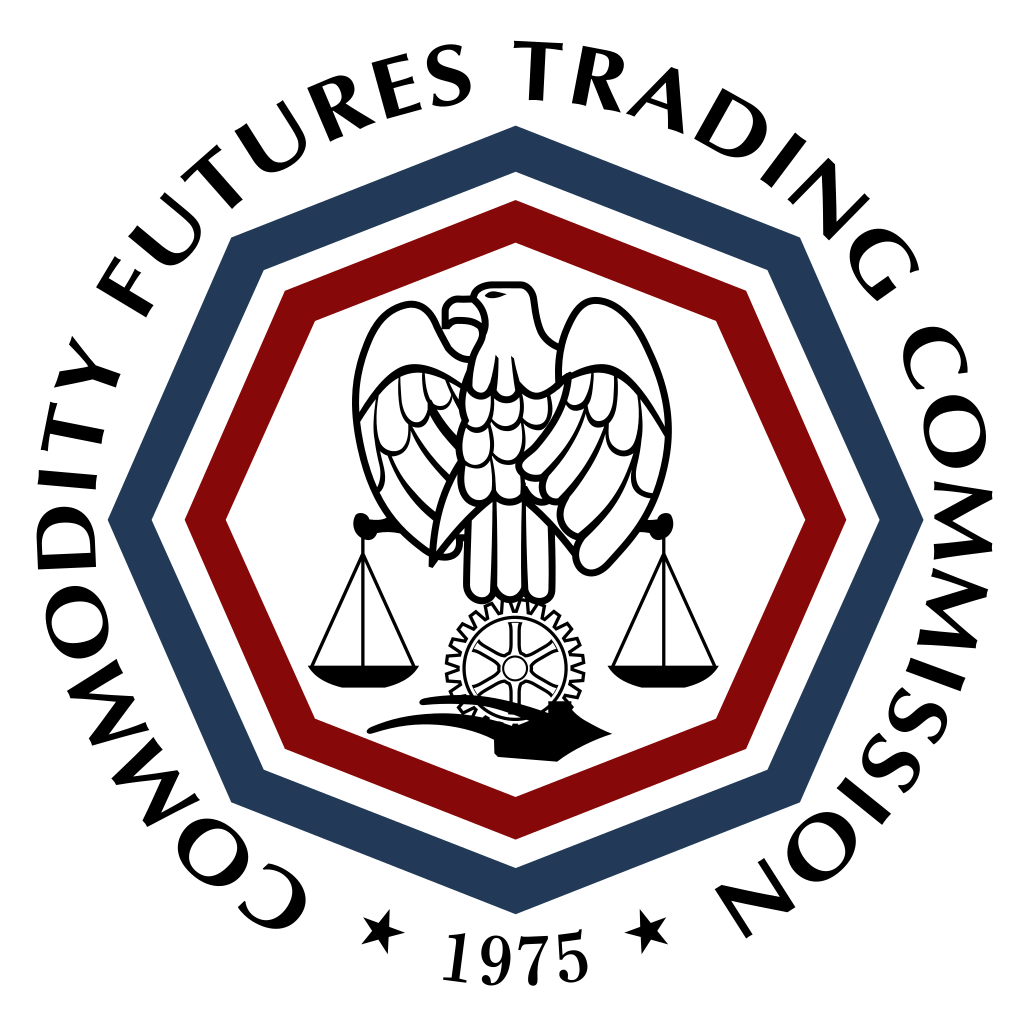 Earlier this month, the Fifth Circuit granted mandamus relief, including the issuance of a writ of mandamus to the Western District of Texas, requiring that the district court request the return of a case from the District of the District of Columbia. That request was made on March 7. As of March 19, that court had not ruled on the request, and the CFTC continues to urge that the court delay action until it has received further briefing on the venue issue.
Earlier this month, the Fifth Circuit granted mandamus relief, including the issuance of a writ of mandamus to the Western District of Texas, requiring that the district court request the return of a case from the District of the District of Columbia. That request was made on March 7. As of March 19, that court had not ruled on the request, and the CFTC continues to urge that the court delay action until it has received further briefing on the venue issue.
In Calogero v. Shows, Cali & Walsh, LLP, (discussed earlier this week for stylistic reasons), a panel majority found that two recipients of certain Hurricane Katrina relief stated a viable Fair Debt Collection Act claim when:
- The longest possible limitations period (10 years) had run by the time the demand letters requested payment; and
- The demand letters threatened a claim for attorneys fees, when the relevant documents only created a specific right to potential fee recovery that did not include the alleged debt at issue.
The third judge, without opinion, concurred in the result only. No. 22-30487 (March 15, 2024).
 Michael Cloud, a former NFL running back, sued the NFL’s retirement fund for additional disability benefits. The Fifth Circuit reversed a trial-court ruling in his favor, noting the one-sided nature of the plan’s operations, but concluding:
Michael Cloud, a former NFL running back, sued the NFL’s retirement fund for additional disability benefits. The Fifth Circuit reversed a trial-court ruling in his favor, noting the one-sided nature of the plan’s operations, but concluding:
Cloud’s claim fails because he did not and cannot show any changed circumstances entitling him to reclassification to the highest tier of benefits. He could have appealed the 2014 denial of reclassification to Active Football status—but he did not do so. Instead, Cloud filed another claim for reclassification in 2016, which subjected him to a changed-circumstances requirement that he cannot meet—and did not try to meet. He therefore forfeited the issue at the administrative level and at any rate has not pointed to any clear and convincing evidence supporting his claim.
The district court’s findings about the NFL Plan’s disregard of players’ rights under ERISA and the Plan are disturbing. Again, this is a Plan jointly managed by the league and the players’ union. And we commend the trial court judge for her diligent work chronicling a lopsided system aggressively stacked against disabled players. But we also must enforce the Plan’s terms in accordance with the law.
Cloud v. Bell-Rozelle NFL Player Retirement Plan, No. 22-10710 (revised March 17, 2024).
 You can tell your argument isn’t working when the Fifth Circuit summarizes it as follows:
You can tell your argument isn’t working when the Fifth Circuit summarizes it as follows:
“SCW’s last remaining counterargument is that it should be able to pick and choose different clauses from the LSAA and the Grant Agreement and then mush them together to demand money from debtors.”
and when the Court begins its opinion:
“Widowed octogenarians Iris Calogero and Margie Nell Randolph received dunning letters from a Louisiana law firm … .”
Calogero v. Shows, Cali & Walsh, LLP, No. 22-30487 (March 15, 2024). More substantive review to follow in the week ahead!
The Judicial Conference has voted to strenghen its policy about random case assignment, as set forth here.
Deanda v. Becerra presents a conflict between Title X (a federal law about the availability of contraception), and a Texas parental-consent statute. The Fifth Circuit found no conflict, and thus no preemption. On the threshold question of standing, the Court rejected the argument that any parent could sue about this issue, observing, inter alia: “This case does not concern all ‘parents or potential parents.’ It concerns only a parent with particular religious beliefs about raising his children.” No. 23-10159 (March 12, 2024).
 The Fifth Court ordered a rare reversal for a new trial because of improper closing argument in Clapper v. American Realty Investors. The Court summarized the improper statements as “employ[ing] nearly every type of improper argument identified by our court, including highly improper and personal attacks against opposing counsel, remarks about Clapper’s wealth, a discussion of matters not in the record, insinuations that Clapper had lower moral standards because he was from Michigan, and suggestions of Clapper’s bad motives through counsels’ opinion.”
The Fifth Court ordered a rare reversal for a new trial because of improper closing argument in Clapper v. American Realty Investors. The Court summarized the improper statements as “employ[ing] nearly every type of improper argument identified by our court, including highly improper and personal attacks against opposing counsel, remarks about Clapper’s wealth, a discussion of matters not in the record, insinuations that Clapper had lower moral standards because he was from Michigan, and suggestions of Clapper’s bad motives through counsels’ opinion.”
The Court concluded: “We remind all practitioners in our court that zealous advocacy must not be obtained at the expense of incivility. As Judge Reavley aptly explained, ‘Although earnest, forceful, and devoted representation is both zealous and proper, Rambo and kamikaze lawyers lead themselves and their clients to zealous extinction.'” No. 21-10805 (March 8, 2024).
Notably, footnote two dismisses several arguments about preservation, concluding that “[t]he serious nature of the argument in this trial … indicates that substantial justice requires a new trial ….”
In the ongoing proceedings about the transfer of venue in a dispute between SpaceX and the NLRB, a Fifth Circuit judge has held the mandate – a step often seen in difficult cases where en banc review is possible. Interestingly, in Texas state practice, a mandate does not issue in a mandamus proceeding, because a mandamus petition is an original proceeding in the court of appeals and there is no jurisdiction to return to a trial court.
I apologize for the peculiar look of many of the site’s posts. A WordPress “plug in” has malfunctioned and until it is replaced, the site’s graphics will just look a little funny.
Last week, the Central District of California returned a case to Texas district court, after the Fifth Circuit pointed out that it had issued a stay order (in a mandamus proceeding brought to challenge the venue transfer) before the California court had docketed the transferred matter.
Then, after the return of the case to Texas, the Court denied mandamus relief. The majority did not write an opinion. A dissent would have granted the writ. In re SpaceX, No. 24-40103 (March 5, 2024). It remains to be seen what court will act next.
In Cheapside Minerals, Ltd. v. Devon Energy Prod Co., L.P., the Fifth Circuit concluded that CAFA’s “local controversy” exception did not apply, and thus reversed a remand to state court in an oil-and-gas royalties dispute:
[T]he “principal injury” each Plaintiff sustained is obvious because there was only one type of injury: a financial harm resulting from Devon’s alleged underpayment of their royalties. While most Plaintiffs sustained that injury in Texas, others did not. Therefore, the principal injuries prong is not satisfied in this case, and Plaintiffs have failed to demonstrate that the local controversy exception applies.
No. 24-40026 (March 1, 2024).
After a case was transfered to the District of Columbia, the Fifth Circuit granted mandamus relief about that transfer in In re Clarke, focusing on the district court’s analysis of the “local interest” factor
[E]vents giving rise to the suit can be separated into two categories: The first concerns individual traders who purchased contracts on the marketplace. Five of them are based in Austin, bought their contracts from Austin, and have been harmed in Austin. The second category deals with marketplace service providers—Aristotle and PredictIt. Based in D.C., they “expended significant resources to assist Victoria University in developing and operating the PredictIt Market” and “will be forced to incur massive administrative, labor, time, and other costs if forced to liquidate pending contracts prematurely.”
Given those events, there is an obvious connection between the facts giving rise to this case and the Western District of Texas. And, if we assume that Aristotle’s and PredictIt’s development and operations activities occurred in D.C., there is also a factual connection with D.D.C.
Additionally, the effect of this suit is completely diffuse. Should plaintiffs prevail on their APA challenge, this court must “set aside” CFTC’s ultra vires recission action, with nationwide effect. That affects persons in all judicial districts equally.
No. 24-50079 (March 1, 2024) (footnote omitted). As with last week’s decision in a similar posture involving SpaceX, it remains to be seen whether the transferee district court will return the case.
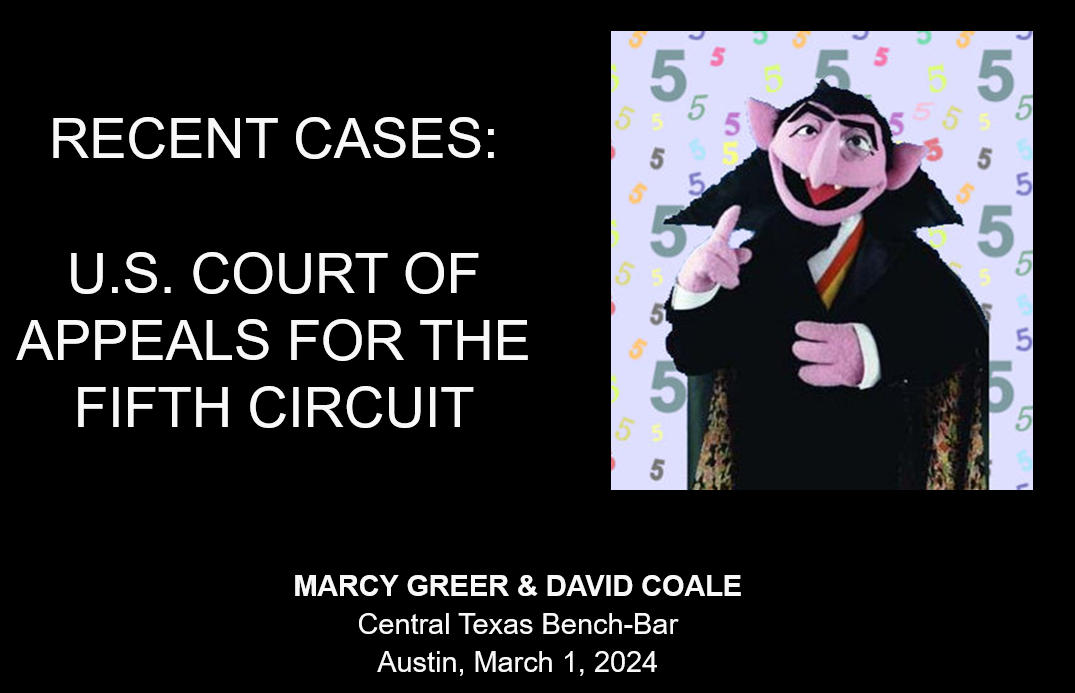 Together with Marcy Greer, I recently gave an update about recent Fifth Circuit cases at the first-ever Central Texas Bench-Bar meeting. This is our PowerPoint from the March 1 presentation.
Together with Marcy Greer, I recently gave an update about recent Fifth Circuit cases at the first-ever Central Texas Bench-Bar meeting. This is our PowerPoint from the March 1 presentation.
 In 2022, a venue skirmish in a contentious firerarms-manufacturing case led to a Pennsylvania district court declining to return a transferred case to the Fifth Circuit. Echoes of that skirmish can be heard in In re Space Exploration Technologies Corp., a dispute between SpaceX and the NLRB, where the following occurred:
In 2022, a venue skirmish in a contentious firerarms-manufacturing case led to a Pennsylvania district court declining to return a transferred case to the Fifth Circuit. Echoes of that skirmish can be heard in In re Space Exploration Technologies Corp., a dispute between SpaceX and the NLRB, where the following occurred:
SpaceX petitioned this court for a writ of mandamus on February 16, 2024, requesting that we direct the district court to vacate its transfer order. Our court stayed the Southern District of Texas’s transfer order on February 19, 2024. Nevertheless, the Central District of California docketed the case four days later, on February 23, 2024, as case number 2:24-cv-1352-CBM-AGR.
Accordingly, the Fifth Circuit directed the district court to ask the California court to return the case. The Fifth Circuit’s order points out that the California court lacks jurisdiction, since the docketing did not occur until after the stay issued. And unlike the 2022 gun case, the transferee court agreed with the Fifth Circuit, and has indicated that it will return the case to Texas when it receives the official request from the Texas trial court. No. 24-40103 (Feb. 26, 2024) (unpublished order).
 The plaintiffs’ takings claim failed in Treme v. St. John the Baptist Parish Council, when the relevant mineral lease was “for a period of Three (3) years from the date Lessee procures approval to commence operations frm local, state and federal authorities, as needed ….” The requirement of government approvals created a “suspensive condition” to the lease’s effectiveness, and “[b]ecuase they have not been obtained, the district court was correct in determining that the lease had not yet become effective.” No. 23-30084 (Feb. 16, 2024).
The plaintiffs’ takings claim failed in Treme v. St. John the Baptist Parish Council, when the relevant mineral lease was “for a period of Three (3) years from the date Lessee procures approval to commence operations frm local, state and federal authorities, as needed ….” The requirement of government approvals created a “suspensive condition” to the lease’s effectiveness, and “[b]ecuase they have not been obtained, the district court was correct in determining that the lease had not yet become effective.” No. 23-30084 (Feb. 16, 2024).
February 2024 has been a busy month for en banc votes. The recent vote by the full court about a stay in U.S. v. Abbott, as well as votes to deny en banc review of Baker (a takings case about police destruction of a home) and Solis (holding that a preferential-transfer claim was stated as to a Stowers-related payment) provided an unusual snapshot of the full court’s views on multiple issues at the same time.
Those votes are now supplemented by an 8-9 vote to deny review in McNeal v. LeBlanc, a panel opinion that denied qualified immunity in an “overdetention” case. The below chart summarizes those votes (a “yes” vote is for en banc review or issuance of a stay, as appropriate):
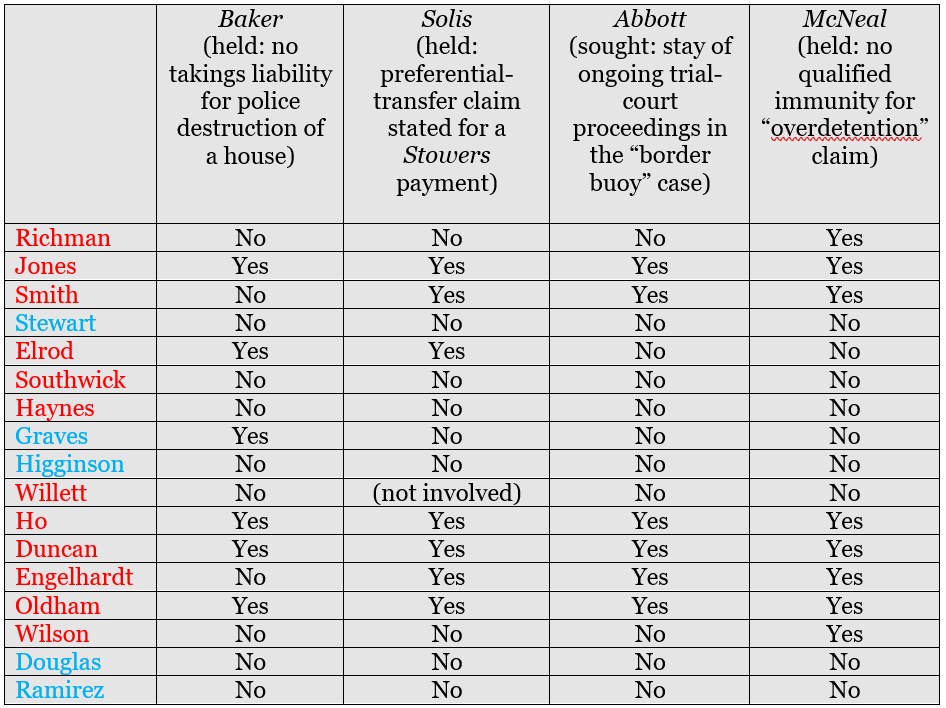 Judges Jones, Ho, and Oldham voted “yes” for review of each of these four cases. Judges Southwick, Haynes, Higginson, Douglas, and Ramirez voted “no” for review of each of these four cases.
Judges Jones, Ho, and Oldham voted “yes” for review of each of these four cases. Judges Southwick, Haynes, Higginson, Douglas, and Ramirez voted “no” for review of each of these four cases.
 The contract between Catalyst (a consulting firm) and CBS (an equipment-rental company), required payment of a substantial fee if CBS satisfied the contract’s requirements as to a “Transaction.” The Fifth Circuit held that the contract supplanted the “procuring cause doctrine” recognized by Texas law as a default rule for such business situations, and further held that under the contract, Catalyst had made the required showing to recover its fee. Catalyst Strategic Advisors LLC v. Three Diamond Capital SBC LLC, No. 23-20030 (Feb. 22, 2024).
The contract between Catalyst (a consulting firm) and CBS (an equipment-rental company), required payment of a substantial fee if CBS satisfied the contract’s requirements as to a “Transaction.” The Fifth Circuit held that the contract supplanted the “procuring cause doctrine” recognized by Texas law as a default rule for such business situations, and further held that under the contract, Catalyst had made the required showing to recover its fee. Catalyst Strategic Advisors LLC v. Three Diamond Capital SBC LLC, No. 23-20030 (Feb. 22, 2024).
 Aggrieved creditors argued that a recent Supreme Court opinion, which held that section 363(b) of the Bankruptcy Code was not jurisdictional (and could thus be waived), also impacted the scope of that statute when it applied. The Fifth Circuit rejected that argument in Swiss Re v. Fieldwood Energy, stating: “We perceive no narrowing of the effect of Section 363(b) other than to clarify that a party can lose the benefit of its terms.” No. 23-20104 (Feb. 20, 2024). From there, the Court found that the creditors’ appeal was moot because a stay had not been obtained, and the issues presented did not relate to anything left open by the bankruptcy plan.
Aggrieved creditors argued that a recent Supreme Court opinion, which held that section 363(b) of the Bankruptcy Code was not jurisdictional (and could thus be waived), also impacted the scope of that statute when it applied. The Fifth Circuit rejected that argument in Swiss Re v. Fieldwood Energy, stating: “We perceive no narrowing of the effect of Section 363(b) other than to clarify that a party can lose the benefit of its terms.” No. 23-20104 (Feb. 20, 2024). From there, the Court found that the creditors’ appeal was moot because a stay had not been obtained, and the issues presented did not relate to anything left open by the bankruptcy plan.
(The illustration is from DALL-E, I asked it to illustrate the bankruptcy concept of statutory mootness, and it came up with that image, for no reason that I can ascertain. I offer it to you as a good example of generative AI doing something that is both very sophisticated and very weird.)
 After the Texas Supreme Court answered a certified question about an arcane Texas limitations-tolling statute, the Fifth Court applied that answer in a later case presenting the same issue, Bullock v. UT-Arlington:
After the Texas Supreme Court answered a certified question about an arcane Texas limitations-tolling statute, the Fifth Court applied that answer in a later case presenting the same issue, Bullock v. UT-Arlington:
“The state trial court dismissed her case on June 8, 2020, for lack of jurisdiction. The dismissal was affirmed by the state appellate court on May 20, 2021. The appellate court’s plenary power expired on July 19, 2021. Under the Texas Supreme Court’s interpretation of Section 16.064(a)(2), Plaintiff had sixty days from July 19, 2021, in which she could refile her action in a court of proper jurisdiction. Plaintiff filed this instant lawsuit on July 16, 2021, before the state appellate court’s plenary power expired and well within the sixty-day grace period.”
No. 22-10013 (Feb. 15, 2024) (citations omitted).
 Shaw v. Restoration Hardware, Inc. carefully describes the unique heritage of Louisiana law, and then reached a holding well known to the common law:
Shaw v. Restoration Hardware, Inc. carefully describes the unique heritage of Louisiana law, and then reached a holding well known to the common law:
“By Shaw’s own allegations, the alleged contract was conditioned on RH wanting to use the at-issue artisans to produce nonlicensed designs and the outcome of the parties’ future negotiations regarding compensation. Because the at-issue agreement left the terms of potential compensation “wide open” to future negotiation, RH and Shaw never entered into an enforceable contract.”
No. 22-30277 (Feb. 15, 2024).
The recent vote by the full court about a stay in U.S. v. Abbott, as well as votes to deny en banc review of Baker (a takings case about police destruction of a home) and Solis (holding that a preferential-transfer claim was stated as to a Stowers-related payment) provide an unusual snapshot of the full court’s views on multiple issues at the same time. The below chart summarizes those votes (a “yes” vote is for en banc review or issuance of a stay, as appropriate):
In an opinion reversing the denial of a TCPA motion to dismiss, the Texas Supreme Court made a helpful observation for the legal blogging community:
[A]nyone who appreciates lawyerly precision has probably read plenty of news stories about legal affairs that gloss over lawyerly distinctions or contain inadvertent mischaracterizations of legal or procedural concepts. These journalistic imprecisions are not to be applauded, and they certainly can mislead the average reader in some cases. But errors of law by those reporting on the law are not automatically actionable as defamation.
Polk County Publ. Co. v. Coleman, No. 22-0103 (Tex. Feb. 16, 2024).
In United States v. Abbott, Texas contends that the Rio Grande is not navigable, which allows it to place a floating barrier in the river to deter navigation. After a Fifth Circuit panel affirmed the district court’s injunction against the barrier, the Court voted to take the case en banc, after which the district court placed the underlying case on a rapid schedule. Texas sought a stay, which the en banc Court denied for a variety of reasons:
 A litigation trust, created as part of a bankruptcy plan confirmation, sued Raymond James. The trust asserted claims that had been assigned to the trust by aggrieved bondholders for the bankrupt entity, who contended that they had been misled about the bonds by Raymond James. (Remarkably, $300 million in bonds were sold in connection with a facility in rural Lousiana that would have refined raw wood into specialized fuel pellets.)
A litigation trust, created as part of a bankruptcy plan confirmation, sued Raymond James. The trust asserted claims that had been assigned to the trust by aggrieved bondholders for the bankrupt entity, who contended that they had been misled about the bonds by Raymond James. (Remarkably, $300 million in bonds were sold in connection with a facility in rural Lousiana that would have refined raw wood into specialized fuel pellets.)
In defense, Raymond James cited an indemnity agreement that it made with the debtor pre-bankruptcy. The Fifth Circuit affirmed the lower courts’ conclusion that the plan barred Raymond James from defending with that agreement. The Court said:
- Notice. “Even though [Debtor] failed to list Raymond James as a creditor when it filed for bankruptcy, Raymond James is nevertheless subject to the confirmation plan because of its actual knowledge of the underlying proceedings.”
- Plan. “Even if Raymond James was not subject to the plan, [Debtor] no longer exists, and neither the bondholders nor post-confirmation entity are its successors-in-interest.”
Raymond James & Assoc. v. Jalbert, No. 23-30040 (Jan. 30, 2024).
 An explosion on the M/V FLAMINIA (right) led to a $200 million arbitration award, which in turn led to an action to confirm that award in New Orleans federal court. The Fifth Circuit reversed for a lack of personal jurisdiction, concluding:
An explosion on the M/V FLAMINIA (right) led to a $200 million arbitration award, which in turn led to an action to confirm that award in New Orleans federal court. The Fifth Circuit reversed for a lack of personal jurisdiction, concluding:
- Forum. “When assessing personal jurisdiction in a confirmation action under the New York Convention, a Convention, a federal court should consider contacts related to the parties’ underlying dispute and not only contacts related to the arbitration proceeding itself. That holding aligns our court with every other circuit to address this issue.”
- Waiver. Unlike the facts of an earlier case involving a “letter of understanding,” the defendant’s LOU in tihs case said that it was “given without prejudice to any and all rights or defenses MSC, its agents or affiliates have or may have in the Proceedings.”
- Contacts. “[T]he dispute’s sole contact with the forum—the DVB’s shipping from the Port of New Orleans—did not occur as a result of MSC’s ‘own choice.’ … [The fact that the DVB was loaded onto the FLAMINIA in New Orleans was the result of “the unilateral activity” of other parties, not MSC.” (citations omitted).
No. 22-30808 (Jan. 29, 2024).
 The trademark-infringement issue in Rolex Watch USA, Inc. v Beckertime, LLC turned on whether the customary “digits-of-confusion” analysis should have been augmented by additional considerations involving the refurbishment of trademarked products. The Fifh Circuit agreed with the district court’s treatment of the issue:
The trademark-infringement issue in Rolex Watch USA, Inc. v Beckertime, LLC turned on whether the customary “digits-of-confusion” analysis should have been augmented by additional considerations involving the refurbishment of trademarked products. The Fifh Circuit agreed with the district court’s treatment of the issue:
Champion instructs that a reseller may utilize the trademark of another, so long as it involves nothing more than a restoration to the original condition, and not a new design. In that case, “[f]ull disclosure gives themanufacturer all the protection to which he is entitled.” Here, BeckerTime does more than recondition or repair vintage Rolex watches. As the district court found, BeckerTime produced “modified watches,” with “added diamonds,” “aftermarket bezels,” and aftermarket bracelets or straps. It found that the watches sold by BeckerTime were “materially different than those sold by Rolex.” In fact, the district court found that Rolex has never sold watches matching the descriptions provided by BeckerTime. Unlike the plugs in Champion that “are nevertheless Champion plugs and not those of another make,” BeckerTime’s watches are of another make and cannot properly be called genuine Rolex watches. … Champion’s misnomer exception properly applied to the facts of this case and the district court did not err by conducting a traditional digits of confusion analysis.
No. 22-10866 (Jan. 27, 2024) (citations omitted).
This Instagram video with fonts talking to each other is really funny. Thanks to my law partner Mary Nix for sending it my way.
 Rolex Watch USA, Inc. v Beckertime, LLC affirmed a finding of infringement, while also affirming the trial court’s finding that laches precluded a disgorgement award:
Rolex Watch USA, Inc. v Beckertime, LLC affirmed a finding of infringement, while also affirming the trial court’s finding that laches precluded a disgorgement award:
The district court concluded that at a minimum, Rolex’s agent “should have known about BeckerTime in 2010, ten years prior to the filing of the lawsuit, and no later than 2013 when [a Rolex employee] wrote that BeckerTime watches were junk.” … On appeal, Rolex offers no justification for the delay, instead arguing that BeckerTime failed to show prejudice. But the record supports that the ten years of permitted sales enabled BeckerTime to build up a successful business that it would not otherwise have invested in absent Rolex’s delay in filing suit. This is clear prejudice.
No. 22-10866 (Jan. 26, 2024).
 After a massive computer failure, Southwest sued one of its cyber risk insures about five categories of damages (vouchers, frequent-flier miles, etc. used to mitigate the effects of the outage). The district court ruled against Southwest, describing the losses as arising from “purely discretionary” decisions.
After a massive computer failure, Southwest sued one of its cyber risk insures about five categories of damages (vouchers, frequent-flier miles, etc. used to mitigate the effects of the outage). The district court ruled against Southwest, describing the losses as arising from “purely discretionary” decisions.
The Fifth Circuit reversed. Acknowledging that the policy covered “all Loss … that in Insured incurs … solely as a result of a System Failure,” the Court reasoned:
Here, Liberty argues that the system failure cannot be the sole cause of Southwest’s claimed costs because the “independent” and “more direct” cause of those losses was Southwest’s decision to incur them. But those decisions can only be independent, sole causes of the costs if they were the precipitating causes of the costs. The decisions, like the infection in Wright or the medical complications in Wells, were not precipitating causes that competed with the system failure, but links in a causal chain that led back to the system failure.
Accordingly, the Court reversed and remanded. Southwest Airlines Co. v. Liberty Ins. Underwriters, Inc., No. 22-10942 (Jan. 16, 2024). The Court noted that “[t]he parties concede that there are no cases directly on point in the context of business interruption insurance.”
A challenge to the sale of a preference claim was rejected by the Fifth Circuit in Briar Capital v. Remmert: “[P]reference actions may be sold pursuant to 11 U.S.C. § 363(b)(1) because they are property of the estate under 11 U.S.C. §§ 541(a)(1) and (7). ” No. 22-20536 (Jan. 22, 2024).
By a 9-7 margin, the full Fifth Circuit held that qualified immunity barred the wrongful-arrest claims of a Laredo “citizen-journalist.” Villarreal v. City of Laredo, No. 20-40359 (Jan. 23, 2024). The breakdown of votes appears below:
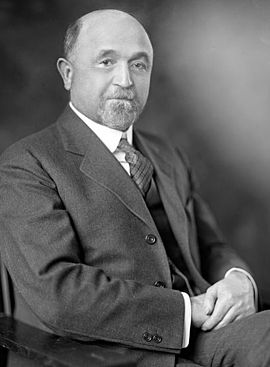 To the right appears William Humphrey, who like William Marbury, is known to history as the subject matter of a famous opinion. President Roosevelt’s efforts to remove Humphrey from the Federal Trade Commission led to the 1935 Supreme Court case of Humphrey’s Executor v. United States, about constitutional limits on the structure of administrative agencies. (Humphrey died during the litigation so his executor continued with the matter). In Consumers’ Research v. CPSC, the Fifth Circuit summarized the current state of the issue addressed by Humphrey’s Executor as follows:
To the right appears William Humphrey, who like William Marbury, is known to history as the subject matter of a famous opinion. President Roosevelt’s efforts to remove Humphrey from the Federal Trade Commission led to the 1935 Supreme Court case of Humphrey’s Executor v. United States, about constitutional limits on the structure of administrative agencies. (Humphrey died during the litigation so his executor continued with the matter). In Consumers’ Research v. CPSC, the Fifth Circuit summarized the current state of the issue addressed by Humphrey’s Executor as follows:
The Humphrey’s exception traditionally “has applied only to multimember bodies of experts.” Sitting en banc, we recently described the exception like this: Congress’s decision “limiting the President to ‘for cause’ removal is not sufficient to trigger a separation-of-powers violation.” Instead, for-cause removal creates a separation-of-powers problem only if it “combine[s]” with “other independence-promoting mechanisms” that “work[] together” to “excessively insulate” an independent agency from presidential control.
The plaintiffs in this case argue that the Supreme Court recently upended this framework in Seila Law. In their view, that 2020 decision held that for-cause removal always creates a separation-of-powers violation—at least if the agency at issue exercises substantial executive power (which nearly all agencies do). This is so, the plaintiffs argue, even if for-cause removal is the only structural feature insulating an agency from total presidential control. We do not read Seila Law so broadly. On the contrary, and as in Free Enterprise Fund, the Supreme Court in Seila Law left the Humphrey’s Executor exception “in place.”
No. 22-40328 (Jan. 17, 2024) (citations and footnote omitted).
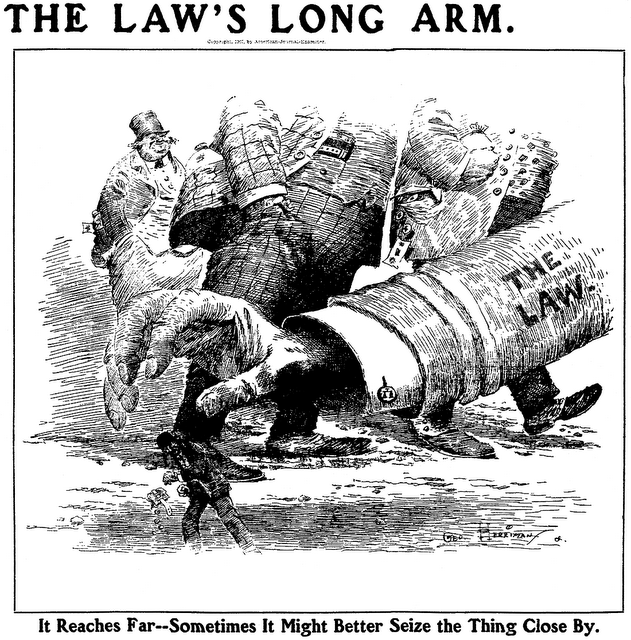 After carefully reviewing what arguments were properly before it, the Fifth Circuit went on to hold in Shambaugh & Son, LP v. Steadfast Ins. Co. that the plaintiff had not established jurisdiction over an out-of-state insurer: “Steadfast could not have reasonably anticipated being haled into court in Texas simply because Shambaugh’s records were kept in an office (in Austin) maintained by a division (Northstar) of a subsidiary (Shambaugh).” No. 23-50004 (Jan. 18, 2024). The Court noted the insurer’s involvement with other Texas litigation but found those contacts irrelevant and inadequate to establishe jurisdiction.
After carefully reviewing what arguments were properly before it, the Fifth Circuit went on to hold in Shambaugh & Son, LP v. Steadfast Ins. Co. that the plaintiff had not established jurisdiction over an out-of-state insurer: “Steadfast could not have reasonably anticipated being haled into court in Texas simply because Shambaugh’s records were kept in an office (in Austin) maintained by a division (Northstar) of a subsidiary (Shambaugh).” No. 23-50004 (Jan. 18, 2024). The Court noted the insurer’s involvement with other Texas litigation but found those contacts irrelevant and inadequate to establishe jurisdiction.
 Shambaugh & Son, LP v. Steadfast Ins. Co. presents a dispute about personal jurisdiction in an insurance-coverage case. The Fifth Circuit began by identifying the arguments properly before it, noting the distinction between waiver and forfeiture:
Shambaugh & Son, LP v. Steadfast Ins. Co. presents a dispute about personal jurisdiction in an insurance-coverage case. The Fifth Circuit began by identifying the arguments properly before it, noting the distinction between waiver and forfeiture:
“The terms waiver and forfeiture—though often used interchangeably by jurists and litigants—are not synonymous.” “Whereas forfeiture is the failure to make the timely assertion of a right, waiver is the ‘intentional relinquishment or abandonment of a known right.’”
Applying those standards, the Court observed, inter alia:
- “… if complaint allegations alone prevented subsequent forfeiture, then
it is difficult to imagine when any claim or argument could ever be forfeited”; - “… if including a claim in a complaint fails to preserve that claim … then a fortiori attaching an exhibit to a pleading does not insulate arguments derived from that exhibit“;
- A statement about choice of law did not avoid forfeiture when that “statement is nested within a broader discussion about forum shopping”;
- An argument about a specific statute was forfeited, and was not saved by a broader discussion about minimum contacts, when the lower-court briefing did not cite that statute and the statutory argument “is narrower and conceptually distinct from [appellant’s] other minimum contacts arguments.”
No. 23-50004 (Jan. 18, 2024).
In Book People, Inc. v. Wong, the Fifth Circuit reviewed the constitutionality of the Texas “READER” law, which “requires school book vendors who want to do business with Texas public schools to issue sexual-content ratings for all library materials they have ever sold (or will sell), flagging any materials deemed to be ‘sexually explicit’ or ‘sexually relevant’ based on the materials’ depictions of or references to sex.”
The Court held that the law violated the First Amendment, in that the ratings required by the law were not government speech, and fell within no exception to the rule against “compelled speech”:
- They did not come within the “government operations” exception because they “go[] beyond a mere disclosure of demographic or similar factual information.”
- Similarly, they were not a permissible commercial-speech regulation because “[b]alancing a myriad of factors that depend on community standards is anything but the mere disclosure of factual information.
No. 23-50668 (Jan. 17, 2024).
Please join the Dallas Bar Association Appellate Section at noon on Thursday, January 18, for a lunch presentation by me. I’ll be speaking on trends and cases to know from the past year in the U.S. Court of Appeals for the Fifth Circuit and the Fifth District Court of Appeals. I’ve done a similar presentation around this time of year for a few years now.
Here’s my PowerPoint. This CLE will be in-person at the Arts District Mansion, 2101 Ross in downtown Dallas.
 State of Louisiana v. U.S. Dep’t of Energy is an instructive analysis of basic administrative rulemaking concepts, in the unlikely setting of the regulation of washing machines and dishwashers. The substance will be discussed in future posts.
State of Louisiana v. U.S. Dep’t of Energy is an instructive analysis of basic administrative rulemaking concepts, in the unlikely setting of the regulation of washing machines and dishwashers. The substance will be discussed in future posts.
For today, in the “who knew?” department, the plaintiffs were several states, and their standing was based on the substantial purchases that those states made of those appliances. An affidavit quoted in the opinion, for example, describes the purchasing habits of the Montana Highway Patrol as to appliances for its bunkhouses. No. 22-60146 (Jan. 8, 2023).
The issue in Stewart v. Gruber was the exclusion of an untimely expert report; among other points made in affirming, the Fifth Circuit noted:
Plaintiffs fail to identify any precedent barring courts from considering whether the proponent of an untimely expert report declined an opportunity to cure such untimeliness by refusing to join a motion to continue that would have extended deadlines for both parties and therefore lessened any prejudice to the opposing party. Put another way, Plaintiffs were only willing to have extra time for them, not a similar extension for the Defendants who would need to, of course, have an expert that addressed the Plaintiffs’ expert. Such a notion on the part of the Plaintiffs was totally improper.
No. 23-30129 (Dec. 14, 2023, unpublished).
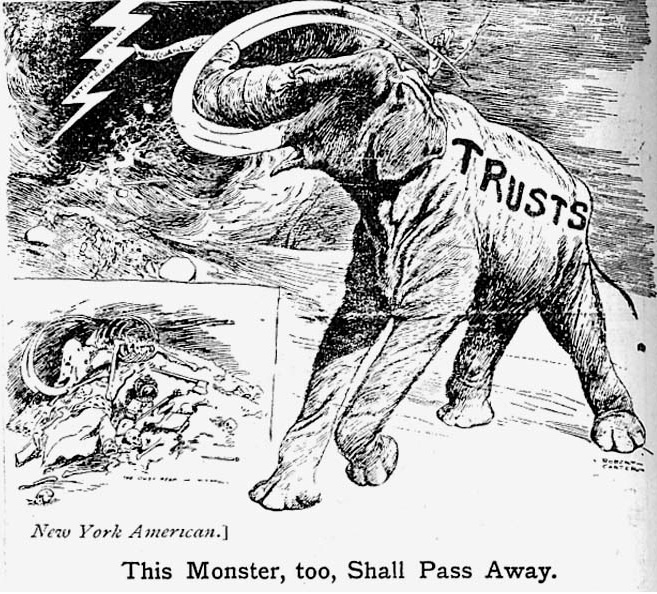 Illumina, Inc. v. FTC provides a comprehensive review of every aspect of an FTC antitrust decision about a merger:
Illumina, Inc. v. FTC provides a comprehensive review of every aspect of an FTC antitrust decision about a merger:
To sum up, Illumina’s constitutional challenges to the FTC’s authority are foreclosed by binding Supreme Court precedent, and substantial evidence supported the Commission’s conclusions that (1) the relevant market is the market for the research, development, and commercialization of MCED tests in the United States; (2) Complaint Counsel carried its initial burden of showing that the Illumina-Grail merger is likely to substantially lessen competition in that market under either the ability-and-incentive test or looking to the Brown Shoe factors; and (3) Illumina had not identified cognizable efficiencies to rebut the anticompetitive effects of the merger. However, in considering the Open Offer, the Commission used a standard that was incompatible with the plain language of the Clayton Act.
No. 23-60167 (Dec. 15, 2023). The “Open Offer” issue involved a dispute about precisely where an agreement, entered to stave off competition-based challenges to this merger, should be considered in the context of the relevant burdens of proof.
 The concurrent causation doctrine precluded recovery under an insurance policy for alleged hurricane damage in Shree Rama, LLC v. Mt. Hawley Ins. Co.:
The concurrent causation doctrine precluded recovery under an insurance policy for alleged hurricane damage in Shree Rama, LLC v. Mt. Hawley Ins. Co.:
Shree Rama did not carry its burden under the concurrent causation doctrine. The policy issued by Mt. Hawley explicitly covers damage from wind and explicitly excludes damage from wear and tear. Viewing the facts in the light most favorable to Shree Rama, it is possible that some damage to the hotel roof came from Hurricane Hanna and some from wear and tear. But the concurrent causation doctrine requires Shree Rama to provide the jury with “a reasonable basis” for allocating the damage between wind and wear and tear. . Shree Rama provided no reasonable basis. To the contrary, Shree Rama admitted at the district court level that its causation expert “could not definitively attribute [specific damages to the roof] to Hurricane Hanna when deposed.” Without a basis for allocating damages between covered and non- covered causes, Mt. Hawley was entitled to summary judgment.
No. 23-40123 (Dec. 14, 2023) (citations omitted).
 Smith v. Edwards examined whether a preliminary injunction should be vacated when the dispute became moot on appeal:
Smith v. Edwards examined whether a preliminary injunction should be vacated when the dispute became moot on appeal:
“[H]istorically, the established rule was to vacate the judgment if the case became moot on appeal.” However, in U.S. Bancorp Mortgage Co. v. Bonner Mall Partnership, “[t]he Supreme Court made clear and emphasized that vacatur is an ‘extraordinary’ and equitable remedy . . . to be determined on a case-by-case basis.” One principal consideration “is whether the party seeking relief from the judgment . . . caused the mootness by voluntary action.” “Thus, for example, ‘vacatur must be granted where mootness results from the unilateral action of the party who prevailed in the [district] court.’”
The equitable principles espoused in U.S. Bancorp and recognized by Staley apply in this case. Though Defendants complied with the preliminary injunction by removing the youths from BCCY-WF, they did not cause mootness by voluntary action. And though the injunction automatically expired under the PLRA, Plaintiffs could have sought an extension to extend its duration. . Having been “frustrated by the vagaries of circumstance, [Defendants] ought not in fairness be forced to acquiesce in the judgment.
No. 23-30634 (Dec. 19, 2023).
Start the New Year out right with “Get the Last Word in an Effective Reply Brief,” which I recently co-wrote for the Bar Association of the Fifth Federal Circuit with my skillful colleague Campbell Sode – available here along with many other valuable practice pointers by members of that great bar association. 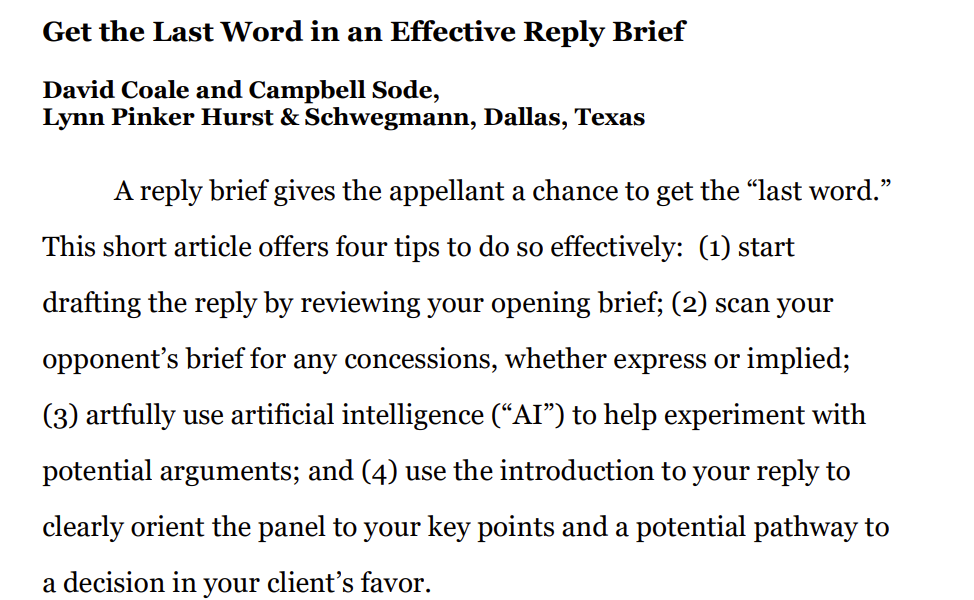
 Reiterating a recent holding in a near-identical lawsuit, in Bourque v. State Farm the Fifth Circuit rejected the certification of a class of insureds who were dissatisfied with the amount paid by State Farm for their wrecked cars:
Reiterating a recent holding in a near-identical lawsuit, in Bourque v. State Farm the Fifth Circuit rejected the certification of a class of insureds who were dissatisfied with the amount paid by State Farm for their wrecked cars:
Plaintiffs contended that they had met this standard because any class member who was paid less than the [National Automobile Dealers’ Association] value of their vehicle necessarily received less than [Actual Cash Value] and therefore suffered an injury. But we rejected that premise, explaining that NADA value was just one of many statutorily acceptable methods for calculating ACV, and therefore pinning ACV to NADA value constituted an impermissibly arbitrary choice of a liability model.
No. 22-30126 (Dec. 22, 2023).
 The Bar Association of the Fifth Federal Circuit is the bar association to belong to if you’re interested in the work of the U.S. Court of Appeals for the Fifth Circuit. More information about member benefits is detailed on the BAFFC’s website. One of those benefits is a terrific set of short (c. 500 word) articles about appellate practice (here’s an example that I did about a year ago on oral-argument preparation).
The Bar Association of the Fifth Federal Circuit is the bar association to belong to if you’re interested in the work of the U.S. Court of Appeals for the Fifth Circuit. More information about member benefits is detailed on the BAFFC’s website. One of those benefits is a terrific set of short (c. 500 word) articles about appellate practice (here’s an example that I did about a year ago on oral-argument preparation).
Please consider writing one yourself! A link will be emailed out several times to the BAFFC’s thousands of members, as part of its daily updates about recent decisions, and it’ll be available to the membership online as part of the full collection of these pieces. Contact BAFFC administrator Mary Douglas at mary@baffc.org!
 The National Court Reporters Association recently published a fascinating “white paper” about “ethical and legal issues related to the use of artificial intelligence … and digital audio recording of legal proceedings.” It’s succinct, thoughtful, and raises questions relevant to just about any area of law practice or court administration that’s touched by the influence of generative AI and related technologies.
The National Court Reporters Association recently published a fascinating “white paper” about “ethical and legal issues related to the use of artificial intelligence … and digital audio recording of legal proceedings.” It’s succinct, thoughtful, and raises questions relevant to just about any area of law practice or court administration that’s touched by the influence of generative AI and related technologies.
A Fifth Circuit panel applied circuit precedent to reject a liablity claim involving Snapchat in Doe v. Snap, Inc., No. 22-20543 (June 26, 2023), stating: “Parties complaining that they were harmed by a Web site’s publication of user-generated content . . . may sue the third-party user who generated the content, but not the interactive computer service that enabled them to publish the content online.” By a one-vote margin, the full court denied en banc review, as follows (notably, Edith Jones voted with the court’s Democrats to not review the panel opinion):
The mifepristone litigation – recently selected by Law360 as the most notable case of 2023 from the Fifth Circuit – will be heard by the Supreme Court. While it did not grant the petition about the original approval of mifepristone, a wide range of significant issues–including important standing questions, and the modern viability of the Comstock Act–are ripe for decision as part of the granted petitions:
Whatever your views of the remarkable civil-rights issue presented by Wilson v. Midland County (the intersection between some highly technical immunity rules and the bizarre injustice of a county employee working simultaneously for the prosecution and the courts), one can admire the deft prose of Jude Willett’s opinion: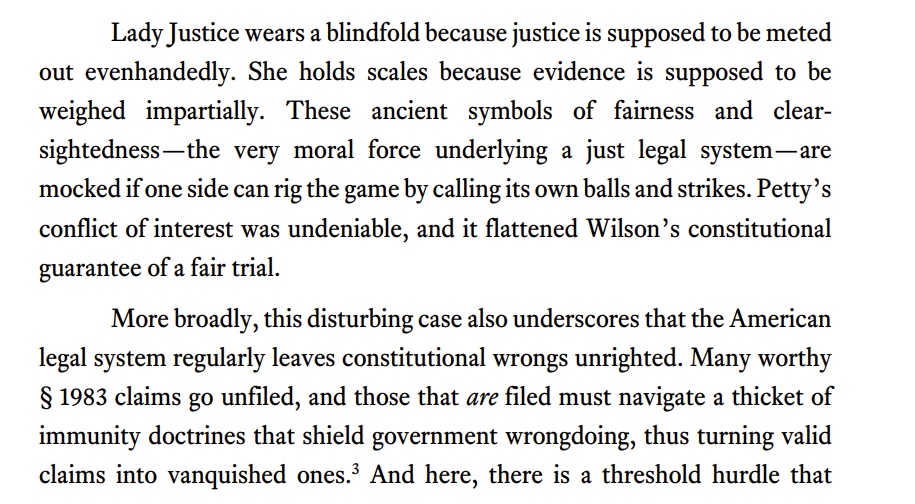
The Fifth Circuit reminded about the basics of issue statements in Smith v. Delta Charter Group, Inc.:
Delta also forfeited its argument that the district court should have instead applied Rule 54(b). Delta didn’t include this argument in its “Statement of the Issue” or in the body of its opening brief—rather, Delta relegated it to a footnote. We have repeatedly cautioned that arguments appearing only in footnotes are “insufficiently addressed in the body of the brief” and are thus forfeited. Delta’s Rule 54(b) argument meets this predictable fate.
No. 23-30063 (Dec. 13, 2023). Note that this is NOT a criticism of the “citational footnote”–and in fact, the concept of the citational footnote rejects this sort of stealthy, footnote-only legal argument.
“Here, ‘all parties have agreed from the beginning of this case that Houston’s voter registration provisions governing circulators’ are unconstitutional. The City also agreed that it ‘would and could not enforce the provisions.’ The City has repeatedly and consistently emphasized its agreement with the plaintiffs throughout this suit. Such faux disputes do not belong in federal court.”
Pool v. City of Houston, No. 22-20491 (Dec. 11, 2023) (citations omitted).
 The defendant in a boat-collision case challenged the admission of an accident reconstruction; the plaintiff argued that this point was not preserved. The Fifth Circuit concluded that the defendant had preserved some grounds for objection in a pretrial motion to exclude, a proposed pretrial order, and another pretrial filing about evidence. Thus: “[Defendant’s] pretrial objections preserved the arguments contained in Balkan’s motion in limine concerning authrntication and expert testimony. But neither he nor Balkan argued below that the reconstruction was inadmissible summary judgment evidence. That argument thus was not preserved for appeal.” Marquette Transp. Co. v. Navigation Maritime Bulgare JSC, No. 22-30261 (Dec. 4, 2023).
The defendant in a boat-collision case challenged the admission of an accident reconstruction; the plaintiff argued that this point was not preserved. The Fifth Circuit concluded that the defendant had preserved some grounds for objection in a pretrial motion to exclude, a proposed pretrial order, and another pretrial filing about evidence. Thus: “[Defendant’s] pretrial objections preserved the arguments contained in Balkan’s motion in limine concerning authrntication and expert testimony. But neither he nor Balkan argued below that the reconstruction was inadmissible summary judgment evidence. That argument thus was not preserved for appeal.” Marquette Transp. Co. v. Navigation Maritime Bulgare JSC, No. 22-30261 (Dec. 4, 2023).
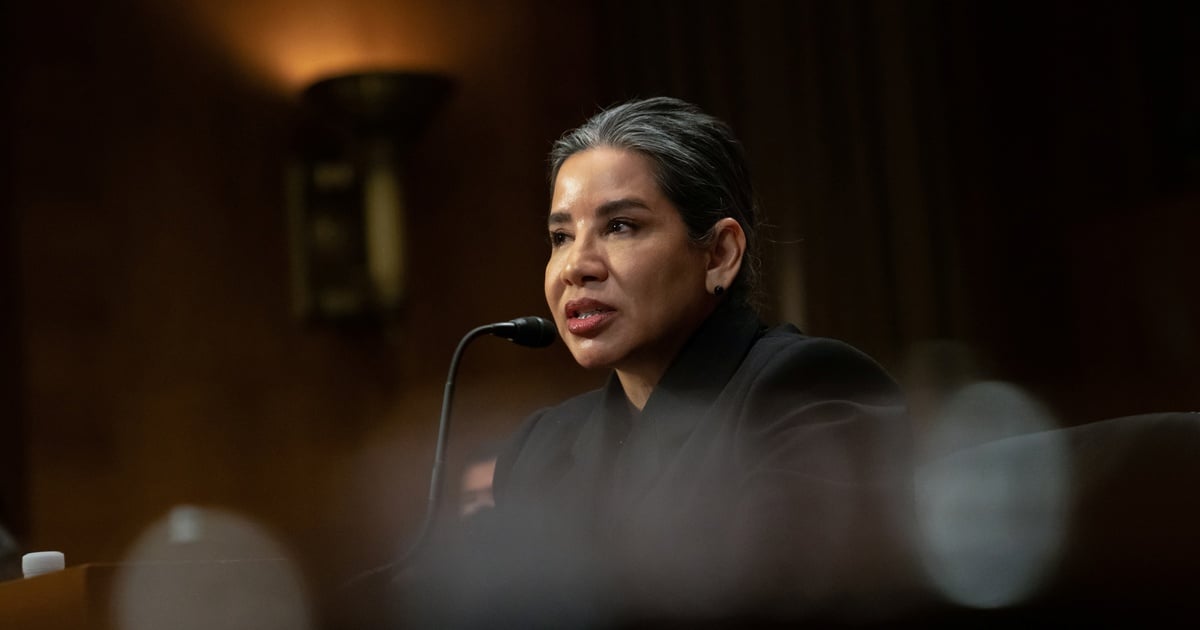 The Senate recently confirmed Hon. Irma Ramirez of Dallas as a judge on the Fifth Circuit. When she takes office the Court will again be at a full complement of active judges.
The Senate recently confirmed Hon. Irma Ramirez of Dallas as a judge on the Fifth Circuit. When she takes office the Court will again be at a full complement of active judges.
 Eschewing exotic constitutional issues about a state’s rights to engage in military activity, the Fifth Circuit affirmed a preliminary injunction requiring Texas to remove an obstacle from the Rio Grande, citing the federal government’s exclusive authority as to navigable waters. United States v. Abbott, No. 23-50632 (Dec. 1, 2023). A dissent had a different view; some serious consideration of en banc review is likely.
Eschewing exotic constitutional issues about a state’s rights to engage in military activity, the Fifth Circuit affirmed a preliminary injunction requiring Texas to remove an obstacle from the Rio Grande, citing the federal government’s exclusive authority as to navigable waters. United States v. Abbott, No. 23-50632 (Dec. 1, 2023). A dissent had a different view; some serious consideration of en banc review is likely.
 After resolving threshold matters about justiciability, the Fifth Circuit rejected facial First Amendment challenges to Texas laws about the use of drones in Nat’l Press Photographers Ass’n v. McCraw, as follows:
After resolving threshold matters about justiciability, the Fifth Circuit rejected facial First Amendment challenges to Texas laws about the use of drones in Nat’l Press Photographers Ass’n v. McCraw, as follows:
- “No-Fly” provisions. “Plaintiffs’ First Amendment challenge to the No-Fly provisions falters because ‘only conduct that is “inherently expressive” is entitled to First Amendment protection.’ The operation of a drone is not inherently expressive—nor is it expressive to fly a drone 400 feet over a prison, sports venue, or critical infrastructure facility. And nothing in the No-Fly provisions has anything to do with speech or expression. These are flight restrictions, not speech restrictions.” (footnotes omitted, emphasis in original).
- “Surveillance” provisions (which prohibit the use of a drone to capture images “with the intent to conduct surveillance ….”). “Though most drone operators harbor no harmful intent, drones have singular potential to help individuals invade the privacy rights of others because they are small, silent, and able to capture images from angles and altitudes no ordinary photographer, snoop, or voyeur would be able to reach. … The law is also tailored to bar only surveillance
that could not be achieved through ordinary means …. We therefore conclude that the law survives intermediate scrutiny.”
No. 22-50337 (Oct. 23, 2023). The opinion was later revised.
An antitrust case in Tennessee recently produced a remarkably contentious dispute about the definition of “double spacing,” as deftly summarized in this “Above the Law” article titled “Heated Litigation Fight Over Double Spacing Ends in Judge Telling Everyone to Shut Up.” While the dispute was picayune, the discussion of just what exactly “double spacing” means is interesting background for a modern word-processing feature that we seldom stop and think about. Thanks to my law partner Chris Schwegmann for flagging this for me.
 A series of cases about the EPA’s regulation of small refineries led to a disagreement about Circuit venue over this kind of administrative-agency challenge. A majority appled a two-part test focused on whether the agency action was “nationally applicable”; the dissent rejected the majority’s analysis as inconsistent with statutory text, purpose, and structure. No. 22-60266 etc. (Nov. 22, 2023).
A series of cases about the EPA’s regulation of small refineries led to a disagreement about Circuit venue over this kind of administrative-agency challenge. A majority appled a two-part test focused on whether the agency action was “nationally applicable”; the dissent rejected the majority’s analysis as inconsistent with statutory text, purpose, and structure. No. 22-60266 etc. (Nov. 22, 2023).
 The “Lyme Wars” are an ongoing medical controversy about the diagnosis and treatment of Lyme disease. Absent Supreme Court review, one front in those “wars” ended in Torrey v. Infectious Diseases Society of America, in which the Fifth Circuit affirmed the dismissal of defamation claims related to statements in a medical journal: “[T[he district court did not err in holding that IDSA’s Guidelines statements about chronic Lyme disease constitute nonactionable medical opinions.” No. 22-40728 (Nov. 16, 2023).
The “Lyme Wars” are an ongoing medical controversy about the diagnosis and treatment of Lyme disease. Absent Supreme Court review, one front in those “wars” ended in Torrey v. Infectious Diseases Society of America, in which the Fifth Circuit affirmed the dismissal of defamation claims related to statements in a medical journal: “[T[he district court did not err in holding that IDSA’s Guidelines statements about chronic Lyme disease constitute nonactionable medical opinions.” No. 22-40728 (Nov. 16, 2023).
 The latest installment in the “Bar Wars” litigation about speech by compulsory bar associations is Boudreaux v. Louisiana State Bar Ass’n, holding:
The latest installment in the “Bar Wars” litigation about speech by compulsory bar associations is Boudreaux v. Louisiana State Bar Ass’n, holding:
[T]he majority of speech Boudreaux objects to is germane. Speech can be germane even if it is “controversial and ideological.” But the LSBA crossed the line when it promoted purely informational articles absent any tailoring to the legal profession. That includes the LSBA’s tweet about student-loan reform and its promotion of the History.com article through a pride flag icon. Advancing generic political and social messages in those ways violates the First Amendment rights of the LSBA’s dissenting members.
No. 22-30564 (Nov. 13, 2023).
 The question in Elmen Holdings, LLC v. Martin Marietta Mat’ls, Inc. was whether a gravell-mining lease had terminated. The district court included that it had been terminated, and the appellant’s first issue was that the court’s analysis went too far under the “party-presentation” principle — a concept given new life and relevance by United States v. Sineneng-Smith, 140 S. Ct. 1575 (2020).
The question in Elmen Holdings, LLC v. Martin Marietta Mat’ls, Inc. was whether a gravell-mining lease had terminated. The district court included that it had been terminated, and the appellant’s first issue was that the court’s analysis went too far under the “party-presentation” principle — a concept given new life and relevance by United States v. Sineneng-Smith, 140 S. Ct. 1575 (2020).
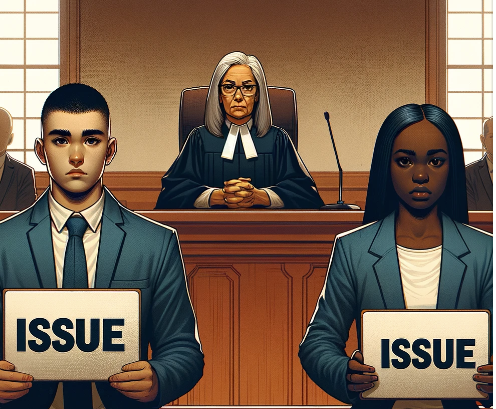 The Fifth Circuit concluded that while the appellant’s argument “had some merit,” the trial court did not go too far:
The Fifth Circuit concluded that while the appellant’s argument “had some merit,” the trial court did not go too far:
“[T]he magistrate judge recommended granting Elmen’s motion for summary judgment because Martin Marietta had been late on several royalty payments. The magistrate judge did not ‘radical[ly] transform[]’ this case to such an extent as to constitute an abuse of discretion; she merely took a different route than Martin Marietta and Elmen had suggested to ;decide . . . questions presented by the parties.’ Therefore, the magistrate judge did not violate the party presentation principle by interpreting the Gravel Lease to terminate automatically upon a missed royalty payment, even if that interpretation was contrary to the parties’ reading of their contract.”
No. 23-20023 (Nov. 15, 2023); cf. United Natural Foods v. NLRB, 66 F.4th 536 (5th Cir. 2023) (majority and dissent disagree about whether a particular line of argument is allowed by the party-presentation principle).
 Anytime Fitness LLC v. Thornhill Bros. Fitness LLC, acknowledging that a bankruptcy debtor may assign or assume an executory contract, provided an important reminder about the extent of that power: “We reiterate our prior holdings: a debtor assuming an executory contract cannot separate the wheat from the chaff. And we make clear that, when a trustee relies on § 365(f) to assign an executory contract in bankruptcy, it must assign the contract in whole, not in part.” No. 22-30757 (Oct. 27, 2023).
Anytime Fitness LLC v. Thornhill Bros. Fitness LLC, acknowledging that a bankruptcy debtor may assign or assume an executory contract, provided an important reminder about the extent of that power: “We reiterate our prior holdings: a debtor assuming an executory contract cannot separate the wheat from the chaff. And we make clear that, when a trustee relies on § 365(f) to assign an executory contract in bankruptcy, it must assign the contract in whole, not in part.” No. 22-30757 (Oct. 27, 2023).
 The Oil Pollution Act provides remedies for the wrongful release of oil into the environment. CERCLA does the same for a number of other pollutants. The issue in Munoz v. Intercontinental Terminals Co., LLC was whether OPA liability extended to a spill that combined oil with other hazardous substances regulated by CERCLA. Based on statutory language and structure, the Fifth Circuit concluded that the OPA did not apply to such a chemical release. No. 22-20456 (Oct. 27, 2023).
The Oil Pollution Act provides remedies for the wrongful release of oil into the environment. CERCLA does the same for a number of other pollutants. The issue in Munoz v. Intercontinental Terminals Co., LLC was whether OPA liability extended to a spill that combined oil with other hazardous substances regulated by CERCLA. Based on statutory language and structure, the Fifth Circuit concluded that the OPA did not apply to such a chemical release. No. 22-20456 (Oct. 27, 2023).
 In an instructive review of a products-liability judgment based on expert testimony and a hotly disputed jury instruction, the Fifth Circuit affirmed in Kim v. American Honda Motor Co.:
In an instructive review of a products-liability judgment based on expert testimony and a hotly disputed jury instruction, the Fifth Circuit affirmed in Kim v. American Honda Motor Co.:
Honda attempts to escape this jury verdict by arguing the district court erred in three ways: by admitting Plaintiffs’ experts, denying its JMOL motion, and denying its proposed instruction about the nonliability presumption. But it is incorrect on all fronts. The Plaintiffs’ experts based their opinions on reliable methodologies and provided relevant, helpful testimony. As such, there was sufficient evidence for the jury to find Honda liable for the Kims’ injuries. The district court’s application of the Texas statutory presumption of nonliability was also faithful to the statutory text, the precedent of Texas, and the precedent of this Court.
No. 22-40790 (Nov. 7, 2023).
 Antero Resoiures Corp. v. C&R Downhole Drilling Inc., an appeal about an $11 million judgment for alleged overbilling in energy production, rejected a second challenge to the plaintiff’s damages calculation in addition to the one discussed yesterday.
Antero Resoiures Corp. v. C&R Downhole Drilling Inc., an appeal about an $11 million judgment for alleged overbilling in energy production, rejected a second challenge to the plaintiff’s damages calculation in addition to the one discussed yesterday.
Specifically, the appellant argued that the expert’s testimony “was deficient because it did not consider what rates competing drillout providers might have paid. Even if the Robertson companies took longer, so the argument goes, if they charged significantly less than other companies, Antero might have ended up paying less than if it had hired someone else.”
The Fifth Circuit rejected this argument for two related resons:
- Legal materiality. “[E]vidence of a competitor’s rate is not necessary to prove out-of pocket damages. To show damages, Antero need only prove that the Robertson companies charged it more than the ‘value [Antero] received.’ By billing Antero more than the services it rendered, Kawcak caused Antero to incur out-ofpocket expenses. That is, Antero paid $150,000,000 in exchange for a certain number of days of work. But because the Robertson companies did not actually work on all of the days they billed, the value of the work Antero received was only $138,877,860. The difference in value is the amount overbilled. No reference to competitors’ rates is needed for that statement to be true.”
- Factual materialty. “[T]he jury was not required to accept Kawcak’s testimony regarding Fortis Energy’s rates. As Antero points out, there are multiple reasons why the jury might not have credited Kawcak’s assertion that Fortis Energy was the only other available drillout provider, and that it would have charged more than the Robertson companies. Kawcak gave the rates strictly from memory, and his credibility was already in question because of his inconsistent answers to previous questions.”
No. 22-10918 (Oct. 31, 2023) (citations omitted).
 Antero Resoiures Corp. v. C&R Downhole Drilling Inc. presented a dispue about the calculation of damages in a case about alleged overbilling in energy production. The Fifth Circuit affirmed against a challenge that the plainitff’s expert was not sufficiently precise, holding:
Antero Resoiures Corp. v. C&R Downhole Drilling Inc. presented a dispue about the calculation of damages in a case about alleged overbilling in energy production. The Fifth Circuit affirmed against a challenge that the plainitff’s expert was not sufficiently precise, holding:
[T]the amount of damages need only be proven “with a reasonable degree of certainty.” Taylor’s testimony calculated Antero’s out-of-pocket damages to a reasonable degree of certainty, especially when viewing the evidence in favor of the verdict. Taylor followed sound analytical methods to determine how long the Robertson companies should have taken to complete the drillout services. He reviewed the hundreds of completion reports and tens of thousands of invoices, accounting for uncontrollable delays and site-specific conditions. Taylor then compared the time spent to the time taken by previous drillout providers and concluded that the Robertson companies took some percentage longer than those companies. Applied to the rates charged by the Robertson companies, Taylor calculated damages in the amount of $11,122,140. That is a perfectly rational way of approximating overbilling.
No. 22-10918 (Oct. 31, 2023) (citation omitted).
 In Chamber of Commerce v. U.S. Sec. & Exch. Comm’n, the Fifth Circuit found that the SEC acted too quickly in enacting a challenged rule, but then allowed it a “do-over” within a specified time:
In Chamber of Commerce v. U.S. Sec. & Exch. Comm’n, the Fifth Circuit found that the SEC acted too quickly in enacting a challenged rule, but then allowed it a “do-over” within a specified time:
The SEC acted arbitrarily and capriciously, in violation of the APA, when it failed to respond to petitioners’ comments and failed to conduct a proper cost-benefit analysis. We recognize that “there is at least a serious possibility that the agency will be able to substantiate its decision given an opportunity to do so.” Short of vacating the rule, we therefore afford the agency limited time to remedy the deficiencies in the rule. Because, for the reasons explained, the SEC’s adoption of the Share Repurchase Disclosure Modernization Rule is arbitrary and capricious, the petition for review is GRANTED, and this matter is REMANDED with direction to the SEC to correct the defects in the rule within 30 days of this opinion. This is a limited remand. This panel retains jurisdiction to consider the decision that is made on remand.
No. 23-60255 (Oct. 31, 2023); but cf. Alliance for Hippocratic Medicine v. U.S. Food & Drug Admin., No. 23-10362 (Aug. 16, 2023).
 In re TikTok, Inc. returns to the ground plowed by In re Volkswagen in 2008 and In re Radmax in 2014: a mandamus petition about the erroneous denial of a motion to transfer venue under 28 USC § 1404(a). In this case (an intellectual-property case brought against TikTok by another Chinese business), The Fifth Circuit noted several missteps by the district court that justified mandamus relief, inter alia:
In re TikTok, Inc. returns to the ground plowed by In re Volkswagen in 2008 and In re Radmax in 2014: a mandamus petition about the erroneous denial of a motion to transfer venue under 28 USC § 1404(a). In this case (an intellectual-property case brought against TikTok by another Chinese business), The Fifth Circuit noted several missteps by the district court that justified mandamus relief, inter alia:
- Relative ease of access to sources of proof–source code. “The district court concluded that the source code was accessible as easily in Texas as in California because one member of the California engineering team with the needed security clearance worked remotely in Irving, Texas. But the court erred by comparing Texas with California when it should have been comparing the Western District of Texas with the Northern District of California.”
- Relative ease of access to sources of proof–people. “Neither the district court nor Meishe identifies any record evidence showing that any employee in the Western District of Texas possesses proof relevant to this case. The district court relied on deposition testimony and witness declarations from several of petitioners’ employees. That evidence, however, only establishes that a high-ranking company executive and other employees worked in Austin as members of a “Global Business Solutions Group.” It does not tie those individuals to this case, or show that they do any work related to the video-editing functionality or its implementation, or support the proposition that any of them would have physical proof relevant to the adjudication of Meishe’s claims. … [I]t is pure speculation whether any of petitioners’ Austin-based employees possesses or has access to proof relevant to this case.”
- Court-created delay. “Petitioners filed their § 1404(a) motion timely, yet the district court took no action on the motion for months, with the record showing no adequate reason for the delay. Moreover, the court failed to grant a stay, so the case proceeded through discovery for almost a year. When the court finally ruled, it used the case progress its delay engendered as a reason for denying transfer. If we were to hold that this is a proper exercise of discretion, a district court would have absolute control over whether these two factors weighed in favor of transfer.”
Joining other courts that have made similar additions to their local rules, the Eastern District of Texas now has new local rules dealing with the use of generative AI:
 Anytime Fitness LLC v. Thornhill Bros. Fitness LLC, an opinion about a bankruptcy debtor’s power to partially assign a contract, quotes the useful but infrequently heard principle of “Nemo dat quod non habet” (“No one can give what they do not have.”). The principle is quoted in a suprising variety of situations and has inspired academic commentary about its interplay with related ideas.
Anytime Fitness LLC v. Thornhill Bros. Fitness LLC, an opinion about a bankruptcy debtor’s power to partially assign a contract, quotes the useful but infrequently heard principle of “Nemo dat quod non habet” (“No one can give what they do not have.”). The principle is quoted in a suprising variety of situations and has inspired academic commentary about its interplay with related ideas.
During an Erie analysis of a Louisiana-law issue, the Fifth Circuit observed: “We are ‘a strict stare decisis court,’ meaning that a prior panel’s interpretation of state law is ‘no less binding on subsequent panels than are prior interpretations of federal law.'” QBE Syndicate 1036 v. Compass Minerals Louisiana, Inc., No. 23-30076 (Oct. 12, 2023). What distinguishes a “strict stare decisis court” from a less-strict one is not entirely clear, but the application of the “rule of orderliness” to state-law issues is well settled.
 United States v. Johnson, a criminal case, identifies an erroneous statistics-based argument called “the prosecutor’s fallacy,” and the structure of that argument is of general interest to all litigators:
United States v. Johnson, a criminal case, identifies an erroneous statistics-based argument called “the prosecutor’s fallacy,” and the structure of that argument is of general interest to all litigators:
At Johnson’s second trial, the government introduced expert testimony about a partial DNA sample obtained from a bandana found in the vehicle used in the robbery. Testing yielded inclusionary match statistics capturing the probability that the sample was Johnson’s as compared to a coincidental match of an unrelated person, and the lowest inclusionary match statistic had an error rate of one in 4,100. That is, the expert explained, only one in 4,100 people would match the sample as strongly as Johnson did. But, in the government’s first closing argument, the prosecutor said that Johnson “left very little DNA, but he left just enough to prove that it was him in the front seat when you combine the 1 in 4,100 chance that it’s not him.” Johnson did not object.
The prosecutor’s fallacy occurs when “a juror is told the probability a member of the general population would share the same DNA is 1 in 10,000 (random match probability), and he takes that to mean there is only a 1 in 10,000 chance that someone other than the defendant is the source of the DNA found at the crime scene (source probability).” Conflating these two probabilities, as the prosecutor did here, yields “an erroneous statement that, based on a random match probability of 1 in 10,000, there is a 0.01% chance the defendant is innocent or a 99.99% chance the defendant is guilty.”
No. 22-30421 (Oct. 26, 2023) (citation omitted). Note that the Court did not reverse on this issue in this case. The above graphic was supplied by DALL-E, a feature of the newest iteration of ChatGPT.
 In Louisiana Creole cooking, gumbo is a flavorful, roux-based soup made with the ingredients available to the chef. Similarly, Alliance for Fair Board Recruitment v. SEC addresses a host of constitutional issues of the day, including the questions whether a board-membership disclosure requirement by Nasdaq can be “state action”; whether the SEC’s approval of such a rule exceeded its statutory authority (including the subsidiary questions whether that action infringed on state sovereignty or involved a “major question”); and whether the SEC properly assessed the relevant record in reaching its conclusion. Unusual for the Fifth Circuit, the panel consisted of three judges appointed by Democratic presidents. It remains to be seen what the view of the full court will be on these matters. No. 21-60626 (Oct. 18, 2023).
In Louisiana Creole cooking, gumbo is a flavorful, roux-based soup made with the ingredients available to the chef. Similarly, Alliance for Fair Board Recruitment v. SEC addresses a host of constitutional issues of the day, including the questions whether a board-membership disclosure requirement by Nasdaq can be “state action”; whether the SEC’s approval of such a rule exceeded its statutory authority (including the subsidiary questions whether that action infringed on state sovereignty or involved a “major question”); and whether the SEC properly assessed the relevant record in reaching its conclusion. Unusual for the Fifth Circuit, the panel consisted of three judges appointed by Democratic presidents. It remains to be seen what the view of the full court will be on these matters. No. 21-60626 (Oct. 18, 2023).
Thanks to a persuasive letter from a typographically sophisticated attorney, the Maryland Supreme Court recently recently modernized its list of acceptable fonts, as follows (omitting Palatino and Equity, however). Thanks to my law partner Greg Brassfield for drawing this to my attention!
Also of general interest, the letter links to an informative series of Tweets about the typography used in the federal courts of appeal.
The question in Armadillo Hotel Group v. Harris was whether Armadillo’s federal-court trade-secrets claim constituted “claim splitting,” given earlier, related litigation between the same defendants and an entity related to Armadillo. The Fifth Circuit agreed with the district court’s conclusion as to the claims, but remanded for further development of the record about the parties:
- Claims: “It is irrelevant that Harris and McDaniel brought suit against AHG Management on the basis of fraudulent inducement related to their employment. Although Harris and McDaniel have a different cause of action than Armadillo, our focus is the relevant claims that arise out of a common nucleus of operative facts.”
- Parties: “The Defendants rely on the similarities in Armadillo’s and AHG Management’s descriptions of themselves, in the shorthand names they use in their respective cases, in their services and customers, and in their descriptions of the confidential information at issue. … Perhaps an inference is reasonable that Armadillo and AHG Management are in privity based on the similarities the Defendants highlight. At the motion to dismiss stage, however, such inferences are inappropriate.”
No. 22-50945 (Oct. 20, 2023) (emphasis in original).
Two recent opinions touch on the important but infrequently addressed topic of judicial recusal. In one, the Fifth Circuit’s Chief Judge identified a complaint against a prominent bankruptcy judge based on an allegedly inappropriate personal relationship. In the other, a panel rejected a request to recuse a district judge from several Deepwater Horizon cases based on a past law-firm partnership.
The remand of Collins v. Yellen, 141 S. Ct. 1761 (2020) did not end well for the plaintiffs, as the district court concluded that they “had not plausibly alleged that the removal restriction” on FHFA’s director caused them harm. The plaintiffs made a valiant effort to bring the case within the scope of a recent Fifth Circuit holding about the Appropriations Clause, but the Fifth Circuit found that its holding in that case did not create a change in the relevant law that was sufficient to overcome the mandate rule. Collins v. Dep’t of the Treasury, No. 22-20632 (Oct. 12, 2023).
 The Fifth Circuit reversed the district court and allowed the City of Dallas’s ordinance requiring sexually oriented businesses to shut down by 2 AM, summarizing: “”Under longstanding Supreme Court precedent, the Ordinance is likely constitutional. The City’s evidence reasonably showed a link between SOBs’ late-night operations and an increase in “noxious side effects,” such as crime. The Ordinance also left the SOBs ample opportunity to purvey their speech at other times of the day and night.” Assoc. of Club Executives v. City of Dallas, No. 22-10556 (Oct. 12, 2023).
The Fifth Circuit reversed the district court and allowed the City of Dallas’s ordinance requiring sexually oriented businesses to shut down by 2 AM, summarizing: “”Under longstanding Supreme Court precedent, the Ordinance is likely constitutional. The City’s evidence reasonably showed a link between SOBs’ late-night operations and an increase in “noxious side effects,” such as crime. The Ordinance also left the SOBs ample opportunity to purvey their speech at other times of the day and night.” Assoc. of Club Executives v. City of Dallas, No. 22-10556 (Oct. 12, 2023).
A case about allegedly stolen computer code concluded with a case-ending sanction against the defendant. The Fifth Circuit affirmed; in sum:
Dabral admittedly deleted evidence, delayed discovery on several occasions, and ignored court orders. And, when he was offered one last “chance” to “come clean” and submit an unmodified source code control system, he didn’t. Instead, he deleted more evidence and produced a copy of the system that had numerous other files missing. Per his own expert, those deletions were seemingly “intentional” and done after the filing of Calsep’s suit and even after the district court’s disclosure order. So, the district court concluded that Dabral acted willfully and in bad faith. The court didn’t reach that conclusion easily. Instead, it came after months of violations and a long evidentiary hearing. Only then did it make its informed decision.
Calsep A/S v. Dabral, No. 22-20440 (Oct. 11, 2023).
 In a revised opinion, the Fifth Circuit again affirmed the convictions of executives associated with a “Ponzi-like scheme” involving United Development Funding. The Court reviewed a number of sufficiency challenges to various securities fraud charges; an example of its reasoning is as follows:
In a revised opinion, the Fifth Circuit again affirmed the convictions of executives associated with a “Ponzi-like scheme” involving United Development Funding. The Court reviewed a number of sufficiency challenges to various securities fraud charges; an example of its reasoning is as follows:
It does not matter that UDF IV and UDF V had collateral on the loans that it transferred to UDF III. Nor does it matter that they did not intend to cause investors financial loss. (citation omitted) (“[T]he [fraud] statute, while insisting upon ‘a scheme to defraud,’ demands neither a showing of ultimate financial loss nor a showing of intent to cause financial loss.”). Appellants exposed investors to risks and losses that, if publicly disclosed, would have decreased its value and investment power. That is enough to support a fraud conviction.
United States v. Greenlaw, No. 22-10511 (Oct. 11, 2023).
SXSW, LLC v. Federal Ins. Co., an insurance-coverage case arising out of the 2020 cancellation of South by Southwest because of COVID-19, presented some “evergreen” issues about LLCs and diversity jurisdiction that led to a remand for further development of the record. The Fifth Circuit noted “at least three potential jurisdictional
defects” on the record presented–
- “First, there is a potentially important difference between LLC membership and LLC ownership. State law governs LLC formation and organization. Several states permit LLC membership without ownership. … SXSW has not shown the relevant LLCs were formed in States that equate membership and ownership.”
- “Second, SXSW stated that Capshaw [an LLC owner] was a Virginia resident. But residency is not citizenship for purposes of § 1332.”
- “Finally, there is a timing issue. For diversity jurisdiction, we look to citizenship at the time the complaint was filed. The complaint makes no allegations about the citizenship of SXSW’s members. Federal’s December 14, 2021 exhibit contains some additional information, as does SXSW’s February 22, 2023 appellant brief.But we have no way of knowing whether those later documents reflect SXSW’s membership structure as of October 6, 2021.”
No. 22-50933 (Oct. 5, 2023) (citations omitted, emphasis added).
A trucking company went into bankruptcy after its insurer paid a substantial sum to settle a personal-injury case. Other claimaints claimed that the payment was a preferential transfer, and the Fifth Circuit agreed that the claim could proceed:
As the Supreme Court explained in Begier, “[b]ecause the purpose of the avoidance provision is to the preserve the property includable within the bankruptcy estate . . . ‘property of the debtor’ subject to the preferential transfer provision is best understood as that property that would have been part of the estate had it not been transferred before the commencement of bankruptcy proceedings.” The Policy Proceeds would have been property of the estate at the time the petition was filed if they had not been transferred. Thus, for the purposes of the avoidance provision as stated in Begier, the Policy Proceeds are the property of the estate.
Law Office of Rogelio Solis PLLC v. Curtis, No. 23-40125 (Oct. 6, 2023) (citations omitted).
In a dissent from a recent, close en banc vote in a criminal case, Judge Smith reiterated an earlier warning to again caution: “Highly consequential opinions should not be designated as unpublished in an obvious effort to discourage judges from voting in favor of en banc rehearing.” United States v. Ramirez, No. 22-50042 (Sept. 19, 2023).
Carbon Six Barrels, LLC v. Proof Research, Inc., a state-law trademark case about the design of gun barrels, turned on an Erie conclusion about Louisiana prescription law:
While true that Hogg and Crump arose in the context of damage to real property, we, like the district court, see no reason that the general principle those opinions announced should not apply here. The Louisiana Supreme Court made clear that “[t]he inquiry [as to a continuing tort] is essentially a conduct-based one, asking whether the tortfeasor perpetuates the injury through overt, persistent, and ongoing acts.” … This principle is not confined to the real property context. The district court was correct in stating that the earlier cases Carbon Six cites “are generally inconsistent with the [Louisiana] Supreme Court’s holding in Hogg,” and that “Louisiana law does not support the broad proposition that LUTPA’s prescriptive period is suspended as long as a perpetrator of fraud fails to correct his false statements.” This proposition would transform nearly every business dispute into a continuing tort.
(citations omitted). Also, I spoke about “AI and the Legal Profession” at the recent annual meeting of the Bar Association of the Fifth Federal Circuit, and used the briefs in this case to illustrate the capabilities (and deficiencies) of generative AI–here is my PowerPoint!
In re Landry presents a baffling interaction between: (1) the ongoing appeal of a preliminary injunction in a Louisiana congressional-district case, and (2) a mandamus proceeding, challenging the setting of a district-court hearing about a remedial plan, related to that same redistricting dispute.
By a 2-1 vote, a panel granted mandamus relief against that hearing going forward, noting the unusual policy and separation-of-power considerations that arise in redistricting cases. The dissent would have consolidated the mandamus proceeding with the ongoing appeal, and a concurring judge indicated that he would have been inclined to do so too, had the panel handling the preliminary-injunction appeal so asked. No. 23-30642 (Sept. 28, 2023).
Together with the able Ben Taylor, I have an article in the most recent Baylor Law Review called “Judgment Rendition in Texas.” The abstract is below. Our article was inspired by a 1975 article by Justice Robert Calvert in the Texas Tech Law Review called “Appellate Court Judgments or Strange Things Happen on the Way to Judgment.” We hope that we updated some of his insights for modern-day appellate practice.
The Supreme Court has granted review of three social-media regulation cases, one of which is the 2022 2-1 panel opinion by the Fifth Circuit in Netchoice v. Paxton, which conflicts with a 2022 opinion from the Eleventh Circuit about similar subject matter. These are the two issues referenced in the Court’s order granting review:
 After rendition of a substantial judgment in a matter tried to a magistrate judge, the defendant argued that its consent to proceed before the magistrate judge was invalid, because it was unaware of an allegedly close friendship between the magistrate judge and plaintiff’s counsel at that time. The Fifth Circut held: “[W]e do not have a complete factual record,” noting a lack of information about (1) the full extent of the relationship, (2) the specific disclosures made about it–and when they were made, and (3) whether the defendant unduly delayed in raising its argument about the relationship. IFG Port Holdings LLC v. Lake Charles Harbor & Terminal District, No. 22-30398 (Sept. 21, 2023) (The importance of valid consent was also the focus of a 2021 Fifth Circuit case that reversed after a trial.)
After rendition of a substantial judgment in a matter tried to a magistrate judge, the defendant argued that its consent to proceed before the magistrate judge was invalid, because it was unaware of an allegedly close friendship between the magistrate judge and plaintiff’s counsel at that time. The Fifth Circut held: “[W]e do not have a complete factual record,” noting a lack of information about (1) the full extent of the relationship, (2) the specific disclosures made about it–and when they were made, and (3) whether the defendant unduly delayed in raising its argument about the relationship. IFG Port Holdings LLC v. Lake Charles Harbor & Terminal District, No. 22-30398 (Sept. 21, 2023) (The importance of valid consent was also the focus of a 2021 Fifth Circuit case that reversed after a trial.)
